Shows
 Grammar Girl Quick and Dirty Tips for Better WritingWhat your hands are saying (even when you’re not thinking about it), with Lauren Gawne1090. Your hands may be saying more than your words. Lauren Gawne explains how gestures shape communication, how they differ across cultures, and why removing gestures can make your speech less fluent.Lauren Gawne → Superlinguo🔗 Share your familect recording in a WhatsApp chat.🔗 Watch my LinkedIn Learning writing courses.🔗 Subscribe to the newsletter.🔗 Take our advertising survey. 🔗 Get the edited transcript.🔗 Get Grammar Girl books. 🔗 Join Grammarpalooza. Get ad-free and bonus episodes at Apple Podcasts or Subtext. Learn more about the difference. | HOST: Mignon Fogarty| VOICEMAIL: 833...2025-06-1229 min
Grammar Girl Quick and Dirty Tips for Better WritingWhat your hands are saying (even when you’re not thinking about it), with Lauren Gawne1090. Your hands may be saying more than your words. Lauren Gawne explains how gestures shape communication, how they differ across cultures, and why removing gestures can make your speech less fluent.Lauren Gawne → Superlinguo🔗 Share your familect recording in a WhatsApp chat.🔗 Watch my LinkedIn Learning writing courses.🔗 Subscribe to the newsletter.🔗 Take our advertising survey. 🔗 Get the edited transcript.🔗 Get Grammar Girl books. 🔗 Join Grammarpalooza. Get ad-free and bonus episodes at Apple Podcasts or Subtext. Learn more about the difference. | HOST: Mignon Fogarty| VOICEMAIL: 833...2025-06-1229 min Because Language - a podcast about linguistics, the science of language.120: Gesture! (with Lauren Gawne)Gesture is everywhere. We wave our hands when we talk, even if we're alone. Signed languages are, of course, full languages that use gesture. And it could even be argued that emoji are the online equivalent of gesture. It's inescapable. And why would we want to do without it, when it's so useful? So we're talking about gesture and language with Dr Lauren Gawne, author of Gesture: A Slim Guide. Our chat with Lauren is available on video, so you can see all the gestures! Link: https://youtu.be/kHPgyXhl8Kk Timestamps Intros: 0:19 News: 7:42...2025-06-101h 54
Because Language - a podcast about linguistics, the science of language.120: Gesture! (with Lauren Gawne)Gesture is everywhere. We wave our hands when we talk, even if we're alone. Signed languages are, of course, full languages that use gesture. And it could even be argued that emoji are the online equivalent of gesture. It's inescapable. And why would we want to do without it, when it's so useful? So we're talking about gesture and language with Dr Lauren Gawne, author of Gesture: A Slim Guide. Our chat with Lauren is available on video, so you can see all the gestures! Link: https://youtu.be/kHPgyXhl8Kk Timestamps Intros: 0:19 News: 7:42...2025-06-101h 54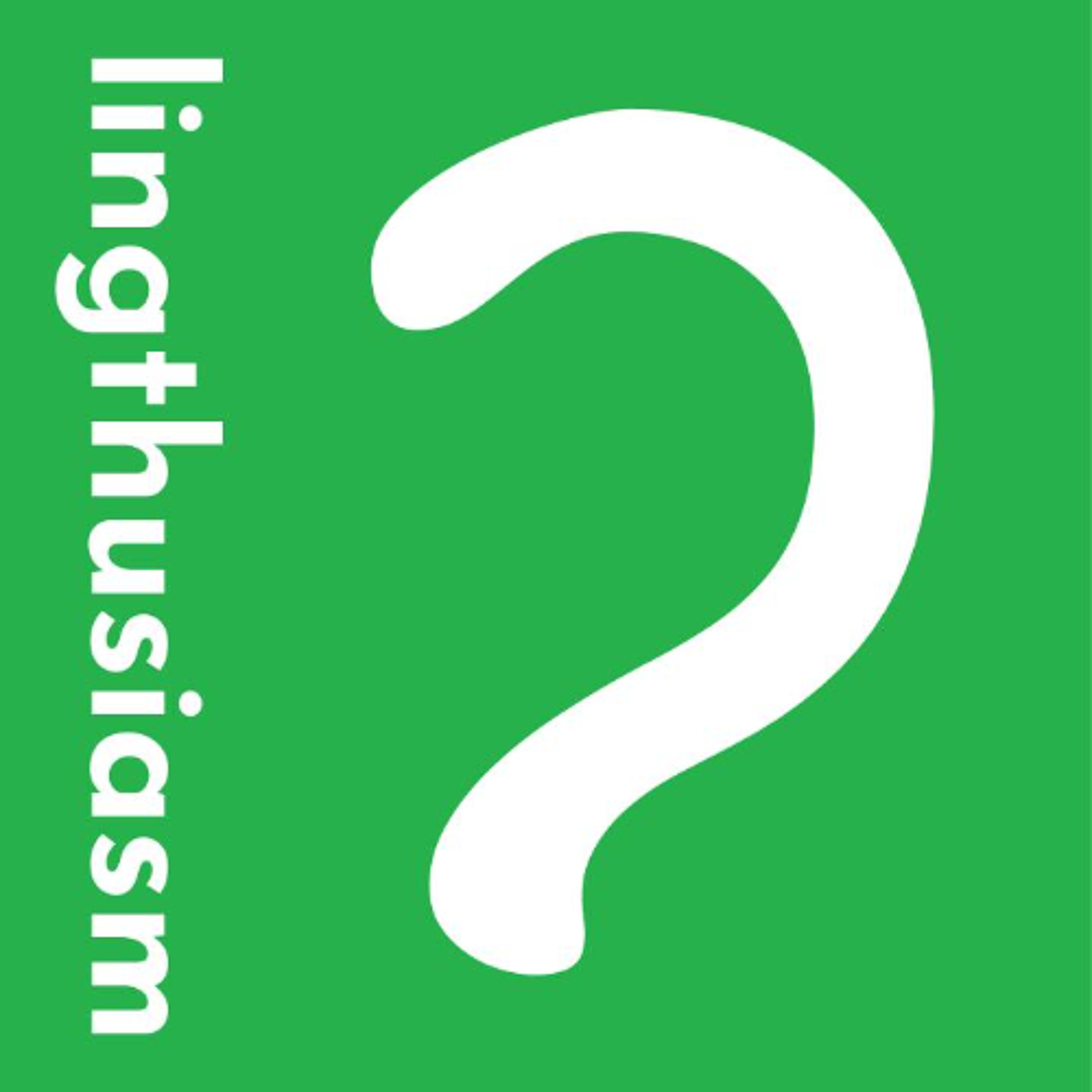 Lingthusiasm - A podcast that's enthusiastic about linguistics103: A hand-y guide to gestureGestures: every known language has them, and there's a growing body of research on how they fit into communication. But academic literature can be hard to dig into on your own. So Lauren has spent the past 5 years diving into the gesture literature and boiling it down into a tight 147 page book.
In this episode, your hosts Lauren Gawne and Gretchen McCulloch get enthusiastic about Lauren's new book, Gesture: A Slim Guide from Oxford University Press. Is it a general audience book? An academic book? A bit of both. (Please enjoy our highlights version in this episode, a slim guide...2025-04-1848 min
Lingthusiasm - A podcast that's enthusiastic about linguistics103: A hand-y guide to gestureGestures: every known language has them, and there's a growing body of research on how they fit into communication. But academic literature can be hard to dig into on your own. So Lauren has spent the past 5 years diving into the gesture literature and boiling it down into a tight 147 page book.
In this episode, your hosts Lauren Gawne and Gretchen McCulloch get enthusiastic about Lauren's new book, Gesture: A Slim Guide from Oxford University Press. Is it a general audience book? An academic book? A bit of both. (Please enjoy our highlights version in this episode, a slim guide...2025-04-1848 min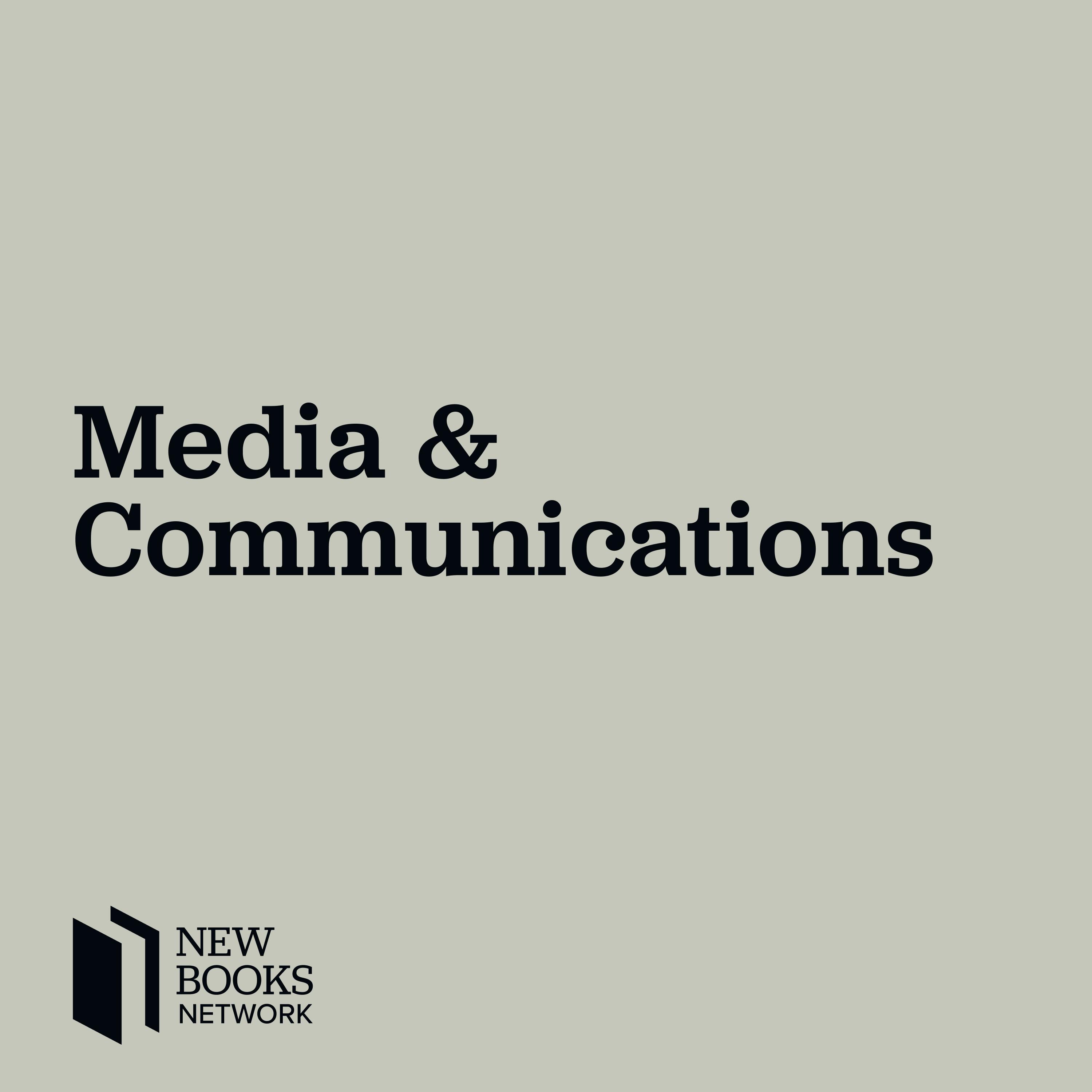 New Books in CommunicationsGestures and Emblems: A Discussion with Lauren GawneBrynn Quick speaks with Dr. Lauren Gawne, about cross-cultural variation in gesture use.In this episode, Brynn and Lauren discuss a paper that Lauren wrote in 2024 with co-author Dr. Kensey Cooperrider entitled “Emblems: Meaning at the interface of language and gesture”. Brynn and Lauren talk all about how emblems are different to gestures, cultural uses of emblems, emoji, and how emblems might be changing in the digital age.Discussions in this episode include references to Lauren’s book Gesture: A Slim Guide (Oxford UP, 2025), the video episode on gesture that Lingthusiasm made and Gretchen McCulloch’s book Because Int...2025-04-1636 min
New Books in CommunicationsGestures and Emblems: A Discussion with Lauren GawneBrynn Quick speaks with Dr. Lauren Gawne, about cross-cultural variation in gesture use.In this episode, Brynn and Lauren discuss a paper that Lauren wrote in 2024 with co-author Dr. Kensey Cooperrider entitled “Emblems: Meaning at the interface of language and gesture”. Brynn and Lauren talk all about how emblems are different to gestures, cultural uses of emblems, emoji, and how emblems might be changing in the digital age.Discussions in this episode include references to Lauren’s book Gesture: A Slim Guide (Oxford UP, 2025), the video episode on gesture that Lingthusiasm made and Gretchen McCulloch’s book Because Int...2025-04-1636 min In Conversation: An OUP PodcastGestures and Emblems: A Discussion with Lauren GawneBrynn Quick speaks with Dr. Lauren Gawne, about cross-cultural variation in gesture use.In this episode, Brynn and Lauren discuss a paper that Lauren wrote in 2024 with co-author Dr. Kensey Cooperrider entitled “Emblems: Meaning at the interface of language and gesture”. Brynn and Lauren talk all about how emblems are different to gestures, cultural uses of emblems, emoji, and how emblems might be changing in the digital age.Discussions in this episode include references to Lauren’s book Gesture: A Slim Guide (Oxford UP, 2025), the video episode on gesture that Lingthusiasm made and Gretchen McCulloch’s book Because Int...2025-04-1336 min
In Conversation: An OUP PodcastGestures and Emblems: A Discussion with Lauren GawneBrynn Quick speaks with Dr. Lauren Gawne, about cross-cultural variation in gesture use.In this episode, Brynn and Lauren discuss a paper that Lauren wrote in 2024 with co-author Dr. Kensey Cooperrider entitled “Emblems: Meaning at the interface of language and gesture”. Brynn and Lauren talk all about how emblems are different to gestures, cultural uses of emblems, emoji, and how emblems might be changing in the digital age.Discussions in this episode include references to Lauren’s book Gesture: A Slim Guide (Oxford UP, 2025), the video episode on gesture that Lingthusiasm made and Gretchen McCulloch’s book Because Int...2025-04-1336 min New Books in LanguageGestures and Emblems: A Discussion with Lauren GawneBrynn Quick speaks with Dr. Lauren Gawne, about cross-cultural variation in gesture use.In this episode, Brynn and Lauren discuss a paper that Lauren wrote in 2024 with co-author Dr. Kensey Cooperrider entitled “Emblems: Meaning at the interface of language and gesture”. Brynn and Lauren talk all about how emblems are different to gestures, cultural uses of emblems, emoji, and how emblems might be changing in the digital age.Discussions in this episode include references to Lauren’s book Gesture: A Slim Guide (Oxford UP, 2025), the video episode on gesture that Lingthusiasm made and Gretchen McCulloch’s book Because Int...2025-04-1336 min
New Books in LanguageGestures and Emblems: A Discussion with Lauren GawneBrynn Quick speaks with Dr. Lauren Gawne, about cross-cultural variation in gesture use.In this episode, Brynn and Lauren discuss a paper that Lauren wrote in 2024 with co-author Dr. Kensey Cooperrider entitled “Emblems: Meaning at the interface of language and gesture”. Brynn and Lauren talk all about how emblems are different to gestures, cultural uses of emblems, emoji, and how emblems might be changing in the digital age.Discussions in this episode include references to Lauren’s book Gesture: A Slim Guide (Oxford UP, 2025), the video episode on gesture that Lingthusiasm made and Gretchen McCulloch’s book Because Int...2025-04-1336 min Language on the MoveGestures and Emblems: A Discussion with Lauren GawneBrynn Quick speaks with Dr. Lauren Gawne, about cross-cultural variation in gesture use.In this episode, Brynn and Lauren discuss a paper that Lauren wrote in 2024 with co-author Dr. Kensey Cooperrider entitled “Emblems: Meaning at the interface of language and gesture”. Brynn and Lauren talk all about how emblems are different to gestures, cultural uses of emblems, emoji, and how emblems might be changing in the digital age.Discussions in this episode include references to Lauren’s book Gesture: A Slim Guide (Oxford UP, 2025), the video episode on gesture that Lingthusiasm made and Gretchen McCulloch’s book Because Int...2025-04-1336 min
Language on the MoveGestures and Emblems: A Discussion with Lauren GawneBrynn Quick speaks with Dr. Lauren Gawne, about cross-cultural variation in gesture use.In this episode, Brynn and Lauren discuss a paper that Lauren wrote in 2024 with co-author Dr. Kensey Cooperrider entitled “Emblems: Meaning at the interface of language and gesture”. Brynn and Lauren talk all about how emblems are different to gestures, cultural uses of emblems, emoji, and how emblems might be changing in the digital age.Discussions in this episode include references to Lauren’s book Gesture: A Slim Guide (Oxford UP, 2025), the video episode on gesture that Lingthusiasm made and Gretchen McCulloch’s book Because Int...2025-04-1336 min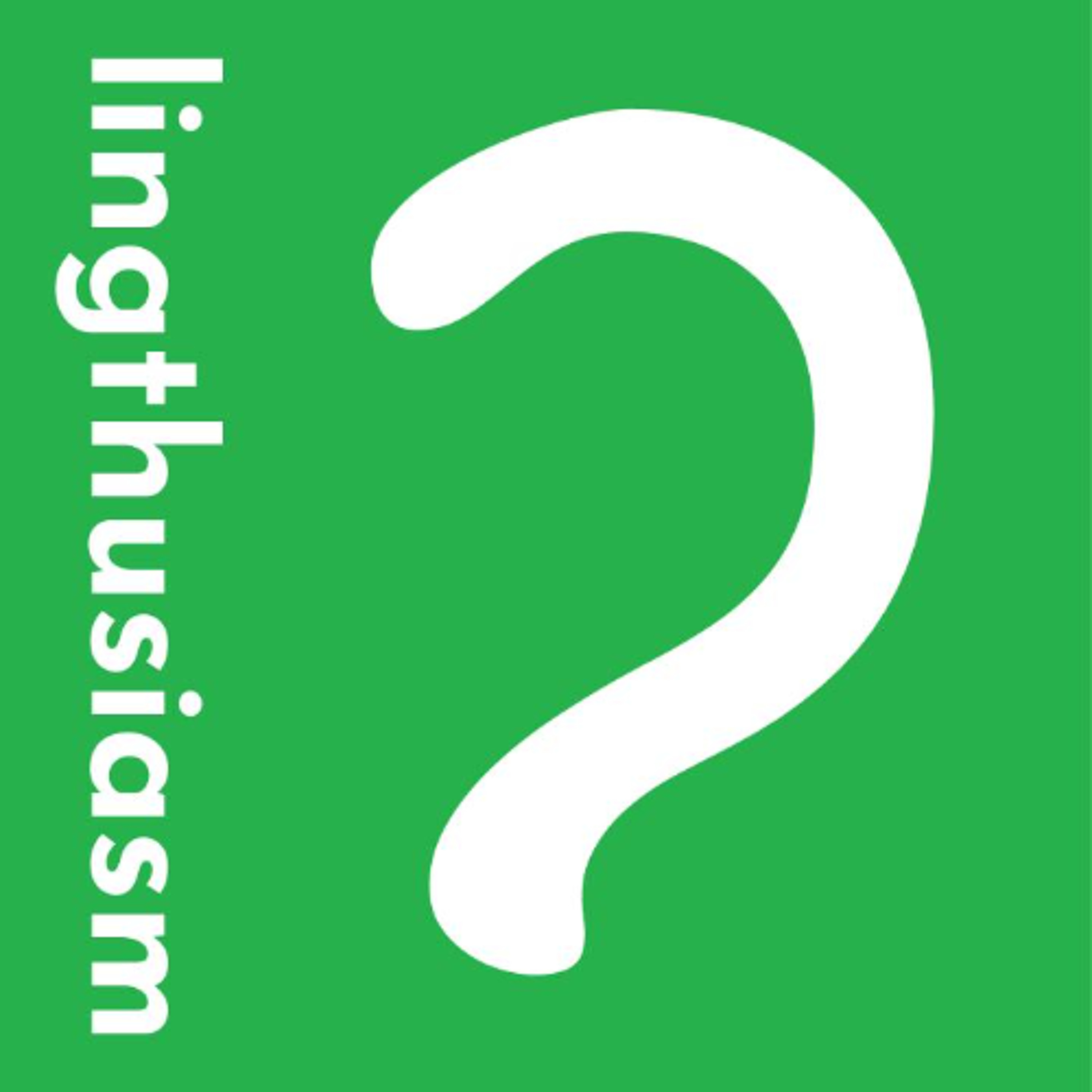 Lingthusiasm - A podcast that's enthusiastic about linguistics102: The science and fiction of Sapir-WhorfIt's a fun science fiction trope: learn a mysterious alien language and acquire superpowers, just like if you'd been zapped by a cosmic ray or bitten by a radioactive spider. But what's the linguistics behind this idea found in books like Babel-17, Embassytown, or the movie Arrival?
In this episode, your hosts Lauren Gawne and Gretchen McCulloch get enthusiastic about the science and fiction of linguistic relativity, popularly known as the Sapir-Whorf hypothesis. We talk about a range of different things that people mean when they refer to this hypothesis: a sciencey-sounding way to introduce obviously fictional concepts like time...2025-03-2151 min
Lingthusiasm - A podcast that's enthusiastic about linguistics102: The science and fiction of Sapir-WhorfIt's a fun science fiction trope: learn a mysterious alien language and acquire superpowers, just like if you'd been zapped by a cosmic ray or bitten by a radioactive spider. But what's the linguistics behind this idea found in books like Babel-17, Embassytown, or the movie Arrival?
In this episode, your hosts Lauren Gawne and Gretchen McCulloch get enthusiastic about the science and fiction of linguistic relativity, popularly known as the Sapir-Whorf hypothesis. We talk about a range of different things that people mean when they refer to this hypothesis: a sciencey-sounding way to introduce obviously fictional concepts like time...2025-03-2151 min Lingthusiasm - A podcast that's enthusiastic about linguistics101: Micro to macro - The levels of languageWhen we first learn about nature, we generally start with the solid mid-sized animals: cats, dogs, elephants, tigers, horses, birds, turtles, and so on. Only later on do we zoom in and out from these charismatic megafauna to the tinier levels, like cells and bacteria, or the larger levels, like ecosystems and the water cycle. With language, words are the easily graspable charismatic megafauna (charismatic megaverba?), from which there are both micro levels (like sounds, handshapes, and morphemes) and macro levels (like sentences, conversations, and narratives).
In this episode, your hosts Lauren Gawne and Gretchen McCulloch take advantage of the...2025-02-2148 min
Lingthusiasm - A podcast that's enthusiastic about linguistics101: Micro to macro - The levels of languageWhen we first learn about nature, we generally start with the solid mid-sized animals: cats, dogs, elephants, tigers, horses, birds, turtles, and so on. Only later on do we zoom in and out from these charismatic megafauna to the tinier levels, like cells and bacteria, or the larger levels, like ecosystems and the water cycle. With language, words are the easily graspable charismatic megafauna (charismatic megaverba?), from which there are both micro levels (like sounds, handshapes, and morphemes) and macro levels (like sentences, conversations, and narratives).
In this episode, your hosts Lauren Gawne and Gretchen McCulloch take advantage of the...2025-02-2148 min Lingthusiasm - A podcast that's enthusiastic about linguistics100: A hundred reasons to be enthusiastic about linguisticsThis is our hundredth episode that's enthusiastic about linguistics! To celebrate, we've put together 100 of our favourite fun facts about linguistics, featuring contributions from previous guests and Lingthusiasm team members, fan favourites that resonated with you from the previous 99 episodes, and new facts that haven't been on the show before but might star in one of the next 100 episodes in greater detail.
In this episode, your hosts Gretchen McCulloch and Lauren Gawne talk about brains, gesture, etymology, famous example sentences, languages by the numbers, a few special facts about the word "hundred" and way more! This episode is both a...2025-01-1741 min
Lingthusiasm - A podcast that's enthusiastic about linguistics100: A hundred reasons to be enthusiastic about linguisticsThis is our hundredth episode that's enthusiastic about linguistics! To celebrate, we've put together 100 of our favourite fun facts about linguistics, featuring contributions from previous guests and Lingthusiasm team members, fan favourites that resonated with you from the previous 99 episodes, and new facts that haven't been on the show before but might star in one of the next 100 episodes in greater detail.
In this episode, your hosts Gretchen McCulloch and Lauren Gawne talk about brains, gesture, etymology, famous example sentences, languages by the numbers, a few special facts about the word "hundred" and way more! This episode is both a...2025-01-1741 min Lingthusiasm - A podcast that's enthusiastic about linguistics99: A politeness episode, if you pleaseIf it wouldn't be too much trouble, if you have a spare half hour, could we possibly suggest that you might enjoy listening to this episode on politeness? Or, if you'd prefer a less polite version, "Listen! Now!"
In this episode, your hosts Gretchen McCulloch and Lauren Gawne get enthusiastic about what politeness and rudeness are made up of at a linguistic level. We talk about existing cultural notions of "saving face" and "losing face", aka the push and pull between our desire for help vs our desire for independence, and how they've been formalized in a classic linguistics paper...2024-12-2056 min
Lingthusiasm - A podcast that's enthusiastic about linguistics99: A politeness episode, if you pleaseIf it wouldn't be too much trouble, if you have a spare half hour, could we possibly suggest that you might enjoy listening to this episode on politeness? Or, if you'd prefer a less polite version, "Listen! Now!"
In this episode, your hosts Gretchen McCulloch and Lauren Gawne get enthusiastic about what politeness and rudeness are made up of at a linguistic level. We talk about existing cultural notions of "saving face" and "losing face", aka the push and pull between our desire for help vs our desire for independence, and how they've been formalized in a classic linguistics paper...2024-12-2056 min A Language I Love Is...Yolmo and Lauren GawneALILI has reached episode 30 and the end of two whole series! To mark the occasion, the show has the privilege to host a star of public linguistics, Dr. Lauren Gawne, one of the two fabulous co-hosts of the hit podcast Lingthusiasm. Lauren is here to lead the show into a new part of the world and a new language family, namely Yolmo, a Tibeto-Burman language spoken in Nepal. Lauren takes us through the modern state of the language, her profound connection to it, and the grammatical phenomenon of evidentiality. Enter the word of Lingthusiasm here: http...2024-12-0142 min
A Language I Love Is...Yolmo and Lauren GawneALILI has reached episode 30 and the end of two whole series! To mark the occasion, the show has the privilege to host a star of public linguistics, Dr. Lauren Gawne, one of the two fabulous co-hosts of the hit podcast Lingthusiasm. Lauren is here to lead the show into a new part of the world and a new language family, namely Yolmo, a Tibeto-Burman language spoken in Nepal. Lauren takes us through the modern state of the language, her profound connection to it, and the grammatical phenomenon of evidentiality. Enter the word of Lingthusiasm here: http...2024-12-0142 min Lingthusiasm - A podcast that's enthusiastic about linguistics98: Helping computers decode sentences - Interview with Emily M. BenderWhen a human learns a new word, we're learning to attach that word to a set of concepts in the real world. When a computer "learns" a new word, it is creating some associations between that word and other words it has seen before, which can sometimes give it the appearance of understanding, but it doesn't have that real-world grounding, which can sometimes lead to spectacular failures: hilariously implausible from a human perspective, just as plausible from the computer's.
In this episode, your host Lauren Gawne gets enthusiastic about how computers process language with Dr. Emily M. Bender, who is...2024-11-2256 min
Lingthusiasm - A podcast that's enthusiastic about linguistics98: Helping computers decode sentences - Interview with Emily M. BenderWhen a human learns a new word, we're learning to attach that word to a set of concepts in the real world. When a computer "learns" a new word, it is creating some associations between that word and other words it has seen before, which can sometimes give it the appearance of understanding, but it doesn't have that real-world grounding, which can sometimes lead to spectacular failures: hilariously implausible from a human perspective, just as plausible from the computer's.
In this episode, your host Lauren Gawne gets enthusiastic about how computers process language with Dr. Emily M. Bender, who is...2024-11-2256 min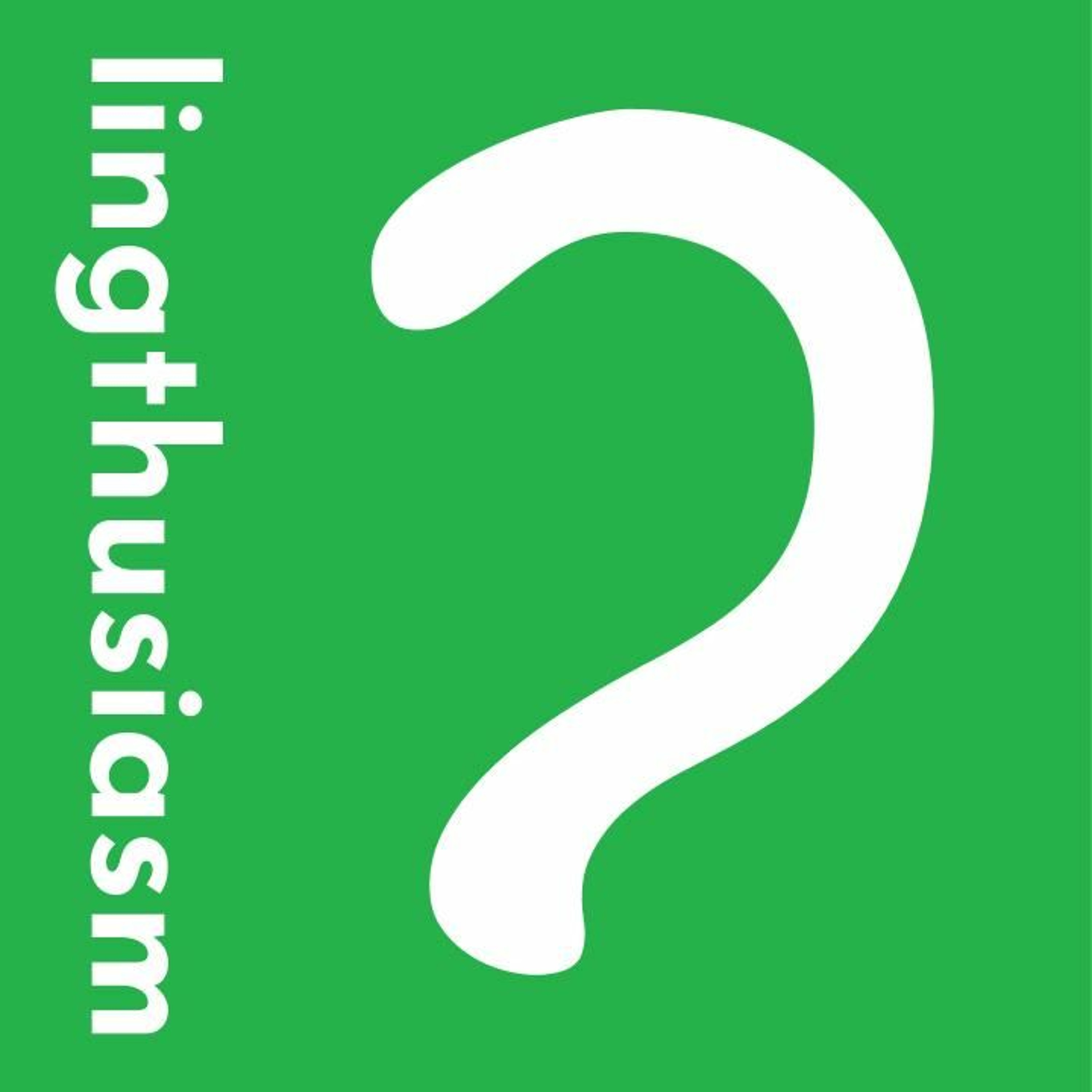 Lingthusiasm - A podcast that's enthusiastic about linguistics97: OooOooh~~ our possession episode oOooOOoohh 👻Eye of newt and toe of frog,
Wool of bat and tongue of dog...
In this episode, your hosts Gretchen McCulloch and Lauren Gawne get enthusiastic and ~spooky~ about possession! We talk about how the haunting type of possession and the linguistic type of possession do share an etymological origin, but how the term "possession" itself is misleading, because possessive constructions are used to express all sorts of relationships between nouns, including part-whole (eye of newt), material (a cauldron of silver), interpersonal (the wizard's apprentice), and general association (the school of magic). We also talk about the three big ways...2024-10-1844 min
Lingthusiasm - A podcast that's enthusiastic about linguistics97: OooOooh~~ our possession episode oOooOOoohh 👻Eye of newt and toe of frog,
Wool of bat and tongue of dog...
In this episode, your hosts Gretchen McCulloch and Lauren Gawne get enthusiastic and ~spooky~ about possession! We talk about how the haunting type of possession and the linguistic type of possession do share an etymological origin, but how the term "possession" itself is misleading, because possessive constructions are used to express all sorts of relationships between nouns, including part-whole (eye of newt), material (a cauldron of silver), interpersonal (the wizard's apprentice), and general association (the school of magic). We also talk about the three big ways...2024-10-1844 min Lingthusiasm - A podcast that's enthusiastic about linguistics96: Welcome back aboard the metaphor train!We're taking you on a journey to new linguistic destinations, so come along for the ride and don't forget to hold on!
In this episode, your hosts Lauren Gawne and Gretchen McCulloch get enthusiastic about metaphors! It's easy to think of literary comparisons like "my love is like a red, red rose" but metaphors are also far more common and almost unnoticed in regular conversation as well. For example, English speakers often talk about ideas as a journey (the metaphor train) or as if they're visual - clear or murky or heavy or maybe fuzzy, but not as fluffy or...2024-09-2035 min
Lingthusiasm - A podcast that's enthusiastic about linguistics96: Welcome back aboard the metaphor train!We're taking you on a journey to new linguistic destinations, so come along for the ride and don't forget to hold on!
In this episode, your hosts Lauren Gawne and Gretchen McCulloch get enthusiastic about metaphors! It's easy to think of literary comparisons like "my love is like a red, red rose" but metaphors are also far more common and almost unnoticed in regular conversation as well. For example, English speakers often talk about ideas as a journey (the metaphor train) or as if they're visual - clear or murky or heavy or maybe fuzzy, but not as fluffy or...2024-09-2035 min Lingthusiasm - A podcast that's enthusiastic about linguistics95: Lo! An undetached collection of meaning-parts!Imagine you're in a field with someone whose language you don't speak. A rabbit scurries by. The other person says "Gavagai!" You probably assumed they meant "rabbit" but they could have meant something else, like "scurrying" or even "lo! an undetached rabbit-part!"
In this episode, your hosts Lauren Gawne and Gretchen McCulloch get enthusiastic about how we manage to understand each other when we're learning new words, inspired by the famous "Gavagai" thought experiment from the philosopher of language VWO Quine. We talk about how children have a whole object assumption when learning language, and how linguists go about learning...2024-08-1643 min
Lingthusiasm - A podcast that's enthusiastic about linguistics95: Lo! An undetached collection of meaning-parts!Imagine you're in a field with someone whose language you don't speak. A rabbit scurries by. The other person says "Gavagai!" You probably assumed they meant "rabbit" but they could have meant something else, like "scurrying" or even "lo! an undetached rabbit-part!"
In this episode, your hosts Lauren Gawne and Gretchen McCulloch get enthusiastic about how we manage to understand each other when we're learning new words, inspired by the famous "Gavagai" thought experiment from the philosopher of language VWO Quine. We talk about how children have a whole object assumption when learning language, and how linguists go about learning...2024-08-1643 min Lingthusiasm - A podcast that's enthusiastic about linguistics94: The perfectly imperfect aspect episodeWhen we're talking about an activity -- say, throwing teacups in a lake -- we often want to know not just when the action takes place, but also what shape that action looks like. Is this a one-time teacup throwing event (I threw the teacup in the lake) or a repeated or ongoing situation (I was throwing the teacup in the lake)? Both of these actions might have happened at the same time (they're both in the past tense), but this different in shape between them is known as aspect.
In this episode, your hosts Gretchen McCulloch and Lauren Gawne...2024-07-1939 min
Lingthusiasm - A podcast that's enthusiastic about linguistics94: The perfectly imperfect aspect episodeWhen we're talking about an activity -- say, throwing teacups in a lake -- we often want to know not just when the action takes place, but also what shape that action looks like. Is this a one-time teacup throwing event (I threw the teacup in the lake) or a repeated or ongoing situation (I was throwing the teacup in the lake)? Both of these actions might have happened at the same time (they're both in the past tense), but this different in shape between them is known as aspect.
In this episode, your hosts Gretchen McCulloch and Lauren Gawne...2024-07-1939 min Lingthusiasm - A podcast that's enthusiastic about linguistics92: Brunch, gonna, and fozzle - The smooshing episodeSometimes two words are smooshed together in a single act of creativity to fill a lexical gap, like making "brunch" from breakfast+lunch. Other times, words are smooshed together gradually, over a long period of speakers or signers discovering more efficient ways to position their mouth or hands, such as pronouncing "handbag" being pronounced more like "hambag".
In this episode, your hosts Gretchen McCulloch and Lauren Gawne get enthusiastic about smooshing words together. We talk about the history of portmanteau words like motel and chortle, the poem Jabberwocky, and why some portmanteaus, like Kenergy from Ken + energy, sound really satisfying...2024-05-1749 min
Lingthusiasm - A podcast that's enthusiastic about linguistics92: Brunch, gonna, and fozzle - The smooshing episodeSometimes two words are smooshed together in a single act of creativity to fill a lexical gap, like making "brunch" from breakfast+lunch. Other times, words are smooshed together gradually, over a long period of speakers or signers discovering more efficient ways to position their mouth or hands, such as pronouncing "handbag" being pronounced more like "hambag".
In this episode, your hosts Gretchen McCulloch and Lauren Gawne get enthusiastic about smooshing words together. We talk about the history of portmanteau words like motel and chortle, the poem Jabberwocky, and why some portmanteaus, like Kenergy from Ken + energy, sound really satisfying...2024-05-1749 min Lingthusiasm - A podcast that's enthusiastic about linguistics91: Scoping out the scope of scopeWhen you order a kebab and they ask you if you want everything on it, you might say yes. But you'd probably still be surprised if it came with say, chocolate, let alone a bicycle...even though chocolate and bicycles are technically part of "everything". That's because words like "everything" and "all" really mean something more like "everything typical in this situation". Or in linguistic terms, we say that their scope is ambiguous without context.
In this episode, your hosts Lauren Gawne and Gretchen McCulloch get enthusiastic about how we can think about ambiguity of meaning in terms of scope...2024-04-1930 min
Lingthusiasm - A podcast that's enthusiastic about linguistics91: Scoping out the scope of scopeWhen you order a kebab and they ask you if you want everything on it, you might say yes. But you'd probably still be surprised if it came with say, chocolate, let alone a bicycle...even though chocolate and bicycles are technically part of "everything". That's because words like "everything" and "all" really mean something more like "everything typical in this situation". Or in linguistic terms, we say that their scope is ambiguous without context.
In this episode, your hosts Lauren Gawne and Gretchen McCulloch get enthusiastic about how we can think about ambiguity of meaning in terms of scope...2024-04-1930 min Lingthusiasm - A podcast that's enthusiastic about linguistics90: What visualizing our vowels tells us about who we areOn Lingthusiasm, we've sometimes compared the human vocal tract to a giant meat clarinet, like the vocal folds are the reed and the rest of the throat and mouth is the body of the instrument that shapes the sound in various ways. However, when it comes to talking more precisely about vowels, we need an instrument with a greater degree of flexibility, one that can produce several sounds at the same time which combine into what we perceive as a vowel. Behold, our latest, greatest metaphor (we're so sorry)... the meat bagpipe!
In this episode, your hosts Gretchen McCulloch and...2024-03-2247 min
Lingthusiasm - A podcast that's enthusiastic about linguistics90: What visualizing our vowels tells us about who we areOn Lingthusiasm, we've sometimes compared the human vocal tract to a giant meat clarinet, like the vocal folds are the reed and the rest of the throat and mouth is the body of the instrument that shapes the sound in various ways. However, when it comes to talking more precisely about vowels, we need an instrument with a greater degree of flexibility, one that can produce several sounds at the same time which combine into what we perceive as a vowel. Behold, our latest, greatest metaphor (we're so sorry)... the meat bagpipe!
In this episode, your hosts Gretchen McCulloch and...2024-03-2247 min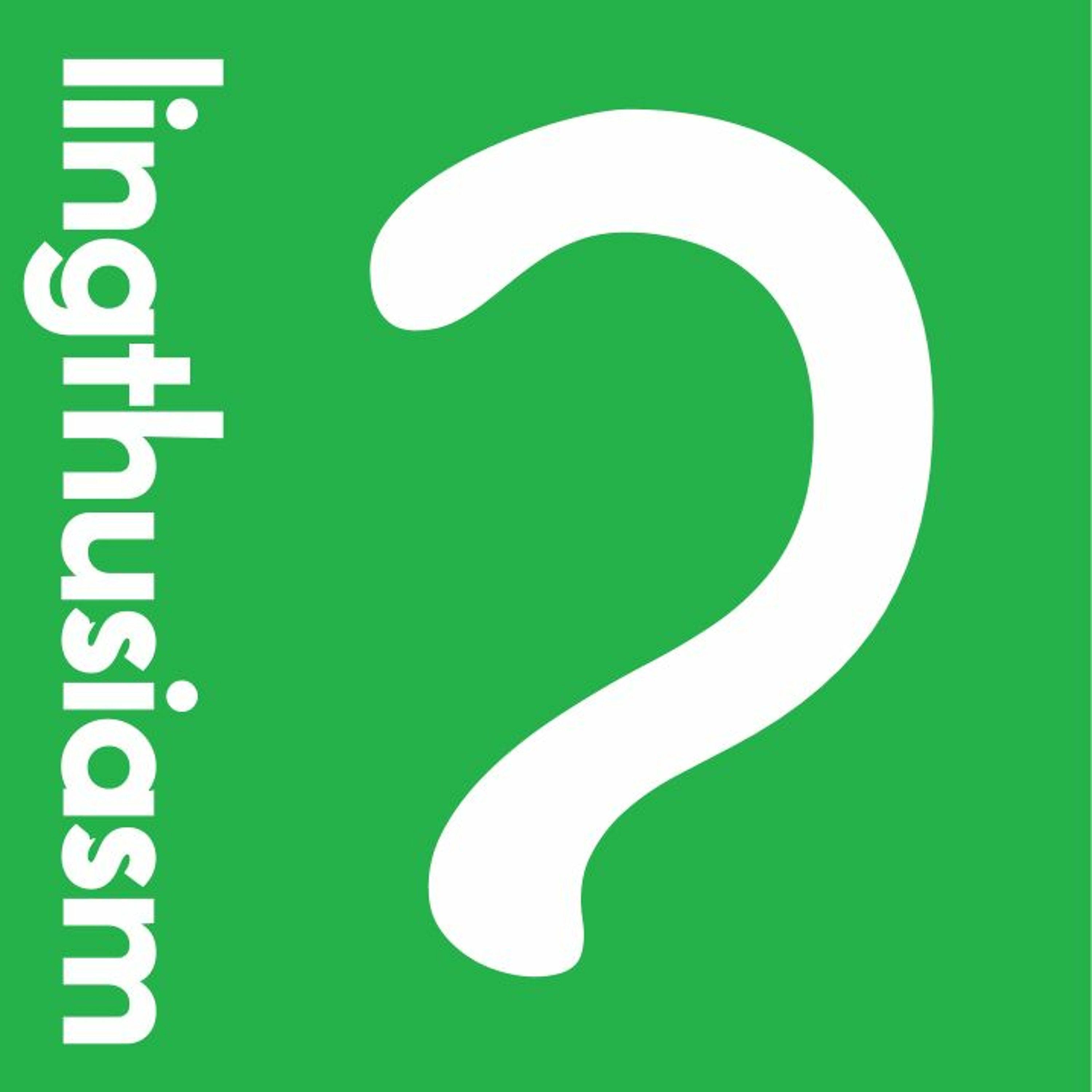 Lingthusiasm - A podcast that's enthusiastic about linguistics89: Connecting with oral cultureFor tens of thousands of years, humans have transmitted long and intricate stories to each other, which we learned directly from witnessing other people telling them. Many of these collaboratively composed stories were among the earliest things written down when a culture encountered writing, such as the Iliad and the Odyssey, the Mwindo Epic, and Beowulf.
In this episode, your hosts Gretchen McCulloch and Lauren Gawne get enthusiastic about how writing things down changes how we feel about them. We talk about a Ted Chiang short story comparing the spread of literacy to the spread of video recording, how oral...2024-02-1655 min
Lingthusiasm - A podcast that's enthusiastic about linguistics89: Connecting with oral cultureFor tens of thousands of years, humans have transmitted long and intricate stories to each other, which we learned directly from witnessing other people telling them. Many of these collaboratively composed stories were among the earliest things written down when a culture encountered writing, such as the Iliad and the Odyssey, the Mwindo Epic, and Beowulf.
In this episode, your hosts Gretchen McCulloch and Lauren Gawne get enthusiastic about how writing things down changes how we feel about them. We talk about a Ted Chiang short story comparing the spread of literacy to the spread of video recording, how oral...2024-02-1655 min Lingthusiasm - A podcast that's enthusiastic about linguistics88: No such thing as the oldest languageIt's easy to find claims that certain languages are old or even the oldest, but which one is actually true? Fortunately, there's an easy (though unsatisfying) answer: none of them! Like how humans are all descended from other humans, even though some of us may have longer or shorter family trees found in written records, all human languages are shaped by contact with other languages. We don't even know whether the oldest language(s) was/were spoken or signed, or even whether there was a singular common ancestor language or several.
In this episode, your hosts Gretchen McCulloch and Lauren...2024-01-1941 min
Lingthusiasm - A podcast that's enthusiastic about linguistics88: No such thing as the oldest languageIt's easy to find claims that certain languages are old or even the oldest, but which one is actually true? Fortunately, there's an easy (though unsatisfying) answer: none of them! Like how humans are all descended from other humans, even though some of us may have longer or shorter family trees found in written records, all human languages are shaped by contact with other languages. We don't even know whether the oldest language(s) was/were spoken or signed, or even whether there was a singular common ancestor language or several.
In this episode, your hosts Gretchen McCulloch and Lauren...2024-01-1941 min Lingthusiasm - A podcast that's enthusiastic about linguistics87: If I were an irrealis episodeLanguage lets us talk about things that aren't, strictly speaking, entirely real. Sometimes that's an imaginative object (is a toy sword a real sword? how about Excalibur?). Other times, it's a hypothetical situation (such as "if it rains, we'll cancel the picnic" - but neither the picnic nor the rain have happened yet. And they might never happen. But also they might!). Languages have lots of different ways of talking about different kinds of speculative events, and together they're called the irrealis.
In this episode, your hosts Gretchen McCulloch and Lauren Gawne get enthusiastic about some of our favourite examples...2023-12-2234 min
Lingthusiasm - A podcast that's enthusiastic about linguistics87: If I were an irrealis episodeLanguage lets us talk about things that aren't, strictly speaking, entirely real. Sometimes that's an imaginative object (is a toy sword a real sword? how about Excalibur?). Other times, it's a hypothetical situation (such as "if it rains, we'll cancel the picnic" - but neither the picnic nor the rain have happened yet. And they might never happen. But also they might!). Languages have lots of different ways of talking about different kinds of speculative events, and together they're called the irrealis.
In this episode, your hosts Gretchen McCulloch and Lauren Gawne get enthusiastic about some of our favourite examples...2023-12-2234 min Lingthusiasm - A podcast that's enthusiastic about linguistics85: Ergativity delights usWhen you have a sentence like "I visit them", the word order and the shape of the words tell you that it means something different from "they visit me". However, in a sentence like "I laugh", you don't actually need those signals -- since there's only one person in the sentence, the meaning would be just as clear if the sentence read "Me laugh" or "Laugh me". And indeed, there are languages that do just this, where the single entity with an intransitive verb like "laugh" patterns with the object (me) rather than the subject (I) of a transitive verb...2023-10-2046 min
Lingthusiasm - A podcast that's enthusiastic about linguistics85: Ergativity delights usWhen you have a sentence like "I visit them", the word order and the shape of the words tell you that it means something different from "they visit me". However, in a sentence like "I laugh", you don't actually need those signals -- since there's only one person in the sentence, the meaning would be just as clear if the sentence read "Me laugh" or "Laugh me". And indeed, there are languages that do just this, where the single entity with an intransitive verb like "laugh" patterns with the object (me) rather than the subject (I) of a transitive verb...2023-10-2046 min Lingthusiasm - A podcast that's enthusiastic about linguistics84: Look, it's deixis, an episode about pointing!Pointing creates an invisible line between a part of your body and the thing you're pointing at. Humans are really good at producing and understanding pointing, and it seems to be something that helps babies learn to talk, but only a few animals manage it: domestic dogs can follow a point but wolves can't. (Cats? Look, who knows.) There are lots of ways of pointing, and their relative prominence varies across cultures: you can point to something with a finger or two, with your whole hand, with your elbow, your head, your eyes and eyebrows, your lips, and even your...2023-09-2238 min
Lingthusiasm - A podcast that's enthusiastic about linguistics84: Look, it's deixis, an episode about pointing!Pointing creates an invisible line between a part of your body and the thing you're pointing at. Humans are really good at producing and understanding pointing, and it seems to be something that helps babies learn to talk, but only a few animals manage it: domestic dogs can follow a point but wolves can't. (Cats? Look, who knows.) There are lots of ways of pointing, and their relative prominence varies across cultures: you can point to something with a finger or two, with your whole hand, with your elbow, your head, your eyes and eyebrows, your lips, and even your...2023-09-2238 min Lingthusiasm - A podcast that's enthusiastic about linguistics82: Frogs, pears, and more staples from linguistics example sentencesLinguists are often interested in comparing several languages or dialects. To make this easier, it’s useful to have data that’s relatively similar across varieties, so that the differences really pop out. But what exactly needs to be similar or different varies depending on what we’re investigating. For example, to compare varieties of English, we might have everyone read the same passage that contains all of the sounds of English, whereas to compare the way people gesture when telling a story, we might have them all watch the same silent film and re-tell it back.
In this episode, your h...2023-07-2143 min
Lingthusiasm - A podcast that's enthusiastic about linguistics82: Frogs, pears, and more staples from linguistics example sentencesLinguists are often interested in comparing several languages or dialects. To make this easier, it’s useful to have data that’s relatively similar across varieties, so that the differences really pop out. But what exactly needs to be similar or different varies depending on what we’re investigating. For example, to compare varieties of English, we might have everyone read the same passage that contains all of the sounds of English, whereas to compare the way people gesture when telling a story, we might have them all watch the same silent film and re-tell it back.
In this episode, your h...2023-07-2143 min Lingthusiasm - A podcast that's enthusiastic about linguistics81: The verbs had been being helped by auxiliariesIn the sentence “the horse has eaten an apple”, what is the word “has” doing? It’s not expressing ownership of something, like in “the horse has an apple”. (After all, the horse could have very sneakily eaten the apple.) Rather, it’s helping out the main verb, eat. Many languages use some of their verbs to help other verbs express grammatical information, and the technical name for these helping verbs is auxiliary verbs.
In this episode, your hosts Lauren Gawne and Gretchen McCulloch get enthusiastic about auxiliaries! We talk about what we can learn about auxiliaries across 2000+ languages using a new linguistic...2023-06-1637 min
Lingthusiasm - A podcast that's enthusiastic about linguistics81: The verbs had been being helped by auxiliariesIn the sentence “the horse has eaten an apple”, what is the word “has” doing? It’s not expressing ownership of something, like in “the horse has an apple”. (After all, the horse could have very sneakily eaten the apple.) Rather, it’s helping out the main verb, eat. Many languages use some of their verbs to help other verbs express grammatical information, and the technical name for these helping verbs is auxiliary verbs.
In this episode, your hosts Lauren Gawne and Gretchen McCulloch get enthusiastic about auxiliaries! We talk about what we can learn about auxiliaries across 2000+ languages using a new linguistic...2023-06-1637 min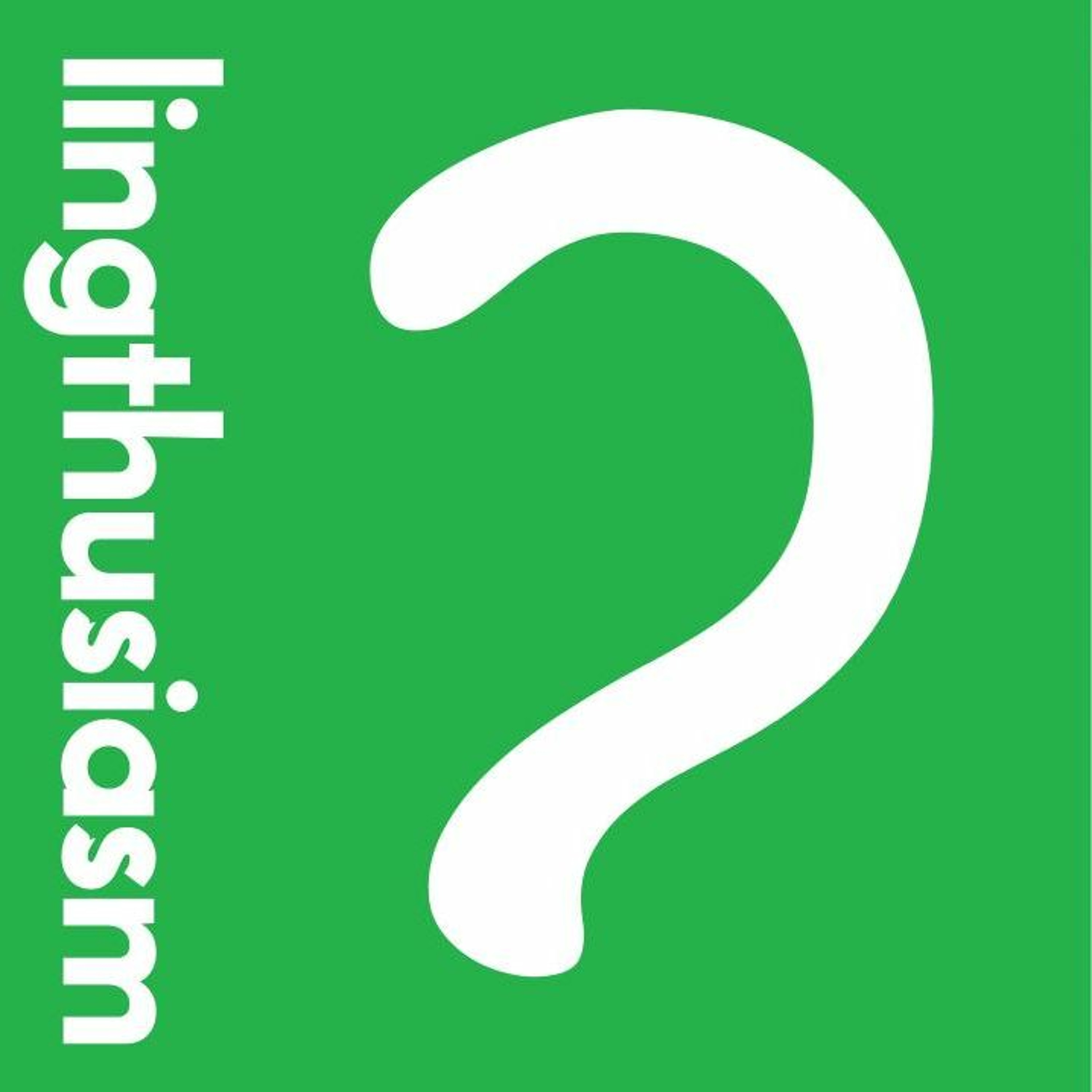 Lingthusiasm - A podcast that's enthusiastic about linguistics80: Word MagicThe magical kind of spell and the written kind of spell are historically linked. This reflects how saying a word can change the state of the world, both in terms of fictional magic spells that set things on fire or make them invisible, and in terms of the real-world linguistic concept of performative utterances, which let us agree to contracts, place bets, establish names, and otherwise alter the fabric of our relationships.
In this episode, your hosts Gretchen McCulloch and Lauren Gawne get enthusiastic about word magic! We talk about how the word magic systems are set up differently in...2023-05-1937 min
Lingthusiasm - A podcast that's enthusiastic about linguistics80: Word MagicThe magical kind of spell and the written kind of spell are historically linked. This reflects how saying a word can change the state of the world, both in terms of fictional magic spells that set things on fire or make them invisible, and in terms of the real-world linguistic concept of performative utterances, which let us agree to contracts, place bets, establish names, and otherwise alter the fabric of our relationships.
In this episode, your hosts Gretchen McCulloch and Lauren Gawne get enthusiastic about word magic! We talk about how the word magic systems are set up differently in...2023-05-1937 min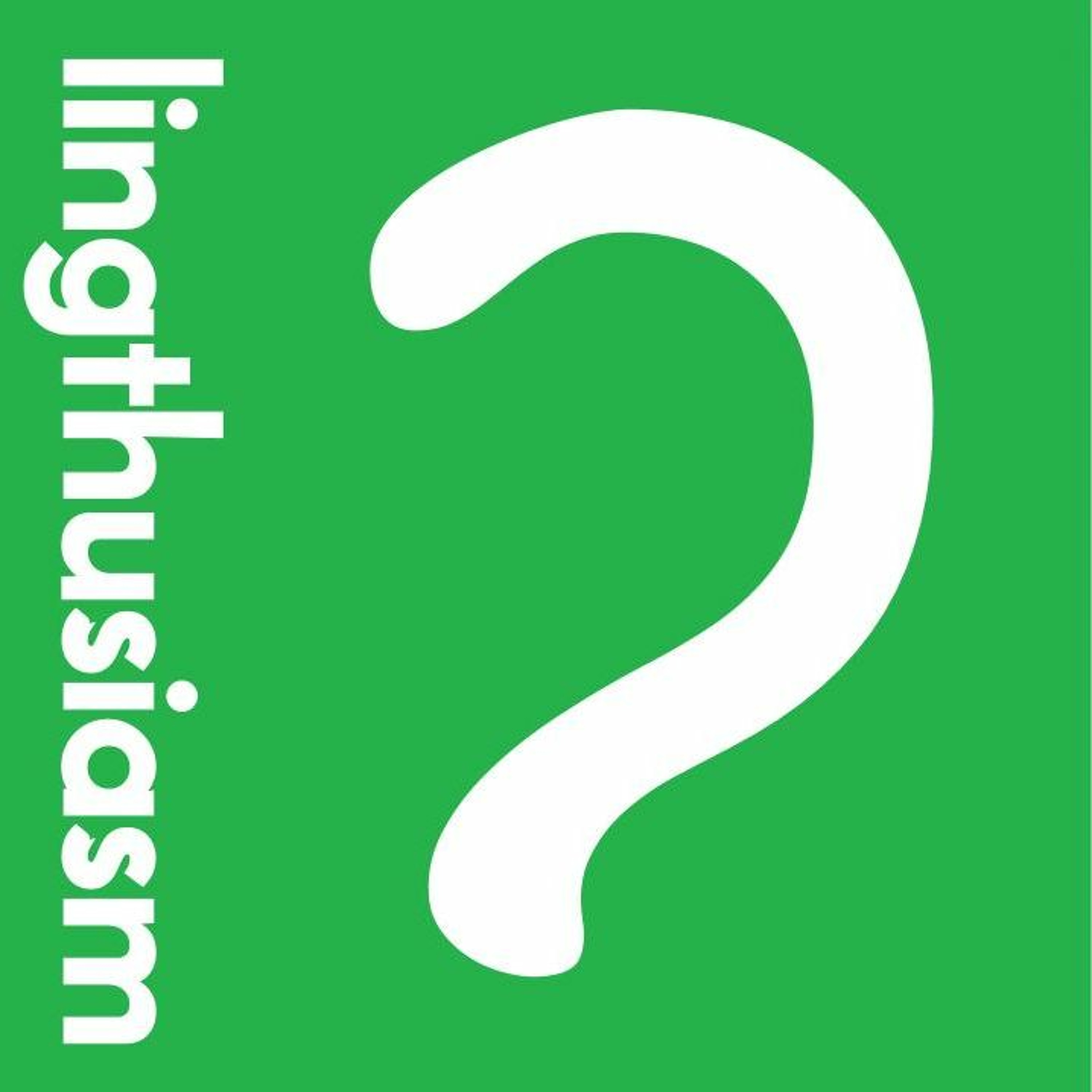 Lingthusiasm - A podcast that's enthusiastic about linguistics79: Tone and Intonation? Tone and Intonation!Spoken languages can change the pitch or melody of words to convey several different kinds of information. When the pitch affects the meaning of the whole phrase, such as rising to indicate a question in English, linguists call it intonation. When the pitch affects the meaning of an individual word, such as the difference between mother (high mā) and horse (low rising mǎ) in Mandarin, linguists call it tone.
In this episode, your hosts Gretchen McCulloch and Lauren Gawne get enthusiastic about tone, intonation, and the combination of the two. We talk about various meanings of intonation, such as question, li...2023-04-2140 min
Lingthusiasm - A podcast that's enthusiastic about linguistics79: Tone and Intonation? Tone and Intonation!Spoken languages can change the pitch or melody of words to convey several different kinds of information. When the pitch affects the meaning of the whole phrase, such as rising to indicate a question in English, linguists call it intonation. When the pitch affects the meaning of an individual word, such as the difference between mother (high mā) and horse (low rising mǎ) in Mandarin, linguists call it tone.
In this episode, your hosts Gretchen McCulloch and Lauren Gawne get enthusiastic about tone, intonation, and the combination of the two. We talk about various meanings of intonation, such as question, li...2023-04-2140 min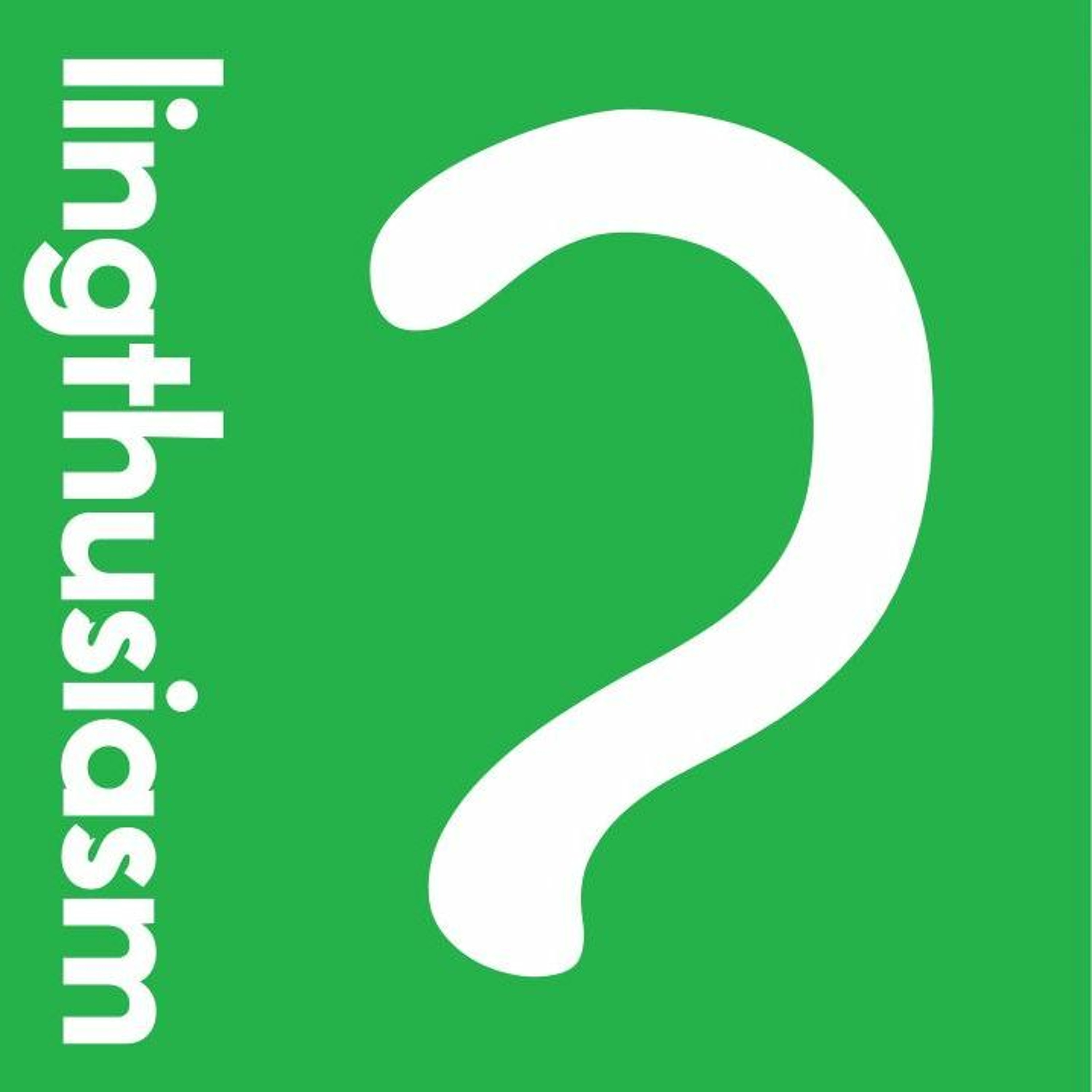 Lingthusiasm - A podcast that's enthusiastic about linguistics76: Where language names come from and why they changeLanguage names come from many sources. Sometimes they’re related to a geographical feature or name of a group of people. Sometimes they’re related to the word for “talk” or “language” in the language itself; other times the name that outsiders call the language is completely different from the insider name. Sometimes they come from mistakes: a name that got mis-applied or even a pejorative description from a neighbouring group.
In this episode, your hosts Gretchen McCulloch and Lauren Gawne get enthusiastic about how languages are named! We talk about how naming a language makes it more legible to broader organiza...2023-01-2037 min
Lingthusiasm - A podcast that's enthusiastic about linguistics76: Where language names come from and why they changeLanguage names come from many sources. Sometimes they’re related to a geographical feature or name of a group of people. Sometimes they’re related to the word for “talk” or “language” in the language itself; other times the name that outsiders call the language is completely different from the insider name. Sometimes they come from mistakes: a name that got mis-applied or even a pejorative description from a neighbouring group.
In this episode, your hosts Gretchen McCulloch and Lauren Gawne get enthusiastic about how languages are named! We talk about how naming a language makes it more legible to broader organiza...2023-01-2037 min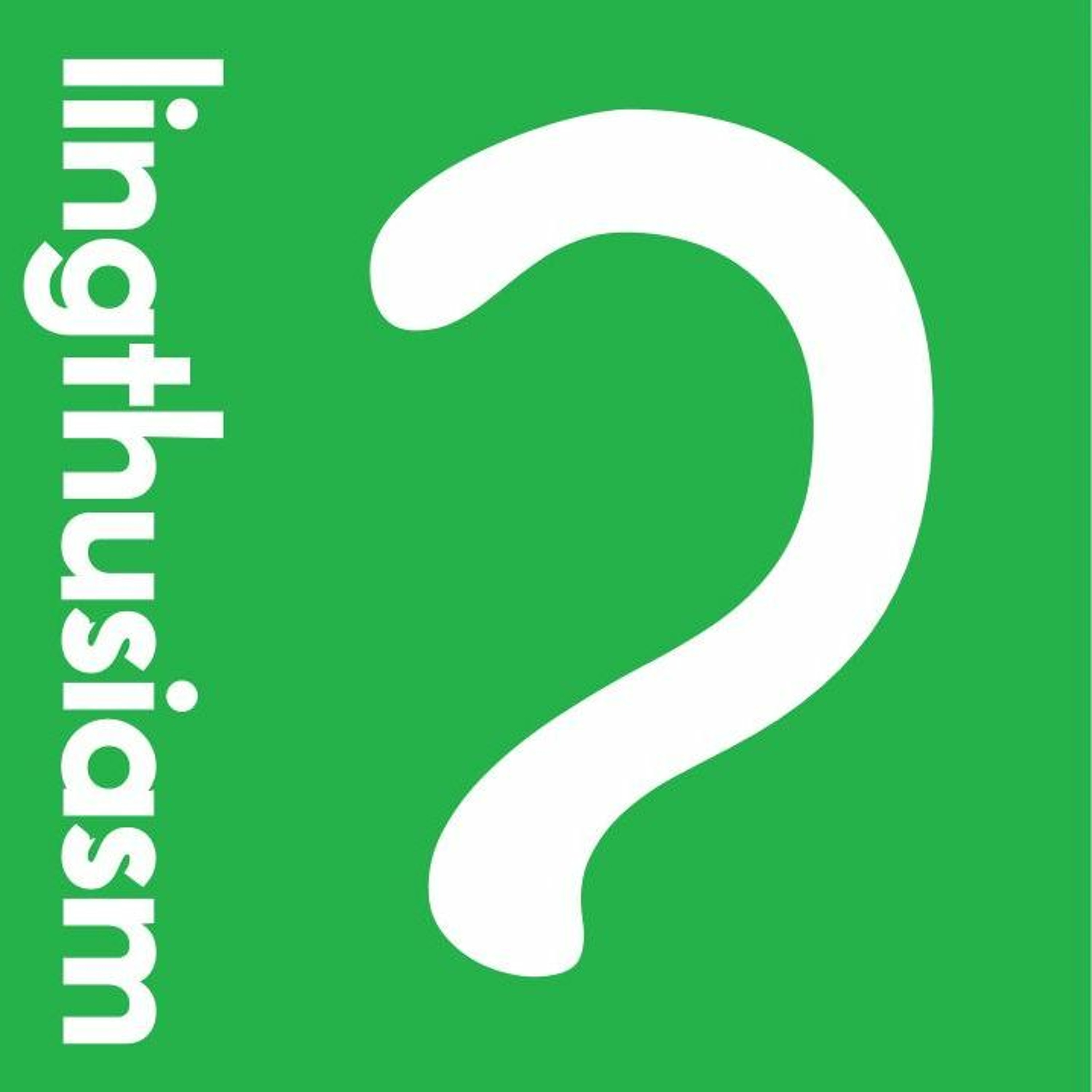 Lingthusiasm - A podcast that's enthusiastic about linguistics75: Love and fury at the linguistics of emotionsEmotions are a universal part of the human experience, but the specific ways we express them are mediated through language. For example, English uses the one word “love” for several distinct feelings: familial love, romantic love, platonic love, and loving things (I love this ice cream!), whereas Spanish distinguishes lexically between the less intense querer and the stronger amar. Conversely, many Austronesian languages use the same word for the concepts that English would split as “fear” and “surprise”, while many Nakh-Daghestani (Northeast Caucasian) languages use the same word for the cluster that English splits into “fear”, “anxiety”, and “grief”.
In this episode, your hosts Gretche...2022-12-1527 min
Lingthusiasm - A podcast that's enthusiastic about linguistics75: Love and fury at the linguistics of emotionsEmotions are a universal part of the human experience, but the specific ways we express them are mediated through language. For example, English uses the one word “love” for several distinct feelings: familial love, romantic love, platonic love, and loving things (I love this ice cream!), whereas Spanish distinguishes lexically between the less intense querer and the stronger amar. Conversely, many Austronesian languages use the same word for the concepts that English would split as “fear” and “surprise”, while many Nakh-Daghestani (Northeast Caucasian) languages use the same word for the cluster that English splits into “fear”, “anxiety”, and “grief”.
In this episode, your hosts Gretche...2022-12-1527 min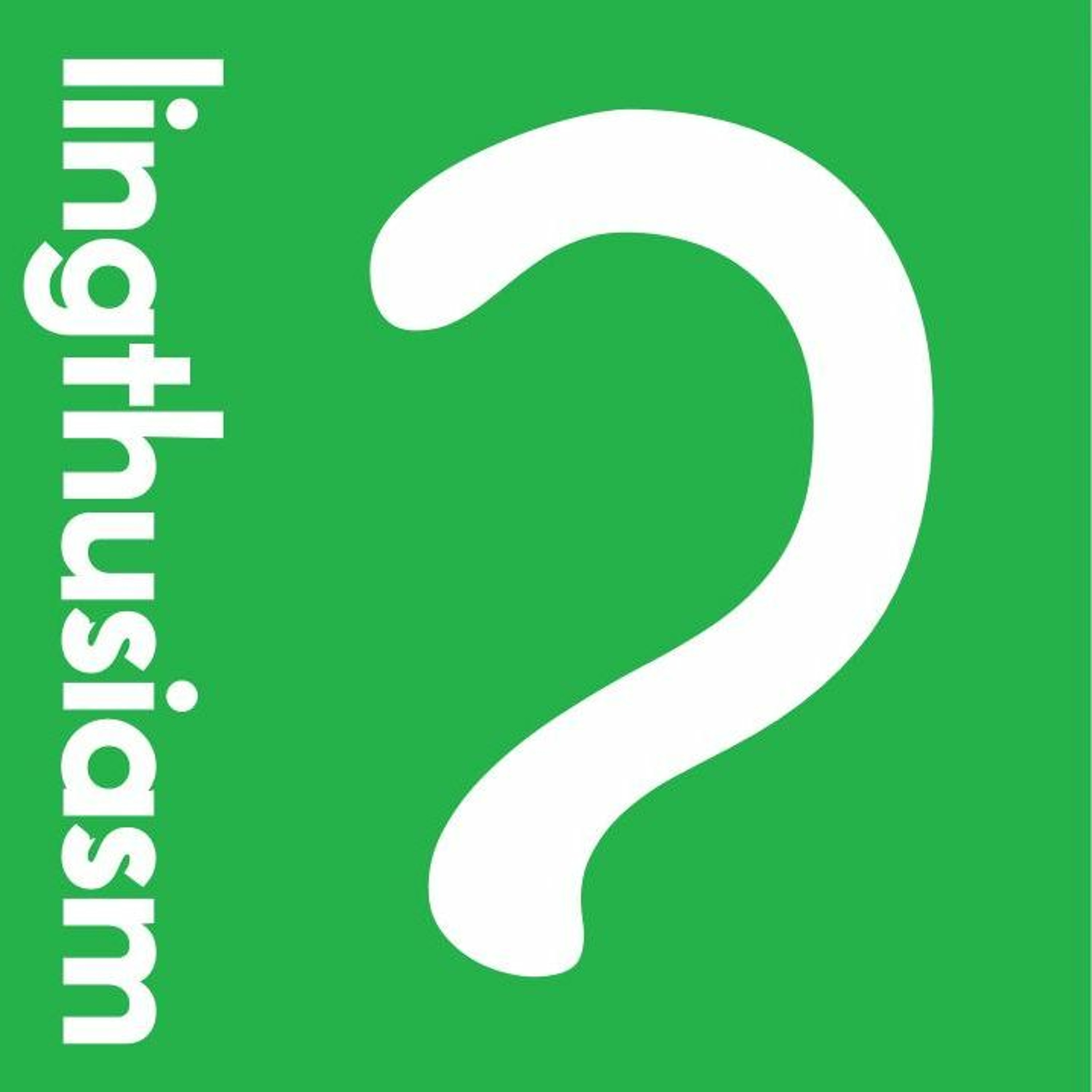 Lingthusiasm - A podcast that's enthusiastic about linguistics74: Who questions the questions?We use questions to ask people for information (who’s there?), but we can also use them to make a polite request (could you pass me that?), to confirm social understanding (what a game, eh), and for stylistic effect, such as ironic or rhetorical questions (who knows!).
In this episode, your hosts Lauren Gawne and Gretchen McCulloch get enthusiastic about questions! We talk about question intonations from the classic rising pitch? to the British downstep (not a dance move...yet), and their written correlates, such as omitting a question mark in order to show that a question is rhetorical or int...2022-11-1837 min
Lingthusiasm - A podcast that's enthusiastic about linguistics74: Who questions the questions?We use questions to ask people for information (who’s there?), but we can also use them to make a polite request (could you pass me that?), to confirm social understanding (what a game, eh), and for stylistic effect, such as ironic or rhetorical questions (who knows!).
In this episode, your hosts Lauren Gawne and Gretchen McCulloch get enthusiastic about questions! We talk about question intonations from the classic rising pitch? to the British downstep (not a dance move...yet), and their written correlates, such as omitting a question mark in order to show that a question is rhetorical or int...2022-11-1837 min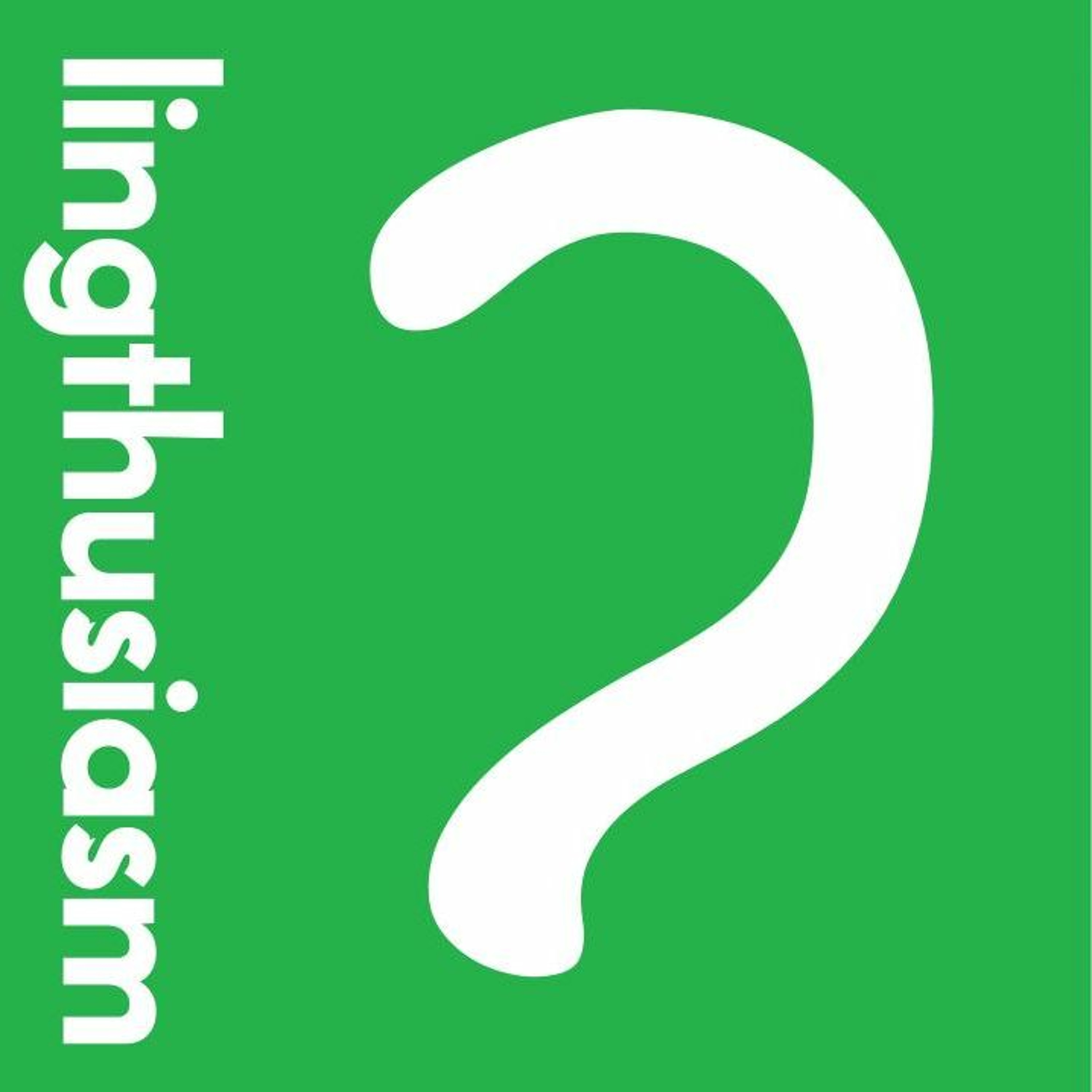 Lingthusiasm - A podcast that's enthusiastic about linguistics73: The linguistic map is not the linguistic territoryMaps of languages of the world are fun to look at, but they’re also often suspiciously precise: a suspiciously round number of languages, like 7000, mapped to dots or coloured zones with suspiciously exact and un-overlapping locations. And yet, if you’ve ever eavesdropped on people on public transit, you know that any given location often plays host to many linguistic varieties at once.
In this episode, your hosts Gretchen McCulloch and Lauren Gawne get enthusiastic about the complications that come with trying to map languages and dialects. We talk about the history of how people have tried to map out...2022-10-2139 min
Lingthusiasm - A podcast that's enthusiastic about linguistics73: The linguistic map is not the linguistic territoryMaps of languages of the world are fun to look at, but they’re also often suspiciously precise: a suspiciously round number of languages, like 7000, mapped to dots or coloured zones with suspiciously exact and un-overlapping locations. And yet, if you’ve ever eavesdropped on people on public transit, you know that any given location often plays host to many linguistic varieties at once.
In this episode, your hosts Gretchen McCulloch and Lauren Gawne get enthusiastic about the complications that come with trying to map languages and dialects. We talk about the history of how people have tried to map out...2022-10-2139 min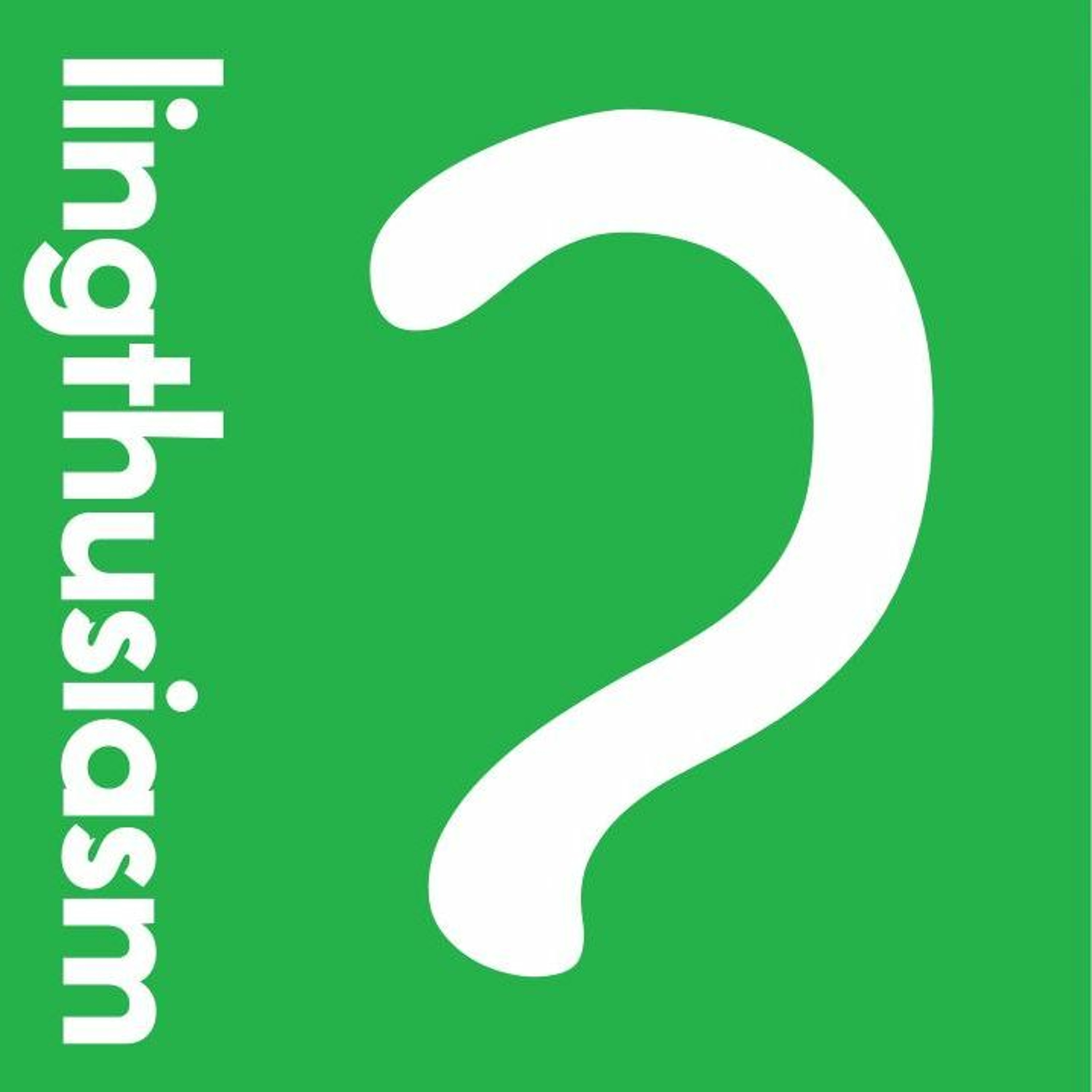 Lingthusiasm - A podcast that's enthusiastic about linguistics72: What If Linguistics - Absurd hypothetical questions with Randall Munroe of xkcdWhat’s the “it’s” in “it’s three pm and hot”? How do you write a cough in the International Phonetic Alphabet? Who is the person most likely to speak similarly to a randomly-selected North American English speaker?
In this episode, your hosts Gretchen McCulloch and Lauren Gawne get enthusiastic about absurd hypothetical linguistic questions with special guest Randall Munroe, creator of the webcomic xkcd and author of What If? 2: Additional Serious Scientific Answers to Absurd Hypothetical Questions. We only wish that there was a little more linguistics in the book. So Randall came on to fill the gap with all his m...2022-09-1649 min
Lingthusiasm - A podcast that's enthusiastic about linguistics72: What If Linguistics - Absurd hypothetical questions with Randall Munroe of xkcdWhat’s the “it’s” in “it’s three pm and hot”? How do you write a cough in the International Phonetic Alphabet? Who is the person most likely to speak similarly to a randomly-selected North American English speaker?
In this episode, your hosts Gretchen McCulloch and Lauren Gawne get enthusiastic about absurd hypothetical linguistic questions with special guest Randall Munroe, creator of the webcomic xkcd and author of What If? 2: Additional Serious Scientific Answers to Absurd Hypothetical Questions. We only wish that there was a little more linguistics in the book. So Randall came on to fill the gap with all his m...2022-09-1649 min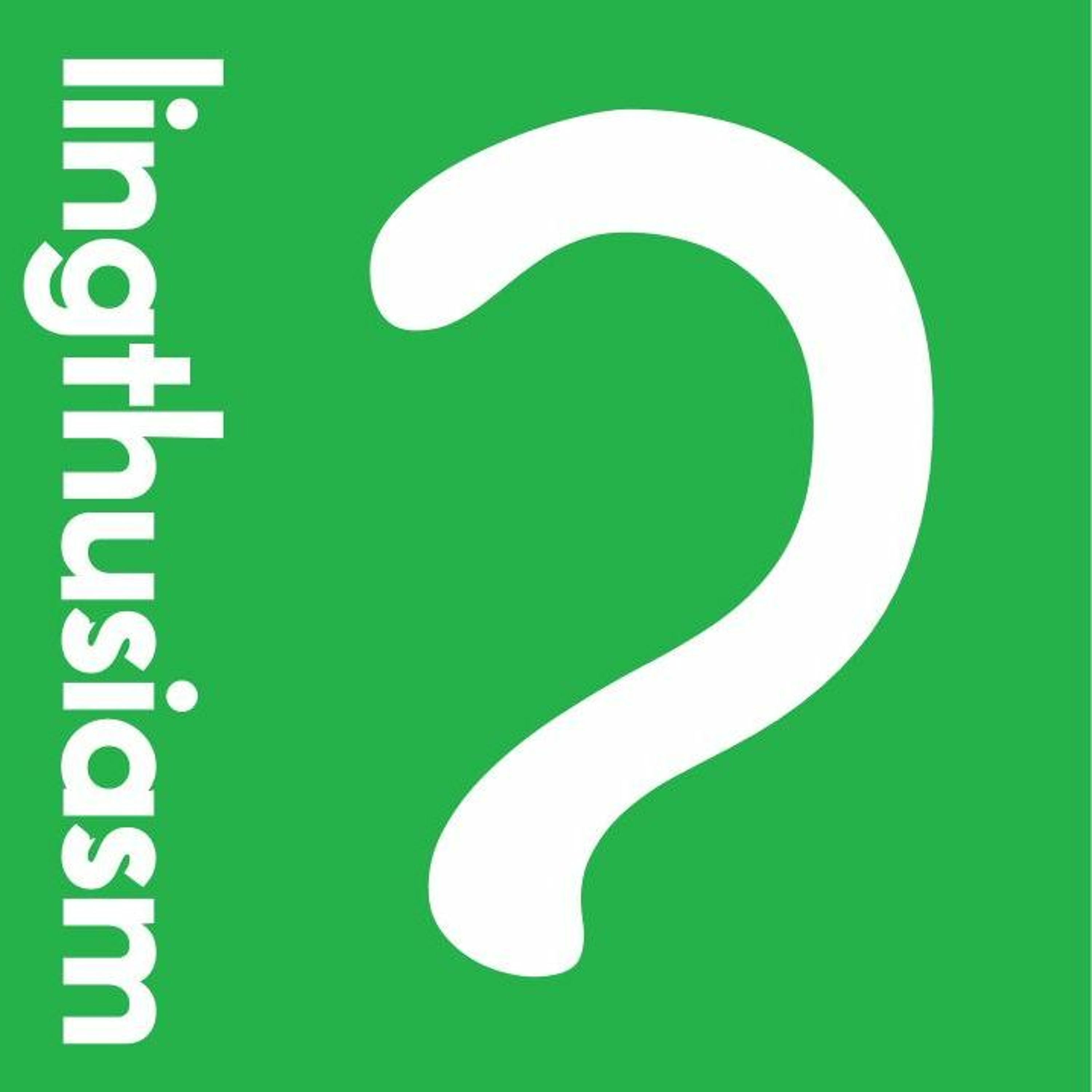 Lingthusiasm - A podcast that's enthusiastic about linguistics71: Various vocal fold vibesPartway down your throat are two flaps of muscle. When you breathe normally, you pull the flaps away to the sides, and air comes out silently. But if you stretch the flaps across the opening of your throat while pushing air up through, you can make them vibrate in the breeze and produce all sorts of sounds -- sort of like the mucousy reed of a giant meat clarinet. (You’re welcome.)
In this episode, your hosts Lauren Gawne and Gretchen McCulloch get enthusiastic about the vocal folds! They’re often called vocal cords, but as they’re attached along the lo...2022-08-1940 min
Lingthusiasm - A podcast that's enthusiastic about linguistics71: Various vocal fold vibesPartway down your throat are two flaps of muscle. When you breathe normally, you pull the flaps away to the sides, and air comes out silently. But if you stretch the flaps across the opening of your throat while pushing air up through, you can make them vibrate in the breeze and produce all sorts of sounds -- sort of like the mucousy reed of a giant meat clarinet. (You’re welcome.)
In this episode, your hosts Lauren Gawne and Gretchen McCulloch get enthusiastic about the vocal folds! They’re often called vocal cords, but as they’re attached along the lo...2022-08-1940 min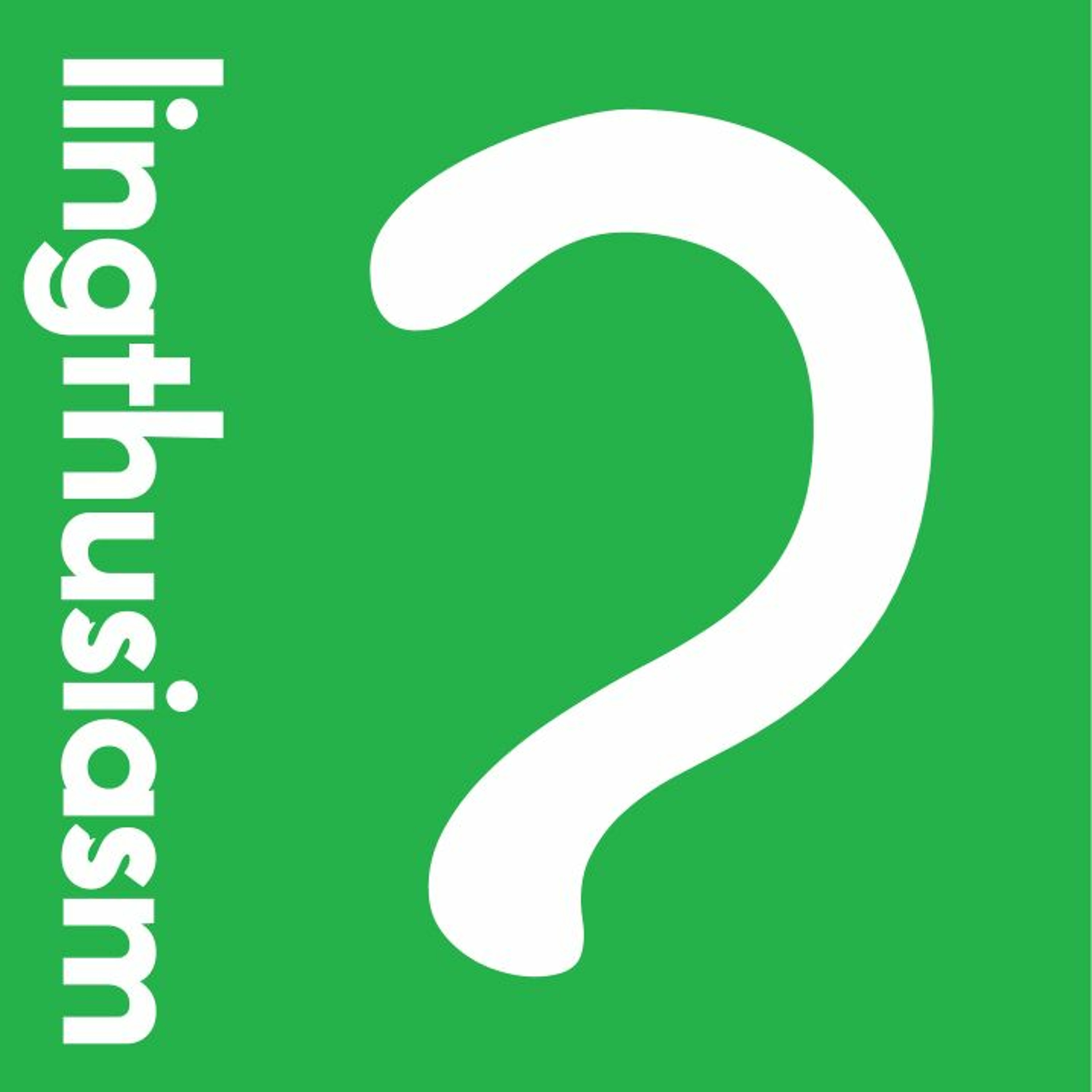 Lingthusiasm - A podcast that's enthusiastic about linguistics69: What we can, must, and should say about modalsSometimes, we use language to make definite statements about how the world is. Other times, we get more hypothetical, and talk about how things could be. What can happen. What may occur. What might be the case. What will happen (or would, if only we should have known!) What we must and shall end up with. In other words, we use a part of language known as modals and modality!
In this episode, your hosts Lauren Gawne and Gretchen McCulloch get enthusiastic about modals! We talk about the nine common modals in English, the gloriously-named quasimodals (no relation to the...2022-06-1642 min
Lingthusiasm - A podcast that's enthusiastic about linguistics69: What we can, must, and should say about modalsSometimes, we use language to make definite statements about how the world is. Other times, we get more hypothetical, and talk about how things could be. What can happen. What may occur. What might be the case. What will happen (or would, if only we should have known!) What we must and shall end up with. In other words, we use a part of language known as modals and modality!
In this episode, your hosts Lauren Gawne and Gretchen McCulloch get enthusiastic about modals! We talk about the nine common modals in English, the gloriously-named quasimodals (no relation to the...2022-06-1642 min Lingthusiasm - A podcast that's enthusiastic about linguistics68: Tea and skyscrapers - When words get borrowed across languagesWhen societies of humans come into contact, they’ll often pick up words from each other. When this is happening actively in the minds of multilingual people, it gets called codeswitching; when it happened long before anyone alive can remember, it’s more likely to get called etymology. But either way, this whole spectrum is a kind of borrowing.
In this episode, your hosts Gretchen McCulloch and Lauren Gawne get enthusiastic about borrowing and loanwords. There are lots of different trajectories that words take when we move them around from language to language, including words that are associated with particular doma...2022-05-2040 min
Lingthusiasm - A podcast that's enthusiastic about linguistics68: Tea and skyscrapers - When words get borrowed across languagesWhen societies of humans come into contact, they’ll often pick up words from each other. When this is happening actively in the minds of multilingual people, it gets called codeswitching; when it happened long before anyone alive can remember, it’s more likely to get called etymology. But either way, this whole spectrum is a kind of borrowing.
In this episode, your hosts Gretchen McCulloch and Lauren Gawne get enthusiastic about borrowing and loanwords. There are lots of different trajectories that words take when we move them around from language to language, including words that are associated with particular doma...2022-05-2040 min Lingthusiasm - A podcast that's enthusiastic about linguistics67: What it means for a language to be officialThe Rosetta Stone is famous as an inscription that let us read Egyptian hieroglyphs again, but it was created in the first place as part of a long history of signage as performative multilingualism in public places. Choosing between languages is both very personal but it’s not only personal -- it’s also a reflection of the way that the societies we live in constrain our choices.
In this episode, your hosts Lauren Gawne and Gretchen McCulloch get enthusiastic about language policy and how organizations and nation-states make language decisions that affect people’s everyday lives. We also talk about...2022-04-2237 min
Lingthusiasm - A podcast that's enthusiastic about linguistics67: What it means for a language to be officialThe Rosetta Stone is famous as an inscription that let us read Egyptian hieroglyphs again, but it was created in the first place as part of a long history of signage as performative multilingualism in public places. Choosing between languages is both very personal but it’s not only personal -- it’s also a reflection of the way that the societies we live in constrain our choices.
In this episode, your hosts Lauren Gawne and Gretchen McCulloch get enthusiastic about language policy and how organizations and nation-states make language decisions that affect people’s everyday lives. We also talk about...2022-04-2237 min Lingthusiasm - A podcast that's enthusiastic about linguistics66: Word order, we loveLet’s say we have the set of words “Lauren”, “Gretchen”, and “visits” and we want to make them into a sentence. The way that we combine these words is going to have a big effect on who’s packing their bags and who’s sitting at home with the kettle on. In English, our two sentences look like “Gretchen visits Lauren” and “Lauren visits Gretchen” -- but that’s not the only word order that’s possible. In theory, we could also use other orders, like “Lauren Gretchen visits” or “Visits Gretchen Lauren”, and in fact, many languages do. The only thing that really matters is...2022-03-1833 min
Lingthusiasm - A podcast that's enthusiastic about linguistics66: Word order, we loveLet’s say we have the set of words “Lauren”, “Gretchen”, and “visits” and we want to make them into a sentence. The way that we combine these words is going to have a big effect on who’s packing their bags and who’s sitting at home with the kettle on. In English, our two sentences look like “Gretchen visits Lauren” and “Lauren visits Gretchen” -- but that’s not the only word order that’s possible. In theory, we could also use other orders, like “Lauren Gretchen visits” or “Visits Gretchen Lauren”, and in fact, many languages do. The only thing that really matters is...2022-03-1833 min Lingthusiasm - A podcast that's enthusiastic about linguistics65: Knowledge is power, copulas are funIt was the best of times, it was the worst of times. The pen is mightier than the sword. Knowledge is power, France is bacon. These, ahem, classic quotes all have something linguistically interesting in common: they’re all formed around a particular use of the verb “be” known as a copula.
In this episode, your hosts Lauren Gawne and Gretchen McCulloch get enthusiastic about copulas! This is a special name for a way of grammatically linking two concepts together that’s linguistically special in a lot of different languages: sometimes it’s a verb that’s super irregular (like be/is/was in...2022-02-1837 min
Lingthusiasm - A podcast that's enthusiastic about linguistics65: Knowledge is power, copulas are funIt was the best of times, it was the worst of times. The pen is mightier than the sword. Knowledge is power, France is bacon. These, ahem, classic quotes all have something linguistically interesting in common: they’re all formed around a particular use of the verb “be” known as a copula.
In this episode, your hosts Lauren Gawne and Gretchen McCulloch get enthusiastic about copulas! This is a special name for a way of grammatically linking two concepts together that’s linguistically special in a lot of different languages: sometimes it’s a verb that’s super irregular (like be/is/was in...2022-02-1837 min Lingthusiasm - A podcast that's enthusiastic about linguistics64: Making speech visible with spectrogramsIf you hear someone saying /sss/ and /fff/, it’s hard to hear those as anything other than, well, S and F. This is very convenient for understanding language, but it’s less convenient for analyzing it -- if you’re trying to figure out exactly what makes two s-like sounds different, it would be helpful if you could kinda sorta turn the language processing part of your brain off for a sec and just process them as sounds.
In this episode, your hosts Lauren Gawne and Gretchen McCulloch get enthusiastic about linguistic visualizations that let us examine sounds in more d...2022-01-2040 min
Lingthusiasm - A podcast that's enthusiastic about linguistics64: Making speech visible with spectrogramsIf you hear someone saying /sss/ and /fff/, it’s hard to hear those as anything other than, well, S and F. This is very convenient for understanding language, but it’s less convenient for analyzing it -- if you’re trying to figure out exactly what makes two s-like sounds different, it would be helpful if you could kinda sorta turn the language processing part of your brain off for a sec and just process them as sounds.
In this episode, your hosts Lauren Gawne and Gretchen McCulloch get enthusiastic about linguistic visualizations that let us examine sounds in more d...2022-01-2040 min Because Language - a podcast about linguistics, the science of language.44: Words of the Week of the Year 2021 (with Lauren Gawne)Our listeners have voted, and here are all the words! Which were our top Words of the Week? Which were the worst? And what did all the dictionary people pick? We’re joined by our very special guest (and lingopod pal) Dr Lauren Gawne for this very cheugy episode of Because Language.2021-12-221h 23
Because Language - a podcast about linguistics, the science of language.44: Words of the Week of the Year 2021 (with Lauren Gawne)Our listeners have voted, and here are all the words! Which were our top Words of the Week? Which were the worst? And what did all the dictionary people pick? We’re joined by our very special guest (and lingopod pal) Dr Lauren Gawne for this very cheugy episode of Because Language.2021-12-221h 23 Lingthusiasm - A podcast that's enthusiastic about linguistics63: Where to get your English etymologiesWhen you look at a series of words that sorta sound like each other, such as pesto, paste, and pasta, it’s easy to start wondering if they might have originated with a common root word. Etymologists take these hunches and painstakingly track them down through the historical record to find out which ones are true and which ones aren’t -- in this case, that paste and pasta have a common ancestor, but pesto comes from somewhere else.
In this episode, your hosts Gretchen McCulloch and Lauren Gawne get enthusiastic about English etymology! We talk about where the etymological part...2021-12-1634 min
Lingthusiasm - A podcast that's enthusiastic about linguistics63: Where to get your English etymologiesWhen you look at a series of words that sorta sound like each other, such as pesto, paste, and pasta, it’s easy to start wondering if they might have originated with a common root word. Etymologists take these hunches and painstakingly track them down through the historical record to find out which ones are true and which ones aren’t -- in this case, that paste and pasta have a common ancestor, but pesto comes from somewhere else.
In this episode, your hosts Gretchen McCulloch and Lauren Gawne get enthusiastic about English etymology! We talk about where the etymological part...2021-12-1634 min Troublesome Terps67: The Translation & Interpreting PodcastivalPodcasts are everywhere, so what to listen to?
To help you along here, the Troublesome Terps reached out to some of our favorite language related podcast-superstars and invited them to join our first ever live #podcastival.
The goal was to celebrate the language industry at large in all its beautiful diversity with all its shades and wrinkles and shine a spotlight on these fabulous contributions - if we missed your favorite language podcast, do let us know and enjoy our #podcastival!Special Guests: Ada Volkmer, Carrie Gillon, Cate Hamilton, Corinne McKay, Eve Lindemuth Bodeux, Florian...2021-11-251h 51
Troublesome Terps67: The Translation & Interpreting PodcastivalPodcasts are everywhere, so what to listen to?
To help you along here, the Troublesome Terps reached out to some of our favorite language related podcast-superstars and invited them to join our first ever live #podcastival.
The goal was to celebrate the language industry at large in all its beautiful diversity with all its shades and wrinkles and shine a spotlight on these fabulous contributions - if we missed your favorite language podcast, do let us know and enjoy our #podcastival!Special Guests: Ada Volkmer, Carrie Gillon, Cate Hamilton, Corinne McKay, Eve Lindemuth Bodeux, Florian...2021-11-251h 51 Lingthusiasm - A podcast that's enthusiastic about linguistics62: Cool things about scales and implicatureWe can plot the words we use to describe temperature on a scale: cold, cool, warm, hot. It’s not as precise as a temperature scale like Celsius or Fahrenheit, but we all generally agree on where these words sit in relation to each other. We can also do the same with other sets of words that don’t necessarily have an equivalent scientific scale, such as the relationship between “some", "a few" and “many“ or even words like "suppose”, “believe” and “know”.
In this episode, your hosts Gretchen McCulloch and Lauren Gawne get enthusiastic about the things that get implied when we use...2021-11-1937 min
Lingthusiasm - A podcast that's enthusiastic about linguistics62: Cool things about scales and implicatureWe can plot the words we use to describe temperature on a scale: cold, cool, warm, hot. It’s not as precise as a temperature scale like Celsius or Fahrenheit, but we all generally agree on where these words sit in relation to each other. We can also do the same with other sets of words that don’t necessarily have an equivalent scientific scale, such as the relationship between “some", "a few" and “many“ or even words like "suppose”, “believe” and “know”.
In this episode, your hosts Gretchen McCulloch and Lauren Gawne get enthusiastic about the things that get implied when we use...2021-11-1937 min Lingthusiasm - A podcast that's enthusiastic about linguistics60: That’s the kind of episode it’s - cliticsHere’s a completely normal and unremarkable sentence. Let’s imagine we have two different coloured pens, and we’re going to circle the words in red and the affixes, that’s prefixes and suffixes, in blue.
“Later today, I’ll know if I hafta get some prizes for Helen of Troy’s competition, or if it isn’t necessary.”
Some of these are pretty straightforward. “Some”? Word. The -s on “prizes”? Affix. But some of them, “I’ll”, “hafta”, “Helen of Troy’s”, “isn’t”....hmmm.
In this episode, your hosts Lauren Gawne and Gretchen McCulloch get enthusiastic about a small bit of language that’s sort of a halfway...2021-09-1741 min
Lingthusiasm - A podcast that's enthusiastic about linguistics60: That’s the kind of episode it’s - cliticsHere’s a completely normal and unremarkable sentence. Let’s imagine we have two different coloured pens, and we’re going to circle the words in red and the affixes, that’s prefixes and suffixes, in blue.
“Later today, I’ll know if I hafta get some prizes for Helen of Troy’s competition, or if it isn’t necessary.”
Some of these are pretty straightforward. “Some”? Word. The -s on “prizes”? Affix. But some of them, “I’ll”, “hafta”, “Helen of Troy’s”, “isn’t”....hmmm.
In this episode, your hosts Lauren Gawne and Gretchen McCulloch get enthusiastic about a small bit of language that’s sort of a halfway...2021-09-1741 min Lingthusiasm - A podcast that's enthusiastic about linguistics59: Are you thinking what I'm thinking? Theory of MindLet's say I show you and our friend Gavagai a box of chocolates, and then Gav leaves the room, and I show you that the box actually contains coloured pencils. (Big letdown, sorry.) When Gav comes back in the room a minute later, and we've closed the box again, what are they going to think is in the box?
In this episode, your hosts Gretchen McCulloch and Lauren Gawne get enthusiastic about Theory of Mind -- our ability to keep track of what other people are thinking, even when it's different from what we know ourselves. We talk about the...2021-08-2038 min
Lingthusiasm - A podcast that's enthusiastic about linguistics59: Are you thinking what I'm thinking? Theory of MindLet's say I show you and our friend Gavagai a box of chocolates, and then Gav leaves the room, and I show you that the box actually contains coloured pencils. (Big letdown, sorry.) When Gav comes back in the room a minute later, and we've closed the box again, what are they going to think is in the box?
In this episode, your hosts Gretchen McCulloch and Lauren Gawne get enthusiastic about Theory of Mind -- our ability to keep track of what other people are thinking, even when it's different from what we know ourselves. We talk about the...2021-08-2038 min I Get That A LotThe Not-Very-Cunning Joke About Linguists (with Lauren Gawne)Lauren Gawne is a linguist and senior lecturer at La Trobe University in Melbourne. As a linguist, there's one (incredibly inappropriate) joke that comes up over and over again, and she tells us about it in this episode. She also discusses her collaborations with the Coen Brothers, the humanity of customer service jobs, and how much she appreciates have very boring and very interesting names.
Subscribe to Lingthusiasm
Get early access and bonus episodes on our Patreon
Follow the show on Instagram @IGetThatALotPod
Music by Louie Zong
Art by...2021-08-1631 min
I Get That A LotThe Not-Very-Cunning Joke About Linguists (with Lauren Gawne)Lauren Gawne is a linguist and senior lecturer at La Trobe University in Melbourne. As a linguist, there's one (incredibly inappropriate) joke that comes up over and over again, and she tells us about it in this episode. She also discusses her collaborations with the Coen Brothers, the humanity of customer service jobs, and how much she appreciates have very boring and very interesting names.
Subscribe to Lingthusiasm
Get early access and bonus episodes on our Patreon
Follow the show on Instagram @IGetThatALotPod
Music by Louie Zong
Art by...2021-08-1631 min Lingthusiasm - A podcast that's enthusiastic about linguistics58: A Fun-Filled Fricative Field TripWhat do the sounds fffff, vvvv, ssss, and zzzz all have in common? They're all produced by creating a sort of friction in your mouth when you constrict two parts against each other, whether that's your lips, your teeth, your tongue, the roof of your mouth, or in your throat. This whole class of sounds that are produced using friction are known as fricatives!
In this episode, your hosts Gretchen McCulloch and Lauren Gawne get enthusiastic about fricatives! We take you on a tour from the front of your mouth to the back (sadly, you’ll have to imagine the ti...2021-07-1639 min
Lingthusiasm - A podcast that's enthusiastic about linguistics58: A Fun-Filled Fricative Field TripWhat do the sounds fffff, vvvv, ssss, and zzzz all have in common? They're all produced by creating a sort of friction in your mouth when you constrict two parts against each other, whether that's your lips, your teeth, your tongue, the roof of your mouth, or in your throat. This whole class of sounds that are produced using friction are known as fricatives!
In this episode, your hosts Gretchen McCulloch and Lauren Gawne get enthusiastic about fricatives! We take you on a tour from the front of your mouth to the back (sadly, you’ll have to imagine the ti...2021-07-1639 min Lingthusiasm - A podcast that's enthusiastic about linguistics56: Not NOT a negation episode“I don’t have a pet dinosaur.” This sentence is, we assume, true for everyone listening to this episode (if it isn’t, uh, tell us your ways?). And yet it has a different feel to it than a more ordinary sentence like “I don’t have a cat”, the type of negated sentence that’s true for some people and not others.
In this episode, your hosts Lauren Gawne and Gretchen McCulloch get enthusiastic about negation! We talk about how languages make sentences negative, how negation fits into the social side of conversation, and two ways you can make things super ext...2021-05-2131 min
Lingthusiasm - A podcast that's enthusiastic about linguistics56: Not NOT a negation episode“I don’t have a pet dinosaur.” This sentence is, we assume, true for everyone listening to this episode (if it isn’t, uh, tell us your ways?). And yet it has a different feel to it than a more ordinary sentence like “I don’t have a cat”, the type of negated sentence that’s true for some people and not others.
In this episode, your hosts Lauren Gawne and Gretchen McCulloch get enthusiastic about negation! We talk about how languages make sentences negative, how negation fits into the social side of conversation, and two ways you can make things super ext...2021-05-2131 min Lingthusiasm - A podcast that's enthusiastic about linguistics55: R and R-like sounds - RhoticityThe letter R is just one symbol, but it can represent a whole family of sounds. In various languages, R can be made in various places, from the tip of your tongue to the back of your throat, and in various ways, from repeatedly trilling a small fleshy part against the rest of your mouth to an almost fully open mouth that’s practically a vowel.
In this episode, your hosts Lauren Gawne and Gretchen McCulloch get enthusiastic about R and R-like sounds, technically known as rhotics, including English r, French r, Spanish r and rr, and more. We also ta...2021-04-1640 min
Lingthusiasm - A podcast that's enthusiastic about linguistics55: R and R-like sounds - RhoticityThe letter R is just one symbol, but it can represent a whole family of sounds. In various languages, R can be made in various places, from the tip of your tongue to the back of your throat, and in various ways, from repeatedly trilling a small fleshy part against the rest of your mouth to an almost fully open mouth that’s practically a vowel.
In this episode, your hosts Lauren Gawne and Gretchen McCulloch get enthusiastic about R and R-like sounds, technically known as rhotics, including English r, French r, Spanish r and rr, and more. We also ta...2021-04-1640 min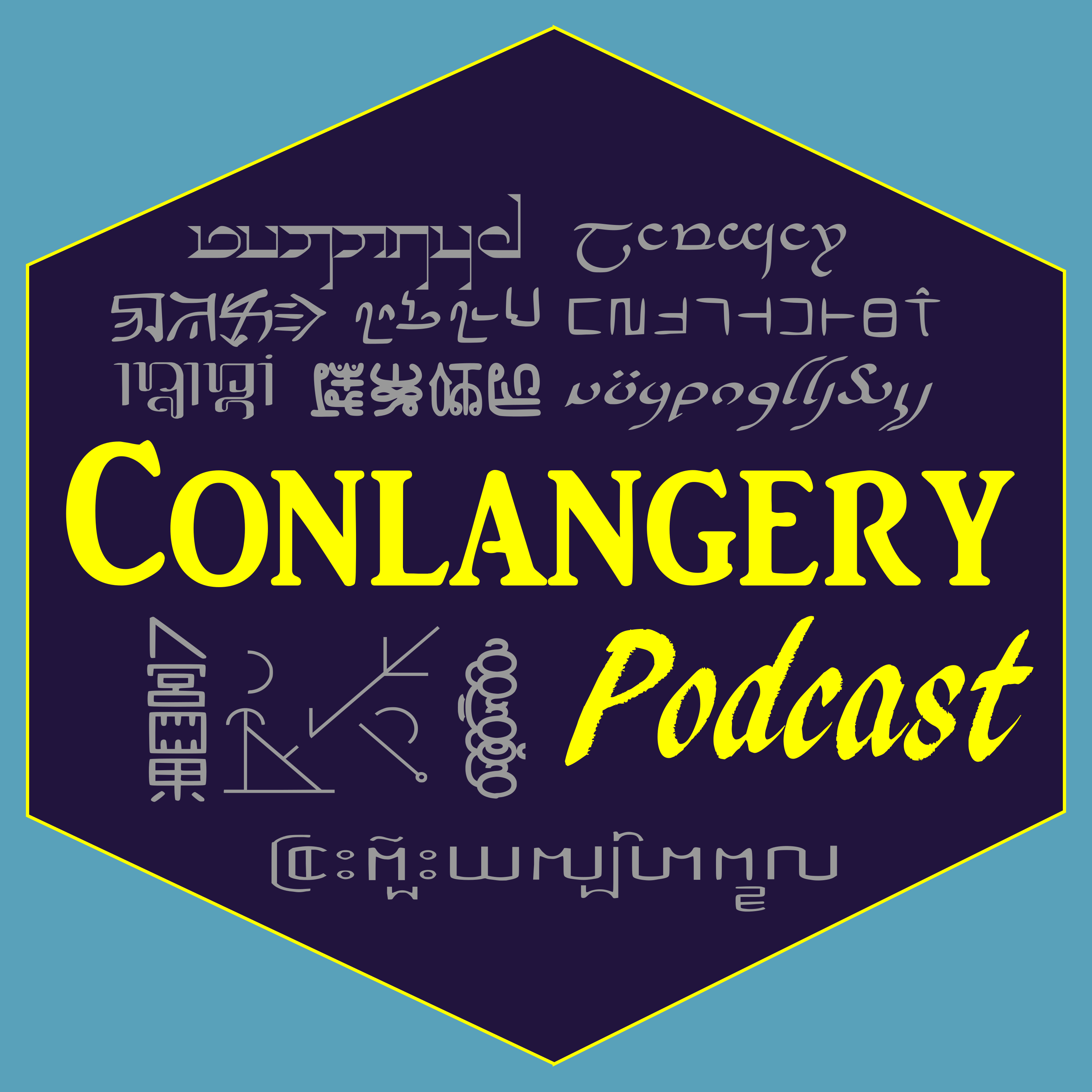 Conlangery PodcastConlangery 148: Interview with Lauren GawneGeorge interviews Lauren Gawne of Superlinguo and Lingthusiasm about her work on Aramteskan for the Shadowscent book series as well as her other work with authors. Top of Show Greeting: Swedish (Umeå dialect, translated by Ruben Drott) Links and Resources: Shadowscent: The Darkest Bloom Superlinguo Lingthusiasm Transcript coming soon2021-04-0554 min
Conlangery PodcastConlangery 148: Interview with Lauren GawneGeorge interviews Lauren Gawne of Superlinguo and Lingthusiasm about her work on Aramteskan for the Shadowscent book series as well as her other work with authors. Top of Show Greeting: Swedish (Umeå dialect, translated by Ruben Drott) Links and Resources: Shadowscent: The Darkest Bloom Superlinguo Lingthusiasm Transcript coming soon2021-04-0554 min Conlangery PodcastConlangery 148: Interview with Lauren GawneGeorge interviews Lauren Gawne of Superlinguo and Lingthusiasm about her work on Aramteskan for the Shadowscent book series as well as her other work with authors. Top of Show Greeting: Swedish (Umeå dialect, translated by Ruben Drott) Links and Resources: Shadowscent: The Darkest Bloom Superlinguo Lingthusiasm Transcript coming soon2021-04-0554 min
Conlangery PodcastConlangery 148: Interview with Lauren GawneGeorge interviews Lauren Gawne of Superlinguo and Lingthusiasm about her work on Aramteskan for the Shadowscent book series as well as her other work with authors. Top of Show Greeting: Swedish (Umeå dialect, translated by Ruben Drott) Links and Resources: Shadowscent: The Darkest Bloom Superlinguo Lingthusiasm Transcript coming soon2021-04-0554 min Lingthusiasm - A podcast that's enthusiastic about linguistics54: How linguists figure out the grammar of a languageIf you go to the linguistics section of a big library, you may find some shelves containing thick, dusty grammars of various languages. But grammars, like dictionaries, don’t just appear out of nowhere -- they’re made by people, and those people bring their own interests and priorities to the process.
In this episode, your hosts Lauren Gawne and Gretchen McCulloch get enthusiastic about the process of figuring out the structure of a language and writing it down -- making a kind of book called a descriptive grammar. We also talk about differences in grammar-writing traditions in the history of I...2021-03-1841 min
Lingthusiasm - A podcast that's enthusiastic about linguistics54: How linguists figure out the grammar of a languageIf you go to the linguistics section of a big library, you may find some shelves containing thick, dusty grammars of various languages. But grammars, like dictionaries, don’t just appear out of nowhere -- they’re made by people, and those people bring their own interests and priorities to the process.
In this episode, your hosts Lauren Gawne and Gretchen McCulloch get enthusiastic about the process of figuring out the structure of a language and writing it down -- making a kind of book called a descriptive grammar. We also talk about differences in grammar-writing traditions in the history of I...2021-03-1841 min Lingthusiasm - A podcast that's enthusiastic about linguistics53: Listen to the imperatives episode!When we tell you, “stay lingthusiastic!” at the end of every episode, we’re using a grammatical feature known as the imperative. But although it might be amusing to imagine ancient Roman emperors getting enthusiastic about linguistics, unlike Caesar we don’t actually have the ability to enforce this command. So although “stay lingthusiastic!” has the form of the imperative, it really has more the effect of a wish or a hope.
In this episode, your hosts Gretchen McCulloch and Lauren Gawne get enthusiastic about the range of things that imperatives do in various languages. We also get excited about why imperati...2021-02-1942 min
Lingthusiasm - A podcast that's enthusiastic about linguistics53: Listen to the imperatives episode!When we tell you, “stay lingthusiastic!” at the end of every episode, we’re using a grammatical feature known as the imperative. But although it might be amusing to imagine ancient Roman emperors getting enthusiastic about linguistics, unlike Caesar we don’t actually have the ability to enforce this command. So although “stay lingthusiastic!” has the form of the imperative, it really has more the effect of a wish or a hope.
In this episode, your hosts Gretchen McCulloch and Lauren Gawne get enthusiastic about the range of things that imperatives do in various languages. We also get excited about why imperati...2021-02-1942 min Lingthusiasm - A podcast that's enthusiastic about linguistics52: Writing is a technologyThere’s no known human society without language, whether spoken or signed or both, but writing is a different story. Writing is a technology that has only been invented from scratch a handful of times: in ancient Sumeria (where it may have spread to ancient Egypt or been invented separately there), in ancient China, and in ancient Mesoamerica. Far more often, the idea of writing spreads through contact between one culture and its neighbours, even though the shape of the written characters and what they stand for can vary a lot as it spreads.
In this episode, your hosts Lauren Ga...2021-01-2137 min
Lingthusiasm - A podcast that's enthusiastic about linguistics52: Writing is a technologyThere’s no known human society without language, whether spoken or signed or both, but writing is a different story. Writing is a technology that has only been invented from scratch a handful of times: in ancient Sumeria (where it may have spread to ancient Egypt or been invented separately there), in ancient China, and in ancient Mesoamerica. Far more often, the idea of writing spreads through contact between one culture and its neighbours, even though the shape of the written characters and what they stand for can vary a lot as it spreads.
In this episode, your hosts Lauren Ga...2021-01-2137 min Lingthusiasm - A podcast that's enthusiastic about linguistics51: Small talk, big deal“Cold enough for ya?” “Nice weather for ducks.”
Small talk is a valuable piece of our social interactions -- it can be a way of having a momentary exchange with someone you don’t know very well or a bridge into getting to know someone better by figuring out which deeper conversational topics might be of mutual interest.
In this episode of Lingthusiasm, your hosts Lauren Gawne and Gretchen McCulloch get enthusiastic about the science behind small talk: how we pick topics for small talk conversation, the fine art of media references from memes to movies, and our own tested strategies...2020-12-1741 min
Lingthusiasm - A podcast that's enthusiastic about linguistics51: Small talk, big deal“Cold enough for ya?” “Nice weather for ducks.”
Small talk is a valuable piece of our social interactions -- it can be a way of having a momentary exchange with someone you don’t know very well or a bridge into getting to know someone better by figuring out which deeper conversational topics might be of mutual interest.
In this episode of Lingthusiasm, your hosts Lauren Gawne and Gretchen McCulloch get enthusiastic about the science behind small talk: how we pick topics for small talk conversation, the fine art of media references from memes to movies, and our own tested strategies...2020-12-1741 min Lingthusiasm - A podcast that's enthusiastic about linguistics50: Climbing the sonority mountain from A to P“Blick” is not a word of English. But it sounds like it could be, if someone told you a meaning for it. “Bnick” contains English sounds, but somehow it doesn’t feel very likely as an English word. “Lbick” and “Nbick” seem even less likely. What’s going on?
In this episode, your hosts Lauren Gawne and Gretchen McCulloch get enthusiastic about the underlying pattern behind how sounds fit together in various languages, what linguists call sonority. We can place sounds in a line -- or along the steps up a mountain -- according to how sonorous they are, and this lets us compare...2020-11-2041 min
Lingthusiasm - A podcast that's enthusiastic about linguistics50: Climbing the sonority mountain from A to P“Blick” is not a word of English. But it sounds like it could be, if someone told you a meaning for it. “Bnick” contains English sounds, but somehow it doesn’t feel very likely as an English word. “Lbick” and “Nbick” seem even less likely. What’s going on?
In this episode, your hosts Lauren Gawne and Gretchen McCulloch get enthusiastic about the underlying pattern behind how sounds fit together in various languages, what linguists call sonority. We can place sounds in a line -- or along the steps up a mountain -- according to how sonorous they are, and this lets us compare...2020-11-2041 min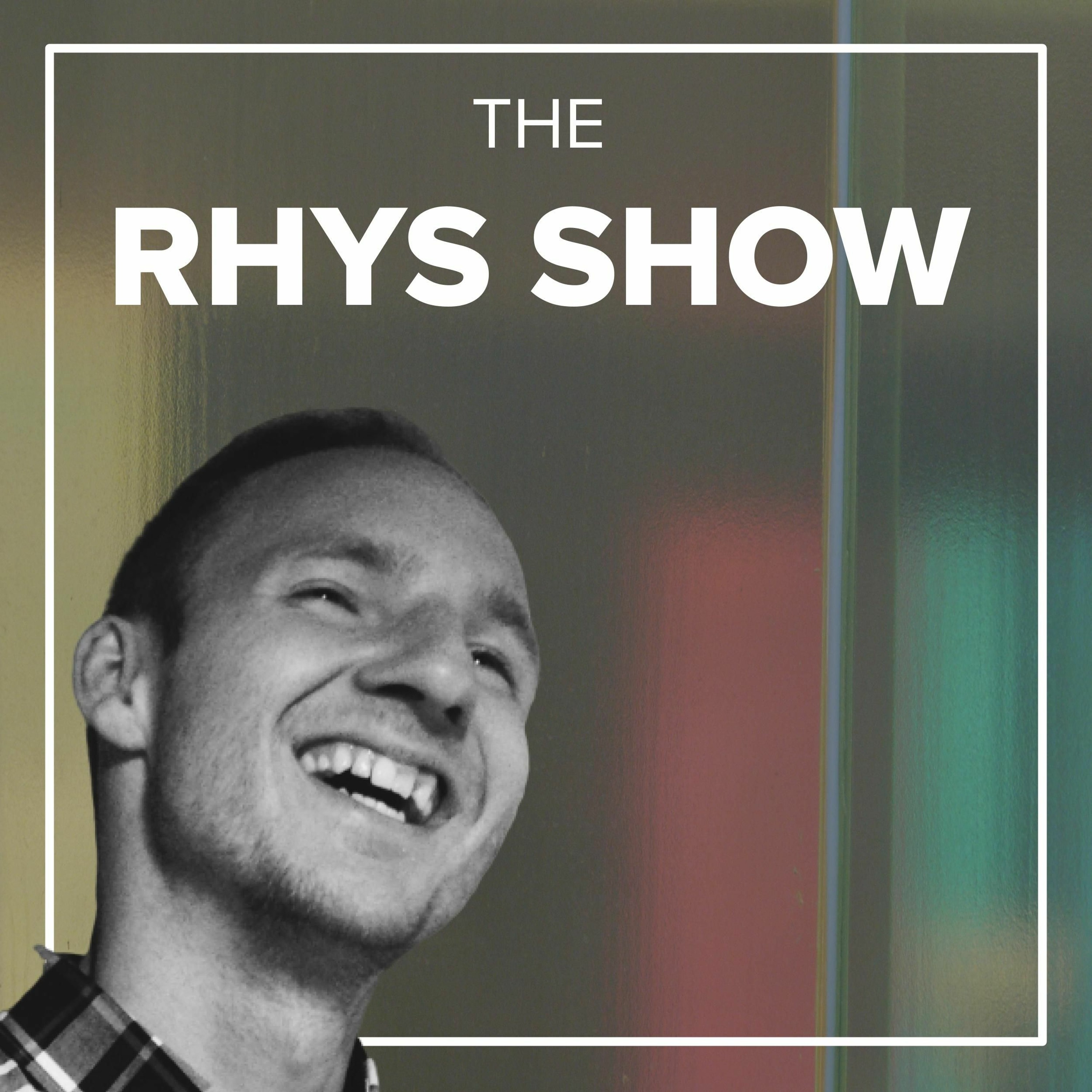 The Rhys Show#73 Lauren Gawne: Internet Linguistics, New Emojis, and ConLangsLauren Gawne is a linguistics Lecturer at La Trobe University. She’s a key part of linguistics Twitter and the ongoing study of internet language. We chat about her proposed emojis, her constructed language, and how language signals community on the internet.
https://twitter.com/superlinguo
https://twitter.com/lingthusiasm
https://twitter.com/RhysLindmark
https://twitter.com/the_roote2020-11-031h 02
The Rhys Show#73 Lauren Gawne: Internet Linguistics, New Emojis, and ConLangsLauren Gawne is a linguistics Lecturer at La Trobe University. She’s a key part of linguistics Twitter and the ongoing study of internet language. We chat about her proposed emojis, her constructed language, and how language signals community on the internet.
https://twitter.com/superlinguo
https://twitter.com/lingthusiasm
https://twitter.com/RhysLindmark
https://twitter.com/the_roote2020-11-031h 02 Lingthusiasm - A podcast that's enthusiastic about linguistics49: How translators approach a textBefore even starting to translate a work, a translator needs to make several important macro-level decisions, such as whether to more closely follow the literal structure of the text or to adapt more freely, especially if the original text does things that are unfamiliar to readers in the destination language but would be familiar to readers in the original language.
In this episode of Lingthusiasm, your hosts Gretchen McCulloch and Lauren Gawne get enthusiastic about the relationship of the translator and the text. We talk about the new, updated translation of Beowulf by Maria Dahvana Headley (affectionately known as the "...2020-10-1633 min
Lingthusiasm - A podcast that's enthusiastic about linguistics49: How translators approach a textBefore even starting to translate a work, a translator needs to make several important macro-level decisions, such as whether to more closely follow the literal structure of the text or to adapt more freely, especially if the original text does things that are unfamiliar to readers in the destination language but would be familiar to readers in the original language.
In this episode of Lingthusiasm, your hosts Gretchen McCulloch and Lauren Gawne get enthusiastic about the relationship of the translator and the text. We talk about the new, updated translation of Beowulf by Maria Dahvana Headley (affectionately known as the "...2020-10-1633 min Lingthusiasm - A podcast that's enthusiastic about linguistics48: Who you are in high school, linguistically speaking - Interview with Shivonne GatesHigh school is a time when people really notice small social details, such as how you dress or what vowels you’re using. Making choices from among these various factors is a big way that we assert our identities as we’re growing up. For a particular group of students in the UK, they’re on the forefront of linguistic innovation using a variety known as Multicultural London English.
In this episode, your host Lauren Gawne interviews Dr. Shivonne Gates, a linguist who wrote her dissertation on Multicultural London English and is currently a Senior Researcher at NatCen Social Research, Britai...2020-09-1844 min
Lingthusiasm - A podcast that's enthusiastic about linguistics48: Who you are in high school, linguistically speaking - Interview with Shivonne GatesHigh school is a time when people really notice small social details, such as how you dress or what vowels you’re using. Making choices from among these various factors is a big way that we assert our identities as we’re growing up. For a particular group of students in the UK, they’re on the forefront of linguistic innovation using a variety known as Multicultural London English.
In this episode, your host Lauren Gawne interviews Dr. Shivonne Gates, a linguist who wrote her dissertation on Multicultural London English and is currently a Senior Researcher at NatCen Social Research, Britai...2020-09-1844 min Lingthusiasm - A podcast that's enthusiastic about linguistics47: The happy fun big adjective episodeAdjectives: they’re big, they’re fun, they’re...maybe non-existent? In English, we have a fairly straightforward category of adjectives: they’re words that can get described with a comparative or a superlative, such as “bigger” or “most fun”. But when we start looking across lots of languages, we find that some languages lump adjectives in with verbs, some with nouns, and some do different things altogether.
In this episode, your hosts Lauren Gawne and Gretchen McCulloch get enthusiastic about adjectives! We talk about how linguists come up with diagnostic tests to determine whether something is an adjective, other quirks about adj...2020-08-2138 min
Lingthusiasm - A podcast that's enthusiastic about linguistics47: The happy fun big adjective episodeAdjectives: they’re big, they’re fun, they’re...maybe non-existent? In English, we have a fairly straightforward category of adjectives: they’re words that can get described with a comparative or a superlative, such as “bigger” or “most fun”. But when we start looking across lots of languages, we find that some languages lump adjectives in with verbs, some with nouns, and some do different things altogether.
In this episode, your hosts Lauren Gawne and Gretchen McCulloch get enthusiastic about adjectives! We talk about how linguists come up with diagnostic tests to determine whether something is an adjective, other quirks about adj...2020-08-2138 min Lingthusiasm - A podcast that's enthusiastic about linguistics46: Hey, no problem, bye! The social dance of phaticsHow are you? Thanks, no problem. Stock, ritualistic social phrases like these, which are used more to indicate a particular social context rather than for the literal meaning of the words inside have a name in linguistics -- they’re called phatics!
In this episode, your hosts Lauren Gawne and Gretchen McCulloch get enthusiastic about the social dance of phatic expressions. We talk about common genres of phatics, including greetings, farewells, and thanking; how ordinary phrases come to take on a social meaning versus how existing phatic expressions can become literal again; and how phatics differ across languages and mediums, in...2020-07-1737 min
Lingthusiasm - A podcast that's enthusiastic about linguistics46: Hey, no problem, bye! The social dance of phaticsHow are you? Thanks, no problem. Stock, ritualistic social phrases like these, which are used more to indicate a particular social context rather than for the literal meaning of the words inside have a name in linguistics -- they’re called phatics!
In this episode, your hosts Lauren Gawne and Gretchen McCulloch get enthusiastic about the social dance of phatic expressions. We talk about common genres of phatics, including greetings, farewells, and thanking; how ordinary phrases come to take on a social meaning versus how existing phatic expressions can become literal again; and how phatics differ across languages and mediums, in...2020-07-1737 min Lingthusiasm - A podcast that's enthusiastic about linguistics45: Tracing languages back before recorded historyLanguage is much older than writing. But audio and visual cues from sounds and signs don’t leave physical traces the way writing does. So when linguists want to figure out how people talked before history started being recorded, we need to engage in some careful detective work, by comparing two or more similar, known languages to (potentially!) reconstruct a hypothetical common ancestor.
In this episode, your hosts Lauren Gawne and Gretchen McCulloch get enthusiastic about these prehistoric languages that historical linguists have reconstructed, known as proto-languages. We dive into some of our favourite proto-languages (Proto-Indo-European, Proto-Algonquian, Proto-Pama-Nyungan, and Proto-Bantu), lo...2020-06-1938 min
Lingthusiasm - A podcast that's enthusiastic about linguistics45: Tracing languages back before recorded historyLanguage is much older than writing. But audio and visual cues from sounds and signs don’t leave physical traces the way writing does. So when linguists want to figure out how people talked before history started being recorded, we need to engage in some careful detective work, by comparing two or more similar, known languages to (potentially!) reconstruct a hypothetical common ancestor.
In this episode, your hosts Lauren Gawne and Gretchen McCulloch get enthusiastic about these prehistoric languages that historical linguists have reconstructed, known as proto-languages. We dive into some of our favourite proto-languages (Proto-Indo-European, Proto-Algonquian, Proto-Pama-Nyungan, and Proto-Bantu), lo...2020-06-1938 min Lingthusiasm - A podcast that's enthusiastic about linguistics44: Schwa, the most versatile English vowelThe words about, broken, council, potato, and support have something in common -- they all contain the same sound, even though they each spell it with a different letter. This sound is known as schwa, it's written as an upside-down lowercase e, and it has the unique distinction of being the only vowel with a cool name like that! (The other vowels are called, unglamorously, things like "high front unrounded vowel").
In this episode of Lingthusiasm, your hosts Gretchen McCulloch and Lauren Gawne get enthusiastic about why the schwa is cool enough to get its own name! We also talk...2020-05-2232 min
Lingthusiasm - A podcast that's enthusiastic about linguistics44: Schwa, the most versatile English vowelThe words about, broken, council, potato, and support have something in common -- they all contain the same sound, even though they each spell it with a different letter. This sound is known as schwa, it's written as an upside-down lowercase e, and it has the unique distinction of being the only vowel with a cool name like that! (The other vowels are called, unglamorously, things like "high front unrounded vowel").
In this episode of Lingthusiasm, your hosts Gretchen McCulloch and Lauren Gawne get enthusiastic about why the schwa is cool enough to get its own name! We also talk...2020-05-2232 min Troublesome Terps48: Getting Lingthusiastic With Lauren GawneAre interpreters enthusiastic about linguistics? If not, they should be! With Alex G away on assignment, Sarah, Jonathan & Alex D are joined by linguist and podcaster extraordinaire Lauren Gawne. Lauren teaches linguistics in Australia and co-hosts the Lingthusiasm podcast with Gretchen McCulloch. Special Guest: Lauren Gawne.2020-05-201h 08
Troublesome Terps48: Getting Lingthusiastic With Lauren GawneAre interpreters enthusiastic about linguistics? If not, they should be! With Alex G away on assignment, Sarah, Jonathan & Alex D are joined by linguist and podcaster extraordinaire Lauren Gawne. Lauren teaches linguistics in Australia and co-hosts the Lingthusiasm podcast with Gretchen McCulloch. Special Guest: Lauren Gawne.2020-05-201h 08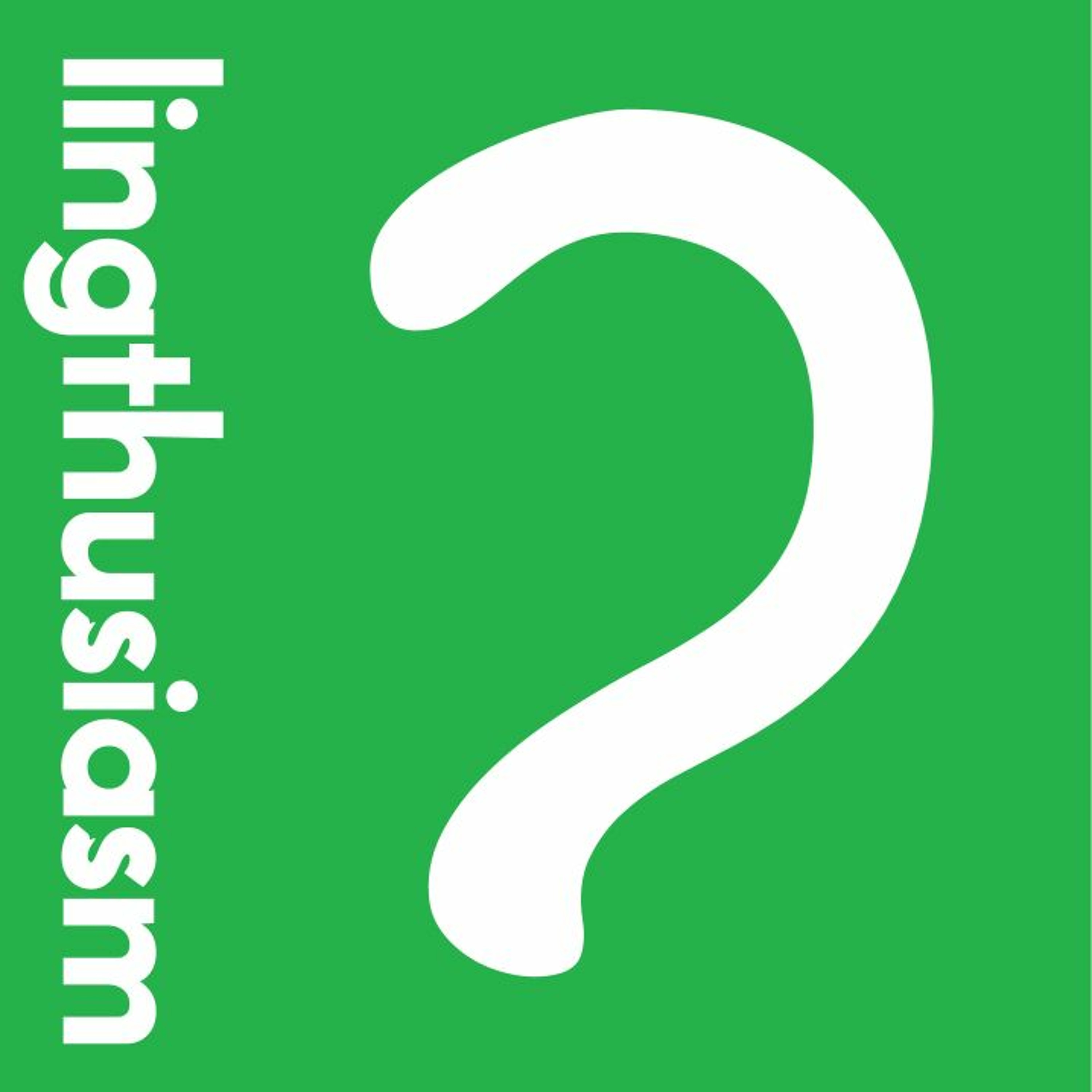 Lingthusiasm - A podcast that's enthusiastic about linguistics42: What makes a language “easy”? It’s a hard questionAsking which language is the hardest to learn is like asking where the furthest place is – it all depends on where you start. And for babies, who start out not knowing any of them, all natural languages are eminently learnable – because otherwise they wouldn’t exist at all!
In this episode of Lingthusiasm, your hosts Gretchen McCulloch and Lauren Gawne get enthusiastic about a common question: what are people really asking when they ask about “easy” or “hard” languages? It turns out that there are several things going on, including which languages you already know, whether you’re approaching a language as an a...2020-03-1939 min
Lingthusiasm - A podcast that's enthusiastic about linguistics42: What makes a language “easy”? It’s a hard questionAsking which language is the hardest to learn is like asking where the furthest place is – it all depends on where you start. And for babies, who start out not knowing any of them, all natural languages are eminently learnable – because otherwise they wouldn’t exist at all!
In this episode of Lingthusiasm, your hosts Gretchen McCulloch and Lauren Gawne get enthusiastic about a common question: what are people really asking when they ask about “easy” or “hard” languages? It turns out that there are several things going on, including which languages you already know, whether you’re approaching a language as an a...2020-03-1939 min Lingthusiasm - A podcast that's enthusiastic about linguistics41: This time it gets tense - The grammar of timeHow do languages talk about the time when something happens? Of course, we can use words like “yesterday”, “on Tuesday”, “once upon a time”, “now”, or “in a few minutes”. But some languages also require their speakers to use an additional small piece of language to convey time-related information, and this is called tense.
In this episode of Lingthusiasm, your hosts Gretchen McCulloch and Lauren Gawne talk about when some languages obligatorily encode time into their grammar. We look at how linguists go about determining whether a language has tense at all, and if so, how many tenses it has, from two tenses (lik...2020-02-2135 min
Lingthusiasm - A podcast that's enthusiastic about linguistics41: This time it gets tense - The grammar of timeHow do languages talk about the time when something happens? Of course, we can use words like “yesterday”, “on Tuesday”, “once upon a time”, “now”, or “in a few minutes”. But some languages also require their speakers to use an additional small piece of language to convey time-related information, and this is called tense.
In this episode of Lingthusiasm, your hosts Gretchen McCulloch and Lauren Gawne talk about when some languages obligatorily encode time into their grammar. We look at how linguists go about determining whether a language has tense at all, and if so, how many tenses it has, from two tenses (lik...2020-02-2135 min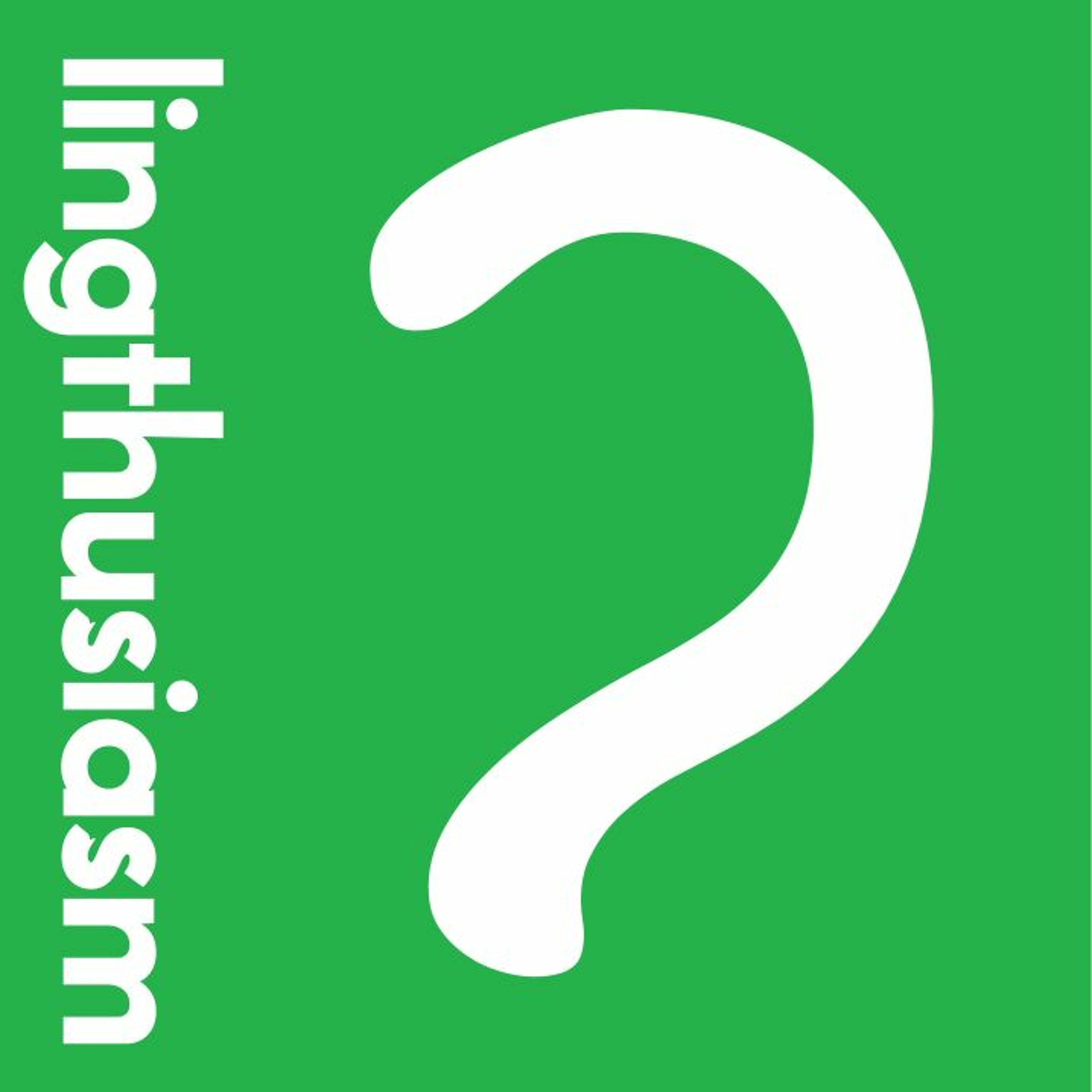 Lingthusiasm - A podcast that's enthusiastic about linguistics40: Making machines learn language - Interview with Janelle ShaneIf you feed a computer enough ice cream flavours or pictures annotated with whether they contain giraffes, the hope is that the computer may eventually learn how to do these things for itself: to generate new potential ice cream flavours or identify the giraffehood status of new photographs. But it’s not necessarily that easy, and the mistakes that machines make when doing relatively silly tasks like ice cream naming or giraffe identification can illuminate how artificial intelligence works when doing more serious tasks as well.
In this episode, your hosts Gretchen McCulloch and Lauren Gawne interview Dr Janelle Shane, au...2020-01-1744 min
Lingthusiasm - A podcast that's enthusiastic about linguistics40: Making machines learn language - Interview with Janelle ShaneIf you feed a computer enough ice cream flavours or pictures annotated with whether they contain giraffes, the hope is that the computer may eventually learn how to do these things for itself: to generate new potential ice cream flavours or identify the giraffehood status of new photographs. But it’s not necessarily that easy, and the mistakes that machines make when doing relatively silly tasks like ice cream naming or giraffe identification can illuminate how artificial intelligence works when doing more serious tasks as well.
In this episode, your hosts Gretchen McCulloch and Lauren Gawne interview Dr Janelle Shane, au...2020-01-1744 min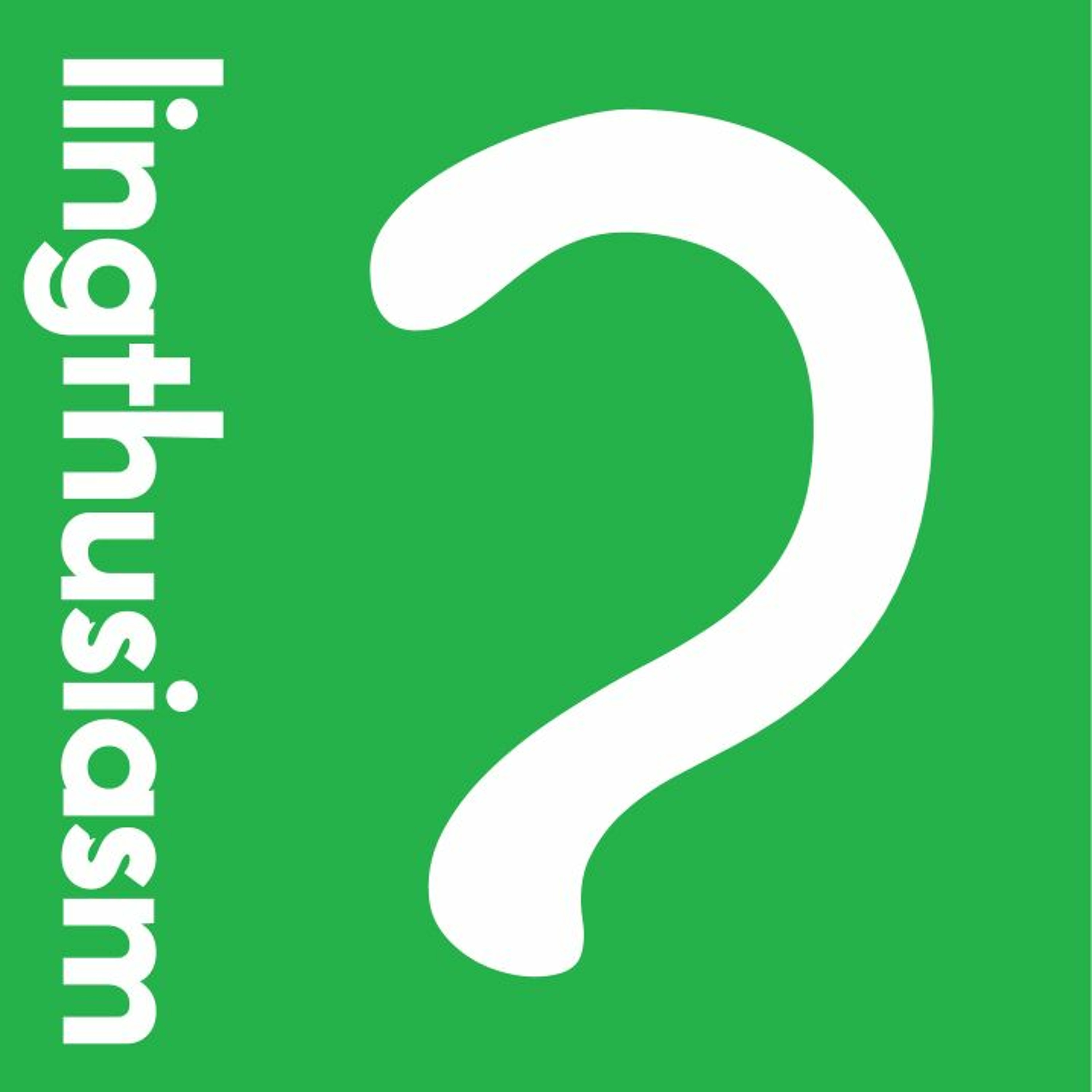 Lingthusiasm - A podcast that's enthusiastic about linguistics39: How to rebalance a lopsided conversationWhy do some conversations seems to flow really easily, while other times, it feels like you can’t get a word in edgewise, or that the other person isn’t holding up their end of the conversation?
In this episode of Lingthusiasm, your hosts Gretchen McCulloch and Lauren Gawne have a conversation about the structure of conversations! Conversation analysts talk about a spectrum of how we take turns in conversation: some people are more high-involvement, while other people are more high-considerateness, depending on how much time you prefer to elapse between someone else’s turn and your own. These differences explai...2019-12-1933 min
Lingthusiasm - A podcast that's enthusiastic about linguistics39: How to rebalance a lopsided conversationWhy do some conversations seems to flow really easily, while other times, it feels like you can’t get a word in edgewise, or that the other person isn’t holding up their end of the conversation?
In this episode of Lingthusiasm, your hosts Gretchen McCulloch and Lauren Gawne have a conversation about the structure of conversations! Conversation analysts talk about a spectrum of how we take turns in conversation: some people are more high-involvement, while other people are more high-considerateness, depending on how much time you prefer to elapse between someone else’s turn and your own. These differences explai...2019-12-1933 min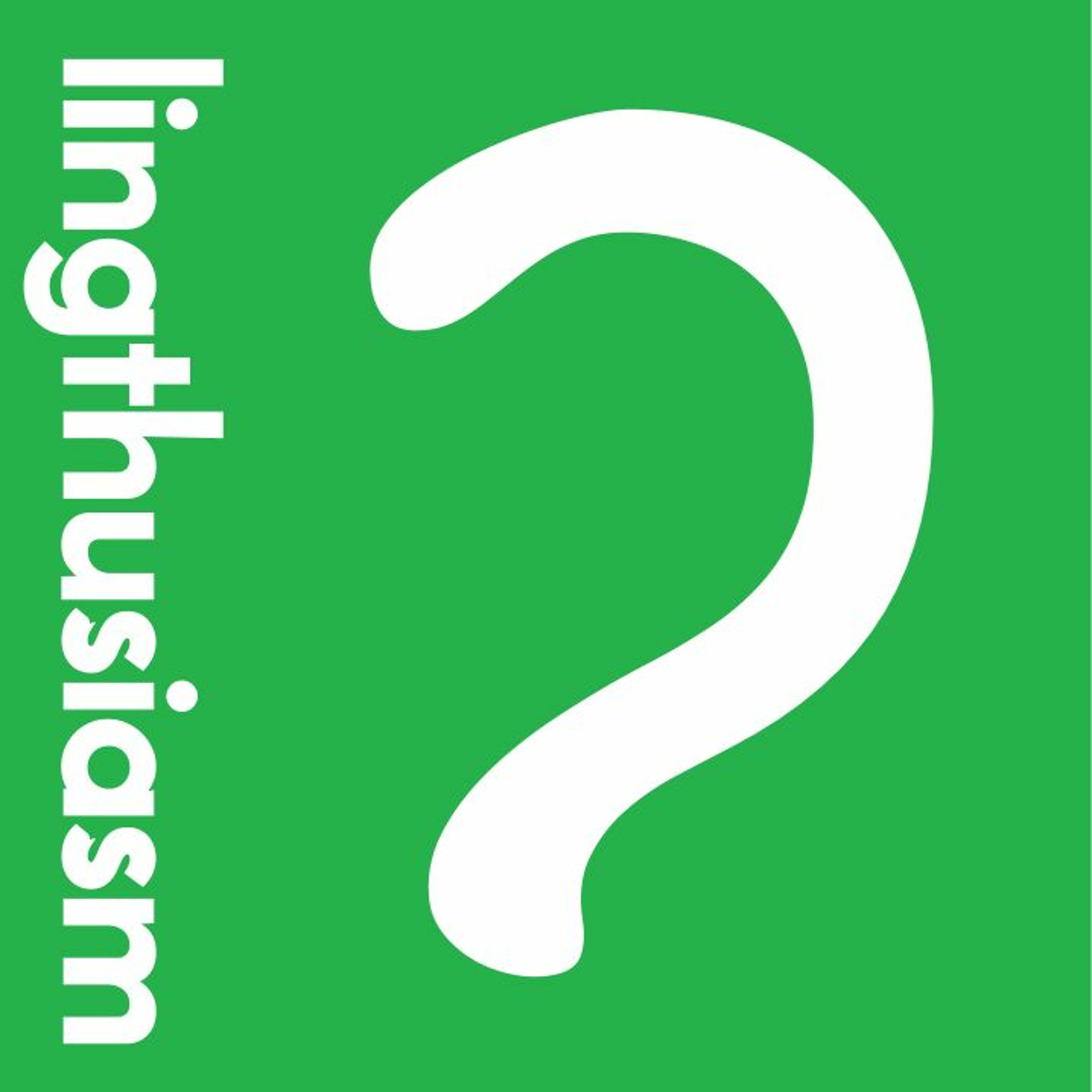 Lingthusiasm - A podcast that's enthusiastic about linguistics37: Smell words, both real and inventedWhat’s your favourite smell? You might say something like the smell of fresh ripe strawberries, or the smell of freshly-cut grass. But if we asked what your favourite colour is, you might say red or green, but you wouldn’t say the colour of strawberries or grass. Why is it that we have so much more vocabulary for colours than for scents?
In this episode of Lingthusiasm, your hosts Lauren Gawne and Gretchen McCulloch get enthusiastic about language and smell! We discuss research into how languages describe scents, colour-odour synesthesia, and how researchers go about doing experiments on smell voca...2019-10-1836 min
Lingthusiasm - A podcast that's enthusiastic about linguistics37: Smell words, both real and inventedWhat’s your favourite smell? You might say something like the smell of fresh ripe strawberries, or the smell of freshly-cut grass. But if we asked what your favourite colour is, you might say red or green, but you wouldn’t say the colour of strawberries or grass. Why is it that we have so much more vocabulary for colours than for scents?
In this episode of Lingthusiasm, your hosts Lauren Gawne and Gretchen McCulloch get enthusiastic about language and smell! We discuss research into how languages describe scents, colour-odour synesthesia, and how researchers go about doing experiments on smell voca...2019-10-1836 min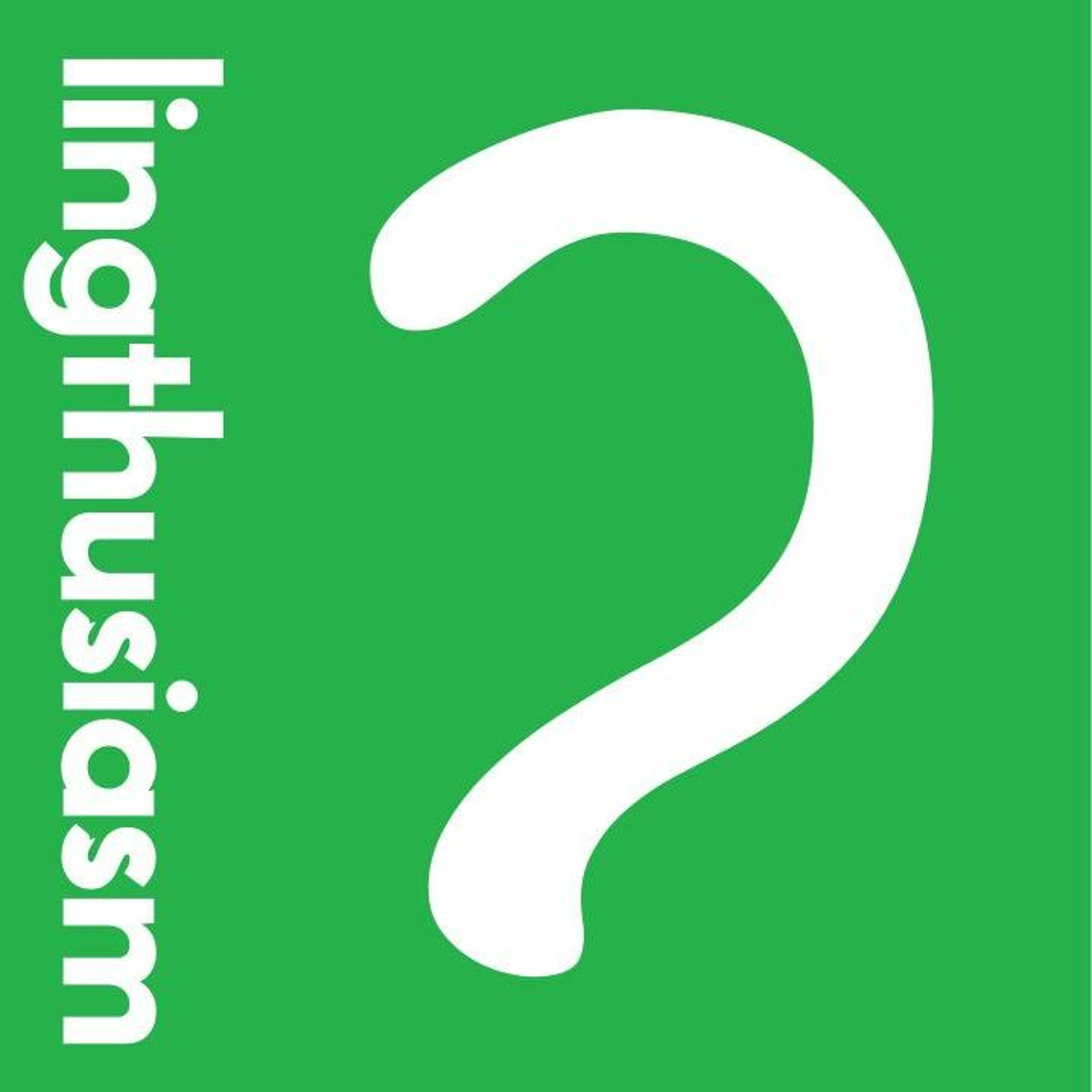 Lingthusiasm - A podcast that's enthusiastic about linguistics35: Putting sounds into syllables is like putting toppings on a burgerSometimes a syllable is jam-packed with sounds, like the single-syllable word “strengths”. Other times, a syllable is as simple as a single vowel or consonant+vowel, like the two syllables in “a-ha!” It’s kind of like a burger: you might pack your burger with tons of toppings, or go as simple as a patty by itself on a plate, but certain combinations are more likely than others. For example, an open-face burger, with only the bottom half of the bun, is less weird than a burger with only the top half.
In this episode of Lingthusiasm, your hosts Lauren Gawne and...2019-08-1629 min
Lingthusiasm - A podcast that's enthusiastic about linguistics35: Putting sounds into syllables is like putting toppings on a burgerSometimes a syllable is jam-packed with sounds, like the single-syllable word “strengths”. Other times, a syllable is as simple as a single vowel or consonant+vowel, like the two syllables in “a-ha!” It’s kind of like a burger: you might pack your burger with tons of toppings, or go as simple as a patty by itself on a plate, but certain combinations are more likely than others. For example, an open-face burger, with only the bottom half of the bun, is less weird than a burger with only the top half.
In this episode of Lingthusiasm, your hosts Lauren Gawne and...2019-08-1629 min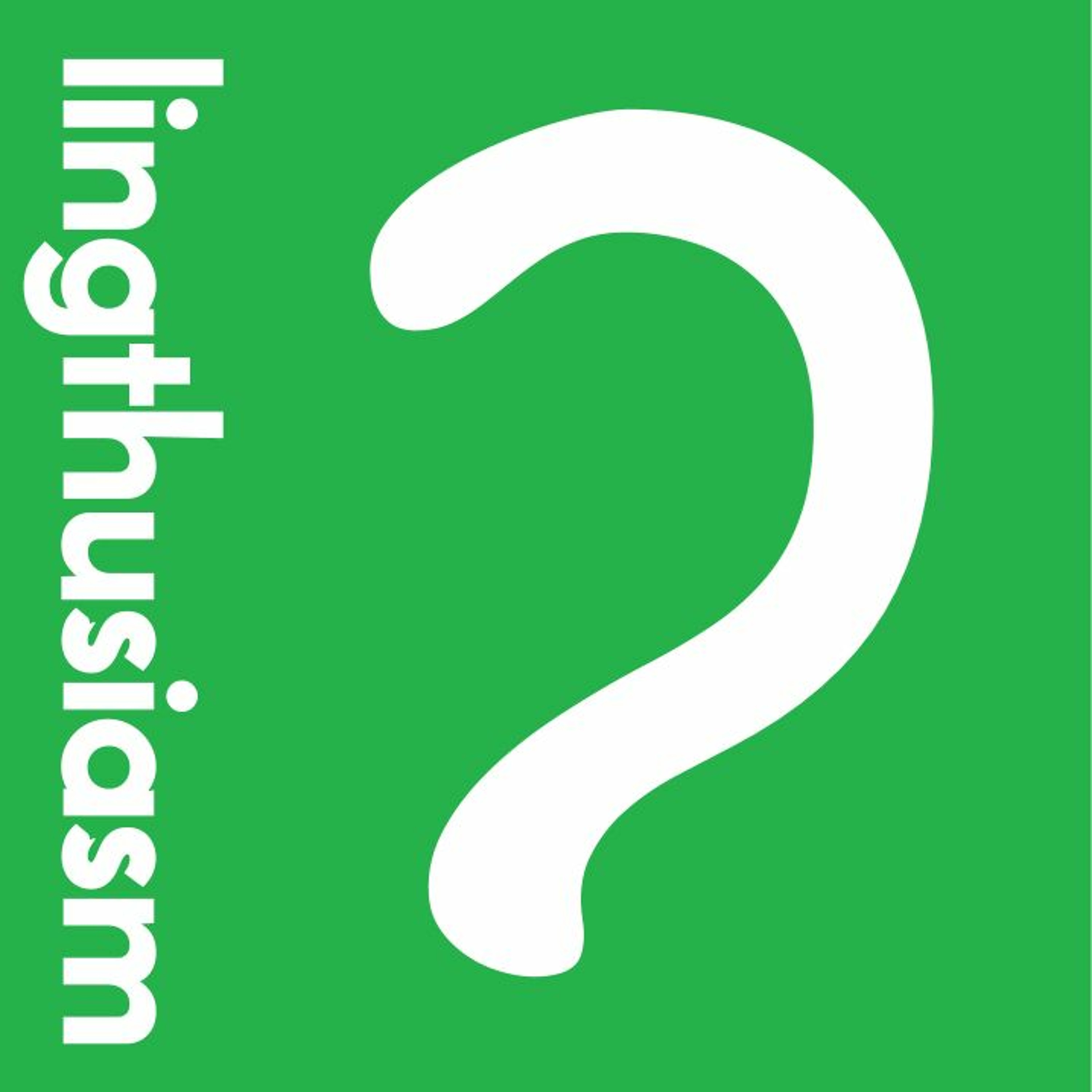 Lingthusiasm - A podcast that's enthusiastic about linguistics34: Emoji are Gesture Because InternetEmoji make a lot of headlines, but what happens when you actually drill down into the data for how people integrate emoji into our everyday messages? It turns out that how we use emoji has a surprising number of similarities with how we use gesture.
In this episode of Lingthusiasm, your hosts Lauren Gawne and Gretchen McCulloch get enthusiastic about emoji, and how gesture studies can bring us to a better understanding of these new digital pictures. We also talk about how we first came to notice the similarities between emoji and gesture, including a behind-the-scenes look into chapter five...2019-07-1930 min
Lingthusiasm - A podcast that's enthusiastic about linguistics34: Emoji are Gesture Because InternetEmoji make a lot of headlines, but what happens when you actually drill down into the data for how people integrate emoji into our everyday messages? It turns out that how we use emoji has a surprising number of similarities with how we use gesture.
In this episode of Lingthusiasm, your hosts Lauren Gawne and Gretchen McCulloch get enthusiastic about emoji, and how gesture studies can bring us to a better understanding of these new digital pictures. We also talk about how we first came to notice the similarities between emoji and gesture, including a behind-the-scenes look into chapter five...2019-07-1930 min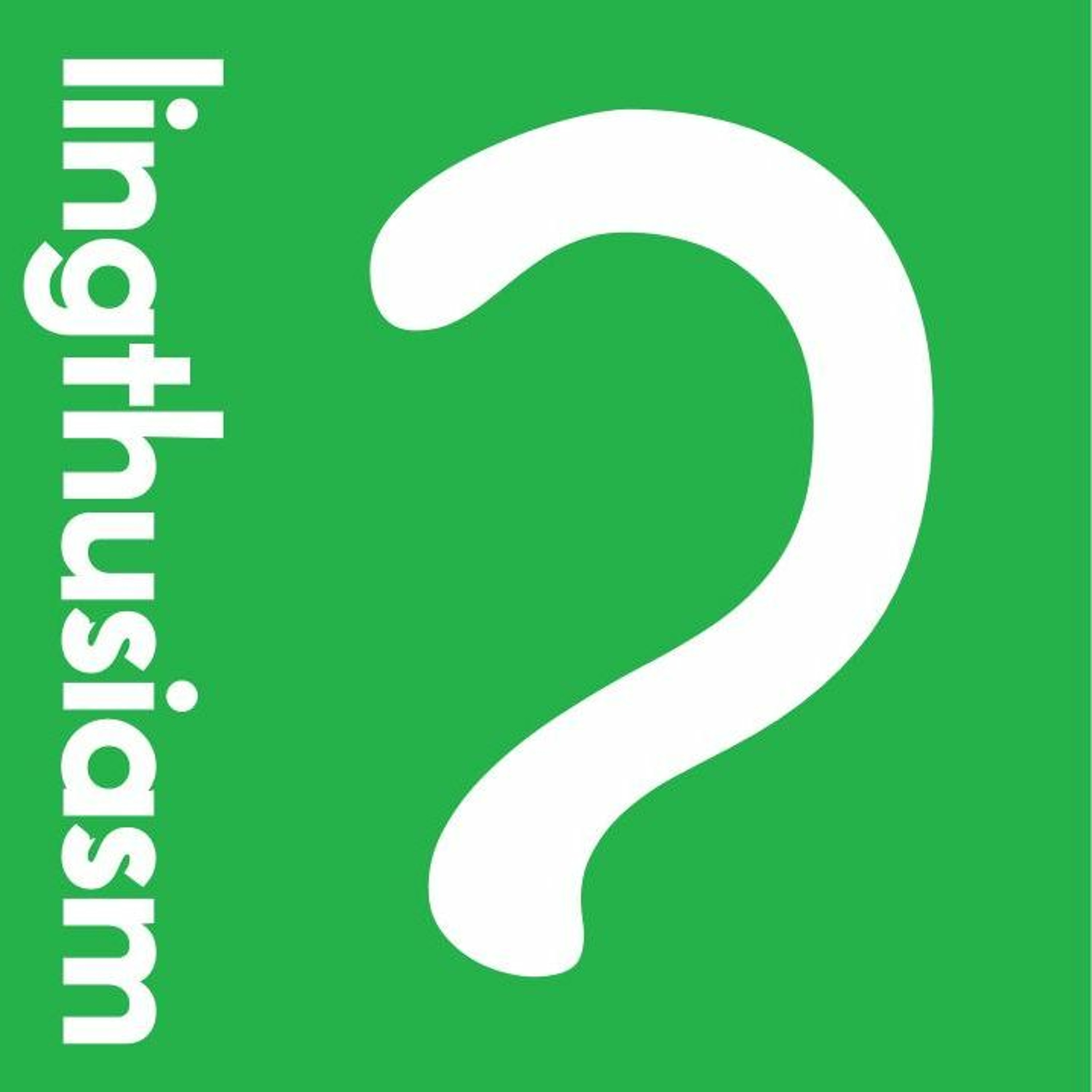 Lingthusiasm - A podcast that's enthusiastic about linguistics33: Why spelling is hard — but also hard to changeWhy does “gh” make different sounds in “though” “through” “laugh” “light” and “ghost”? Why is there a silent “k” at the beginning of words like “know” and “knight”? And which other languages also have interesting historical artefacts in their spelling systems? Spelling systems are kind of like homes – the longer you’ve lived in them, the more random boxes with leftover stuff you start accumulating.
In this episode of Lingthusiasm, your hosts Lauren Gawne and Gretchen McCulloch get enthusiastic about spelling, and celebrate the reasons that it’s sometimes so tricky. We then dive into quirks from some of our favourite spelling systems, including Engl...2019-06-2132 min
Lingthusiasm - A podcast that's enthusiastic about linguistics33: Why spelling is hard — but also hard to changeWhy does “gh” make different sounds in “though” “through” “laugh” “light” and “ghost”? Why is there a silent “k” at the beginning of words like “know” and “knight”? And which other languages also have interesting historical artefacts in their spelling systems? Spelling systems are kind of like homes – the longer you’ve lived in them, the more random boxes with leftover stuff you start accumulating.
In this episode of Lingthusiasm, your hosts Lauren Gawne and Gretchen McCulloch get enthusiastic about spelling, and celebrate the reasons that it’s sometimes so tricky. We then dive into quirks from some of our favourite spelling systems, including Engl...2019-06-2132 min Field NotesEp 8: Lauren Gawne on Funding FieldworkThis episode is with Lauren Gawne who does fieldwork in Nepal working with speakers of Yolmo and Syuba. Lauren has experience as both a successful grant applicant and as a grant committee assessor. In this episode, she shares her advice for navigating applying for funding in the current overly-competitive and under-resourced environment.
Things mentioned in this episode:
Lauren's website
Lingthusiasm: a podcast enthusiastic about linguistics, hosted by Lauren Gawne & Gretchen McCulloch
Lauren's blog: Superlinguo
Short films by Chouette Films from Lauren’s Syuba video recordings: Bees & Earthquakes
Enda...2019-06-1827 min
Field NotesEp 8: Lauren Gawne on Funding FieldworkThis episode is with Lauren Gawne who does fieldwork in Nepal working with speakers of Yolmo and Syuba. Lauren has experience as both a successful grant applicant and as a grant committee assessor. In this episode, she shares her advice for navigating applying for funding in the current overly-competitive and under-resourced environment.
Things mentioned in this episode:
Lauren's website
Lingthusiasm: a podcast enthusiastic about linguistics, hosted by Lauren Gawne & Gretchen McCulloch
Lauren's blog: Superlinguo
Short films by Chouette Films from Lauren’s Syuba video recordings: Bees & Earthquakes
Enda...2019-06-1827 min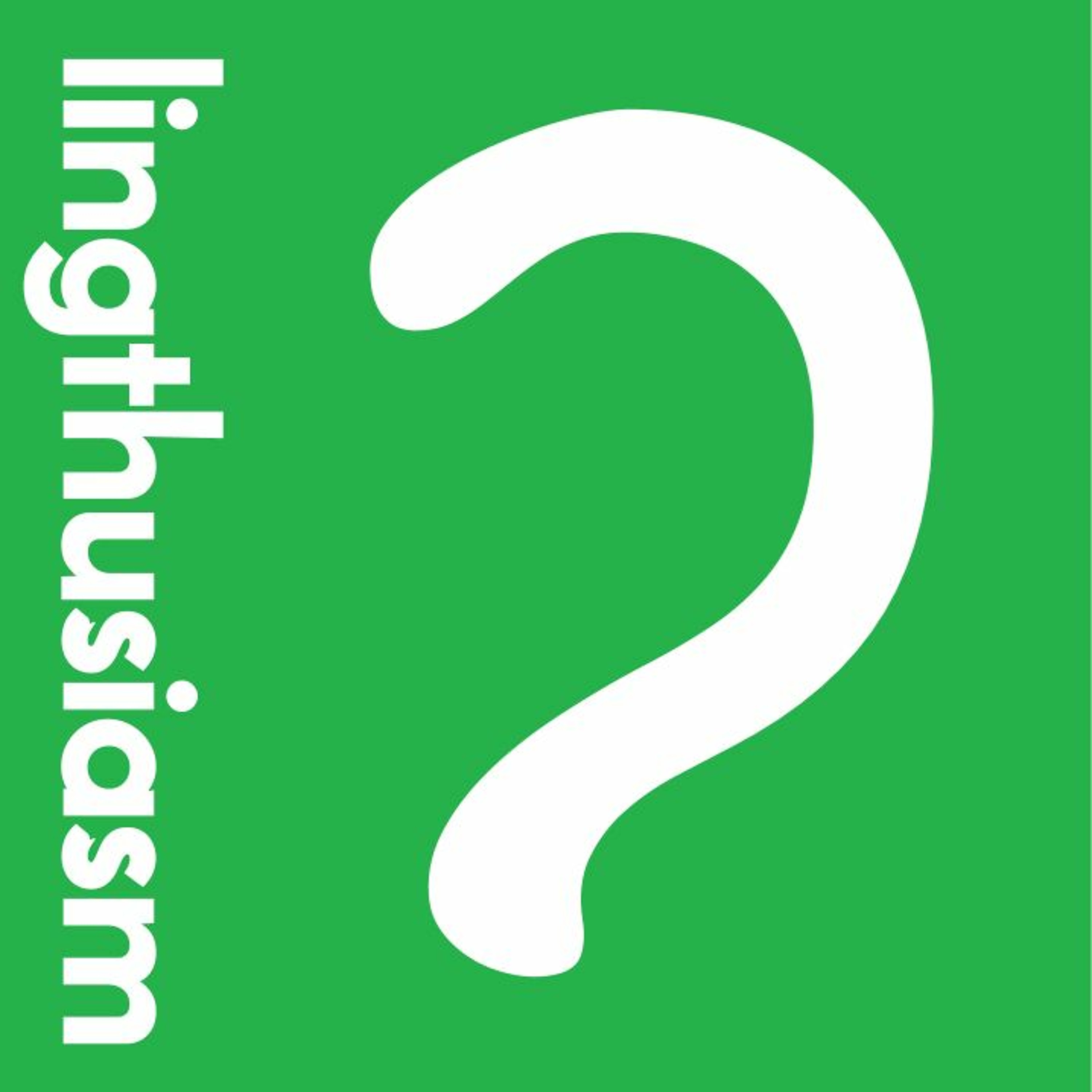 Lingthusiasm - A podcast that's enthusiastic about linguistics32: You heard about it but I was there - EvidentialitySometimes, you know something for sure. You were there. You witnessed it. And you want to make sure that anyone who hears about it from you knows that you’re a direct source. Other times, you weren’t there, but you still have news. Maybe you found it out from someone else, or you pieced together a couple pieces of indirect evidence. In that case, you don’t want to overcommit yourself. When you pass the information on, you want to qualify it with how you found out, in case it turns out not to be accurate.
In this episode of Lin...2019-05-1733 min
Lingthusiasm - A podcast that's enthusiastic about linguistics32: You heard about it but I was there - EvidentialitySometimes, you know something for sure. You were there. You witnessed it. And you want to make sure that anyone who hears about it from you knows that you’re a direct source. Other times, you weren’t there, but you still have news. Maybe you found it out from someone else, or you pieced together a couple pieces of indirect evidence. In that case, you don’t want to overcommit yourself. When you pass the information on, you want to qualify it with how you found out, in case it turns out not to be accurate.
In this episode of Lin...2019-05-1733 min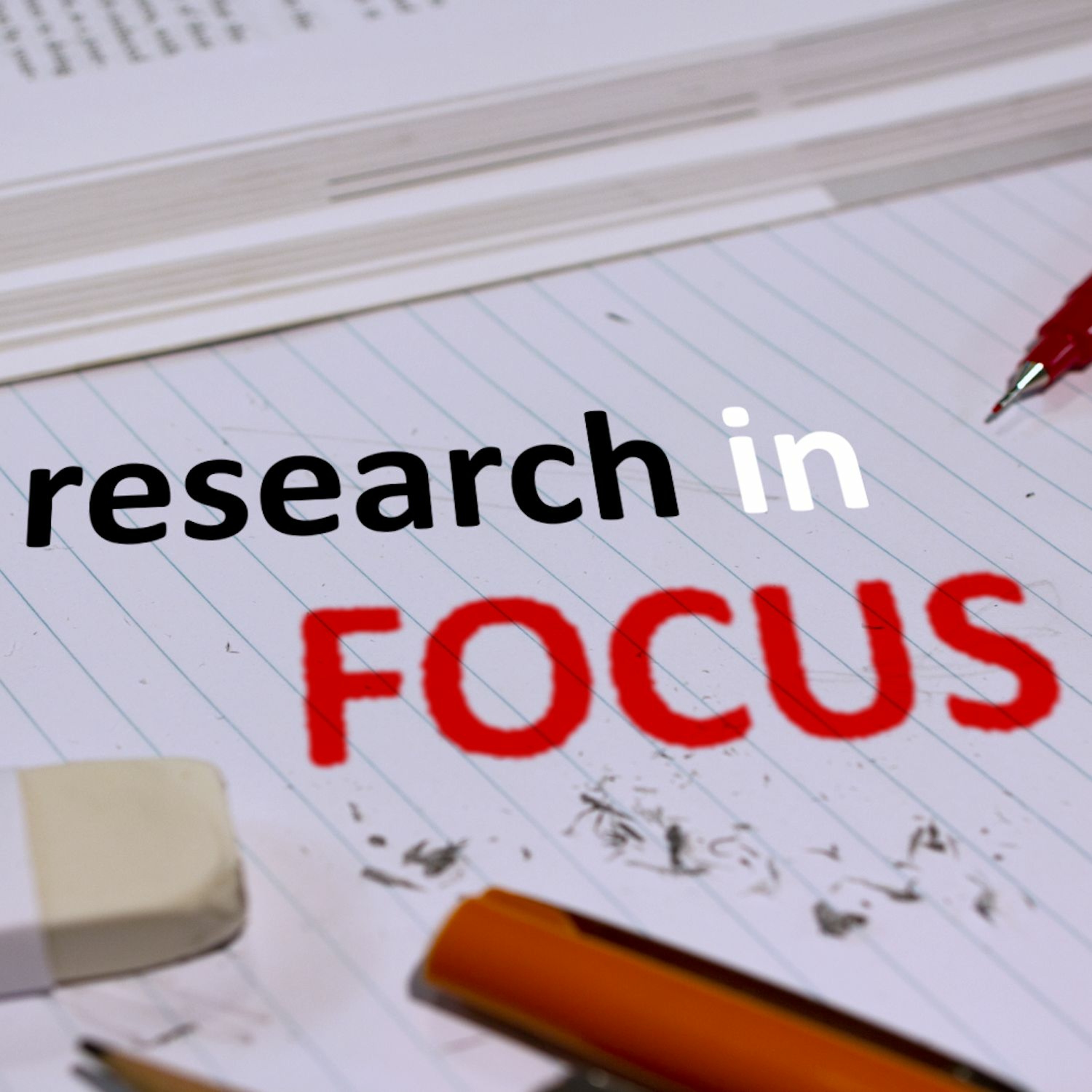 Research in Focus10: Linguistic diversity in focus – Lauren GawneWe don’t often think about the gestures that we use when we talk, although you might after listening to this episode. Gestures are a part of language, and like many other areas of language, linguistics provides a way to better understand them, and ourselves. Lauren Gawne is a David Myers Research Fellow in Linguistics, whose research focuses on grammar and gesture in Tibeto-Burman languages. In this episode of Research in Focus, Lauren chats to Lawrie Zion about why we gesture, the need to study a diverse range of languages, and the importance of communicating research. For more on Lauren’s re...2019-04-1224 min
Research in Focus10: Linguistic diversity in focus – Lauren GawneWe don’t often think about the gestures that we use when we talk, although you might after listening to this episode. Gestures are a part of language, and like many other areas of language, linguistics provides a way to better understand them, and ourselves. Lauren Gawne is a David Myers Research Fellow in Linguistics, whose research focuses on grammar and gesture in Tibeto-Burman languages. In this episode of Research in Focus, Lauren chats to Lawrie Zion about why we gesture, the need to study a diverse range of languages, and the importance of communicating research. For more on Lauren’s re...2019-04-1224 min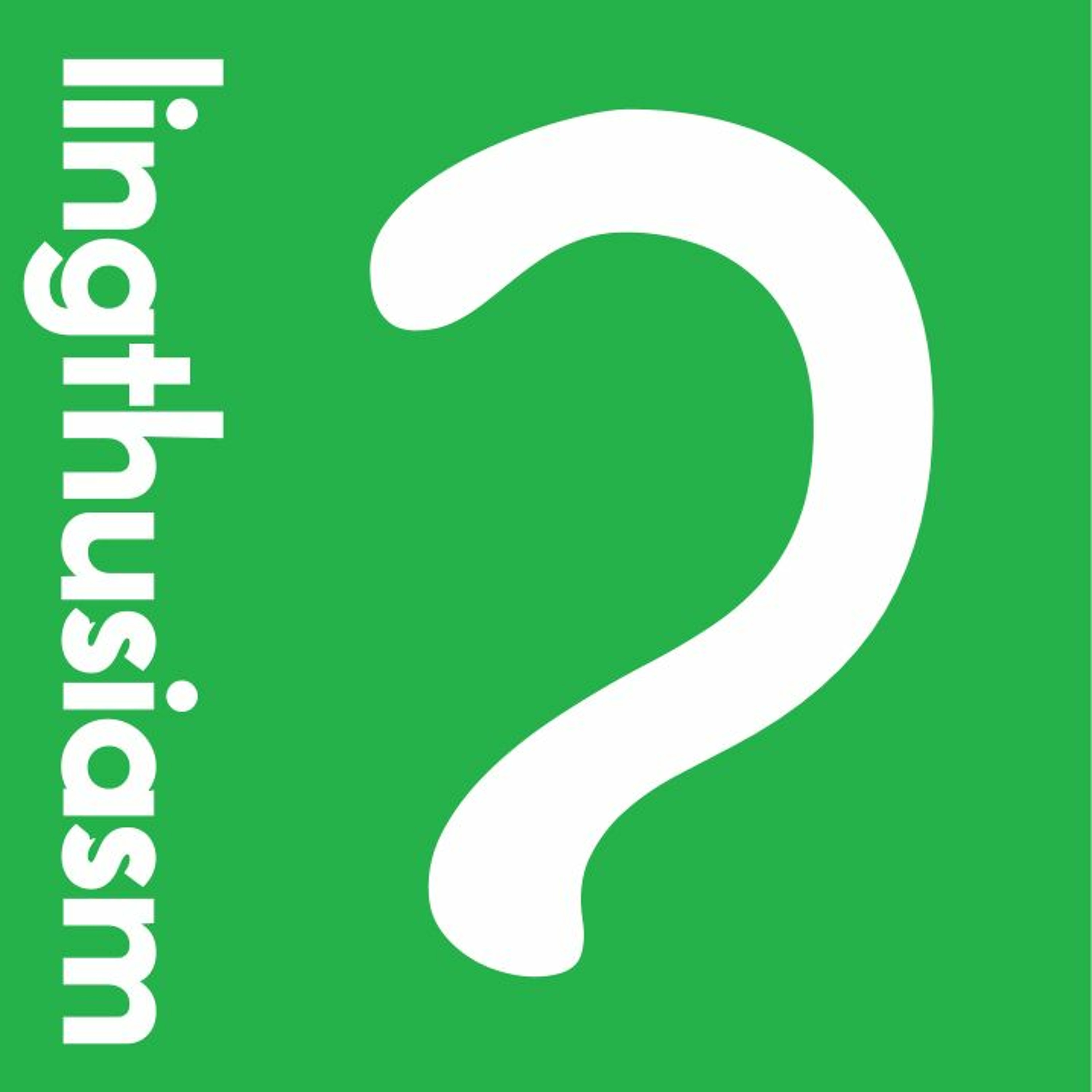 Lingthusiasm - A podcast that's enthusiastic about linguistics30: Why do we gesture when we talk?This episode is also available as a special video episode so you can see the gestures! Go to youtube.com/lingthusiasm or https://www.youtube.com/watch?v=u8dHtr7uLHs to watch it!
When you describe to someone a ball bouncing down a hill, one of the easiest ways to make it really clear just how much the ball bounced would be to gesture the way that it made its way downwards. You might even do the gesture even if you’re talking to the other person on the telephone and they can’t see you. No matter what lang...2019-03-2133 min
Lingthusiasm - A podcast that's enthusiastic about linguistics30: Why do we gesture when we talk?This episode is also available as a special video episode so you can see the gestures! Go to youtube.com/lingthusiasm or https://www.youtube.com/watch?v=u8dHtr7uLHs to watch it!
When you describe to someone a ball bouncing down a hill, one of the easiest ways to make it really clear just how much the ball bounced would be to gesture the way that it made its way downwards. You might even do the gesture even if you’re talking to the other person on the telephone and they can’t see you. No matter what lang...2019-03-2133 min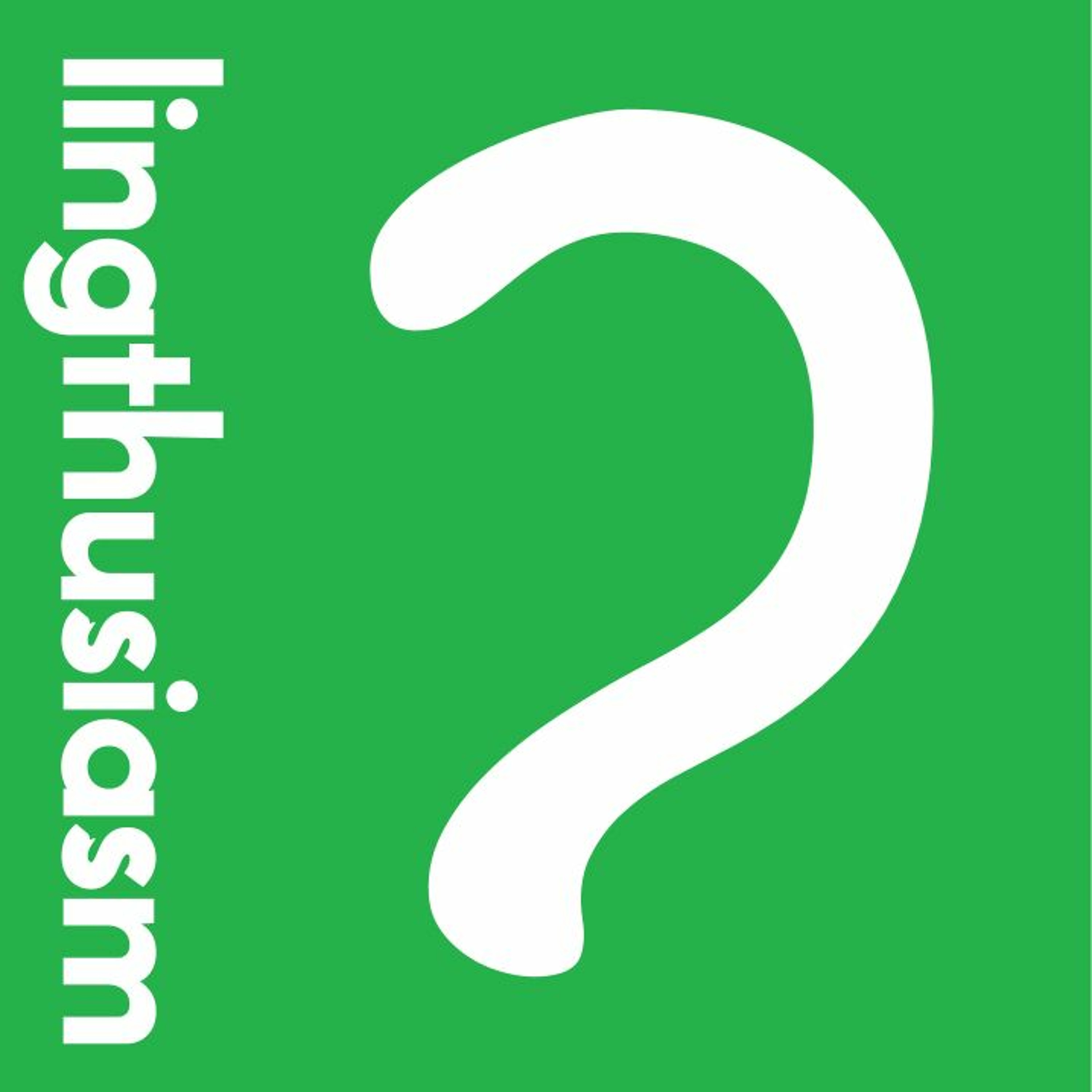 Lingthusiasm - A podcast that's enthusiastic about linguistics29: The verb is the coat rack that the rest of the sentence hangs onSome sentences have a lot of words all relating to each other, while other sentences only have a few. The verb is the thing that makes the biggest difference: it’s what makes “I gave you the book” sound fine but “I rained you the book” sound weird. Or on the flip side, “it’s raining” is a perfectly reasonable description of a general raining event, but “it’s giving” doesn’t work so well as some sort of general giving event. How can we look for patterns in the ways that verbs influence the rest of the sentence?
In this episode, your hosts...2019-02-2238 min
Lingthusiasm - A podcast that's enthusiastic about linguistics29: The verb is the coat rack that the rest of the sentence hangs onSome sentences have a lot of words all relating to each other, while other sentences only have a few. The verb is the thing that makes the biggest difference: it’s what makes “I gave you the book” sound fine but “I rained you the book” sound weird. Or on the flip side, “it’s raining” is a perfectly reasonable description of a general raining event, but “it’s giving” doesn’t work so well as some sort of general giving event. How can we look for patterns in the ways that verbs influence the rest of the sentence?
In this episode, your hosts...2019-02-2238 min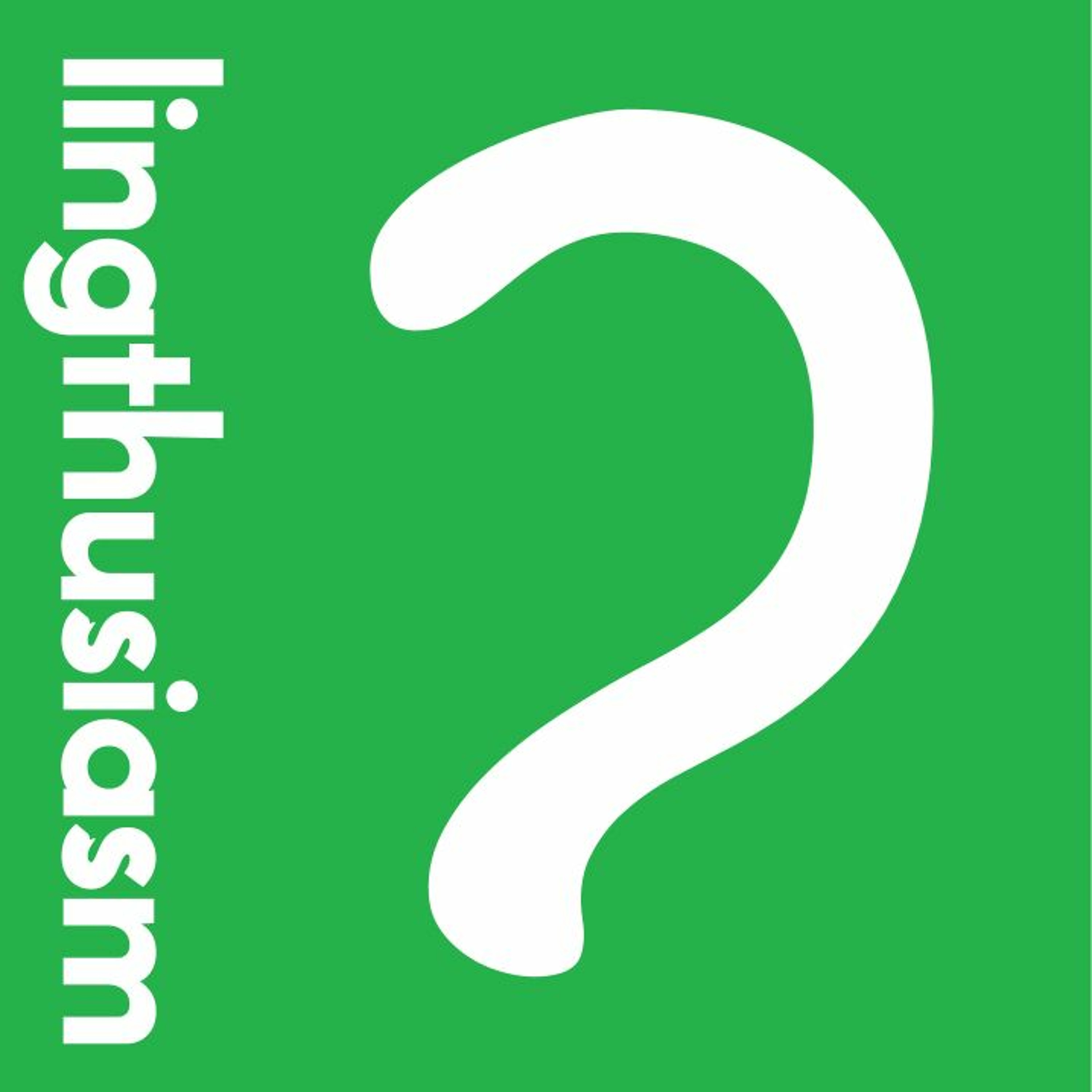 Lingthusiasm - A podcast that's enthusiastic about linguistics28: How languages influence each other - Hannah Gibson interview on Swahili, Rangi & Bantu languagesThe Rift Valley area of central and northern Tanzania is the only area where languages from all four African language families are found (Bantu, Cushitic, Nilotic, and Khoisan). Languages in this area have been in contact with each other for a long time, especially in the minds of bi- and multilingual speakers, so it’s a really interesting place to learn more about why and how languages influence each other.
In this episode, your host Lauren Gawne interviews Dr. Hannah Gibson, a Lecturer in the Department of Language and Linguistics at the University of Essex, about her work on how wo...2019-01-1835 min
Lingthusiasm - A podcast that's enthusiastic about linguistics28: How languages influence each other - Hannah Gibson interview on Swahili, Rangi & Bantu languagesThe Rift Valley area of central and northern Tanzania is the only area where languages from all four African language families are found (Bantu, Cushitic, Nilotic, and Khoisan). Languages in this area have been in contact with each other for a long time, especially in the minds of bi- and multilingual speakers, so it’s a really interesting place to learn more about why and how languages influence each other.
In this episode, your host Lauren Gawne interviews Dr. Hannah Gibson, a Lecturer in the Department of Language and Linguistics at the University of Essex, about her work on how wo...2019-01-1835 min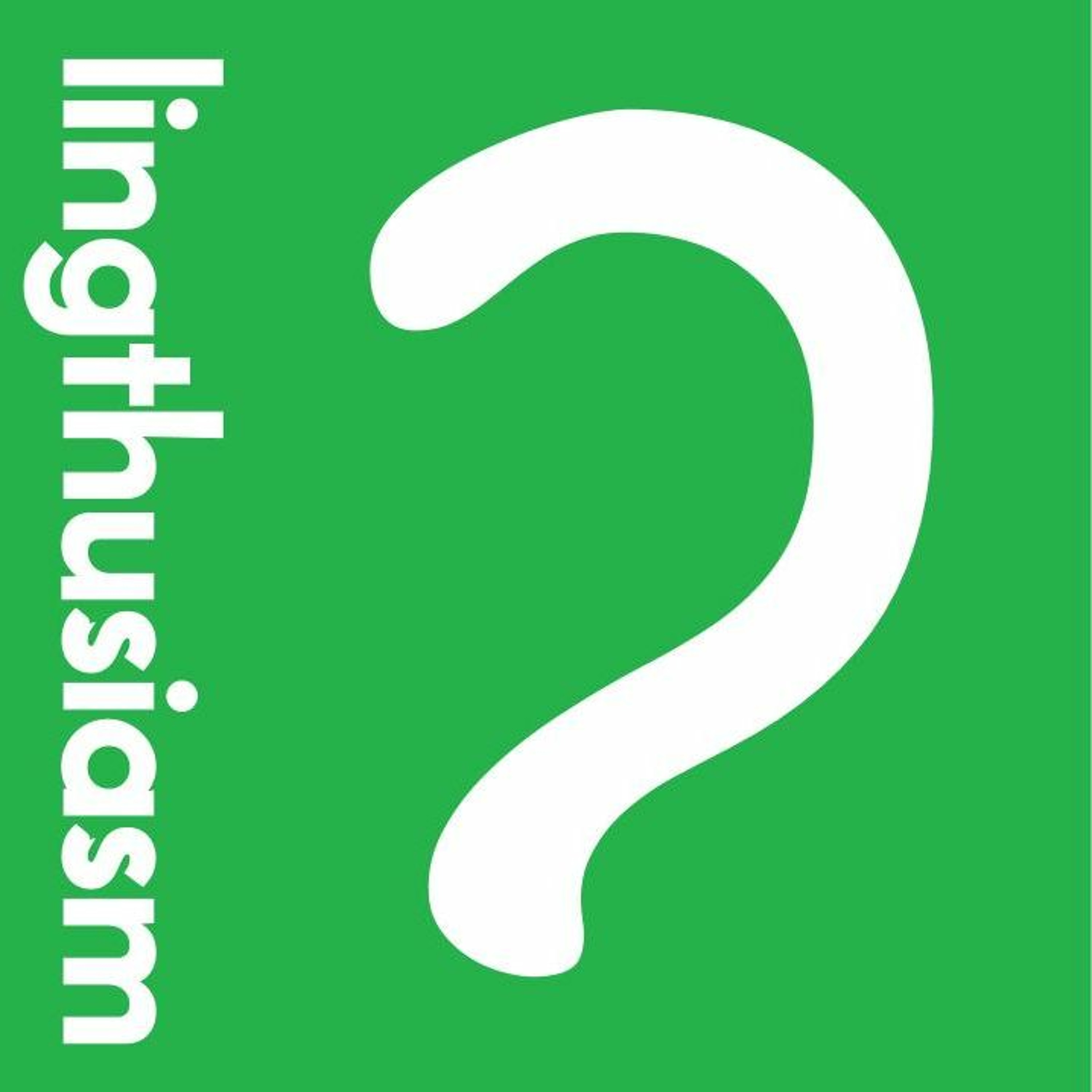 Lingthusiasm - A podcast that's enthusiastic about linguistics27: Words for family relationships: Kinship termsThere are certain things that human societies, and therefore languages, have in common. We have the same basic inventory of body parts, which affect both the kinds of movements we can make to produce words and the names we have for our meat-selves. We’re all living on a watery ball of rock and fire, orbiting a large ball of gas. And we all arrived on this planet by means of other humans, and form societies to help each other stick around. Sometimes, we even bring into existence further tiny humans.
In this episode, your hosts Lauren Gawne and Gretchen Mc...2018-12-2034 min
Lingthusiasm - A podcast that's enthusiastic about linguistics27: Words for family relationships: Kinship termsThere are certain things that human societies, and therefore languages, have in common. We have the same basic inventory of body parts, which affect both the kinds of movements we can make to produce words and the names we have for our meat-selves. We’re all living on a watery ball of rock and fire, orbiting a large ball of gas. And we all arrived on this planet by means of other humans, and form societies to help each other stick around. Sometimes, we even bring into existence further tiny humans.
In this episode, your hosts Lauren Gawne and Gretchen Mc...2018-12-2034 min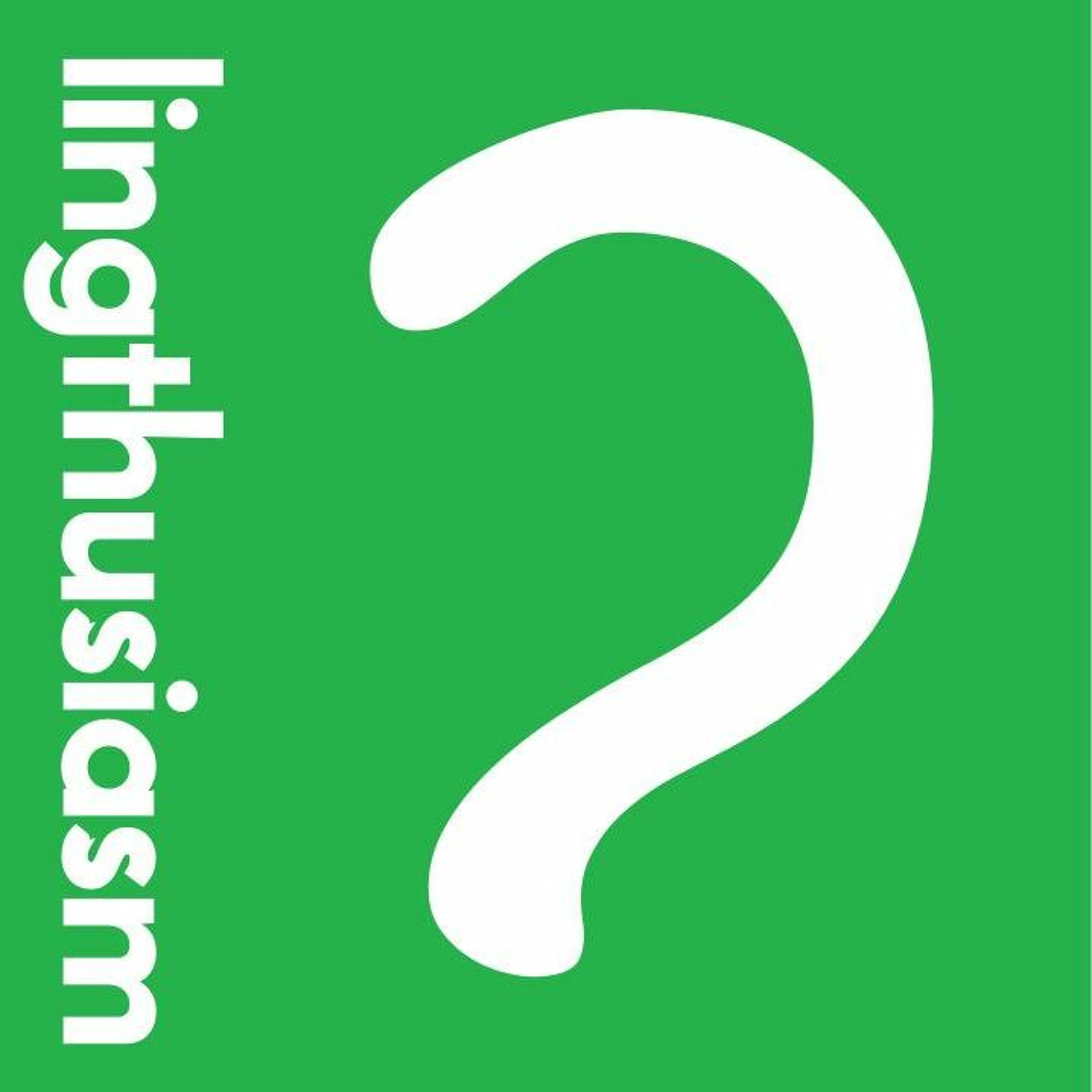 Lingthusiasm - A podcast that's enthusiastic about linguistics26: Why do C and G come in hard and soft versions? PalatalizationA letter stands for a sound. Or at least, it’s supposed to. Most of the time. Unless it’s C or G, which each stand for two different sounds in a whole bunch of languages. C can be soft, as in circus or acacia, or hard, as in the other C in circus or acacia. G can be hard, as in gif, or soft, as in gif.
Why can C and G be hard or soft? And why don’t other letters come in hard and soft versions?
In this episode of the podcast that’s enthusiastic about linguistics, your hos...2018-11-1634 min
Lingthusiasm - A podcast that's enthusiastic about linguistics26: Why do C and G come in hard and soft versions? PalatalizationA letter stands for a sound. Or at least, it’s supposed to. Most of the time. Unless it’s C or G, which each stand for two different sounds in a whole bunch of languages. C can be soft, as in circus or acacia, or hard, as in the other C in circus or acacia. G can be hard, as in gif, or soft, as in gif.
Why can C and G be hard or soft? And why don’t other letters come in hard and soft versions?
In this episode of the podcast that’s enthusiastic about linguistics, your hos...2018-11-1634 min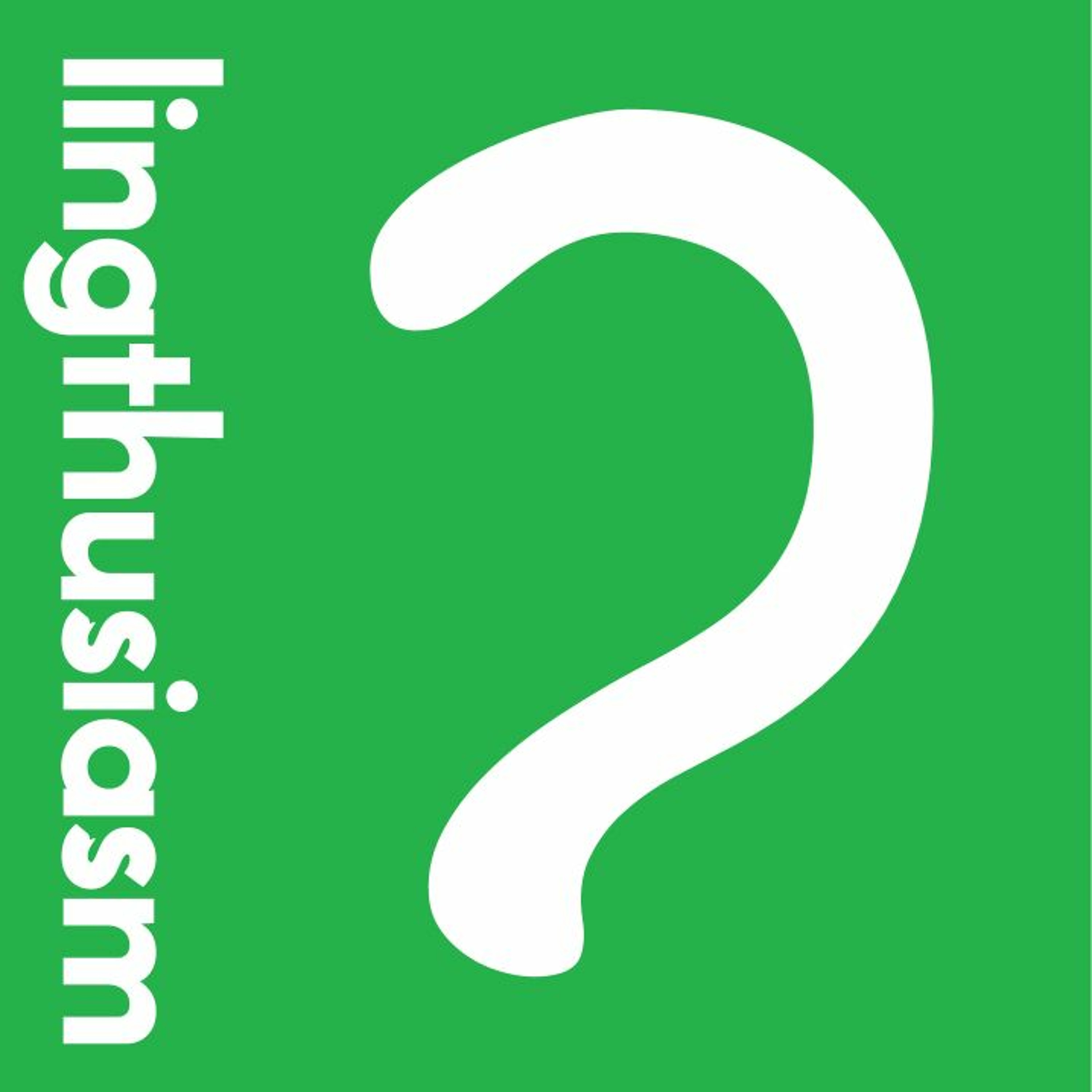 Lingthusiasm - A podcast that's enthusiastic about linguistics25: Every word is a real wordsquishable, blobfish, aaarggghh, gubernatorial, apple lovers, ain’t, tronc, wug, toast, toast, toast, toast, toast.
All of these are words that someone, somewhere has asserted aren’t real words – or maybe aren’t even words at all. But we don’t point at a chair or a tree and assert that it’s not a word. Of course it’s not! That would be absurd. So why, then, do people feel called to question the wordhood of actual words?
In this episode of the funnest* podcast about linguistics, your hosts Lauren Gawne and Gretchen McCulloch take you on a tour through what’s...2018-10-1937 min
Lingthusiasm - A podcast that's enthusiastic about linguistics25: Every word is a real wordsquishable, blobfish, aaarggghh, gubernatorial, apple lovers, ain’t, tronc, wug, toast, toast, toast, toast, toast.
All of these are words that someone, somewhere has asserted aren’t real words – or maybe aren’t even words at all. But we don’t point at a chair or a tree and assert that it’s not a word. Of course it’s not! That would be absurd. So why, then, do people feel called to question the wordhood of actual words?
In this episode of the funnest* podcast about linguistics, your hosts Lauren Gawne and Gretchen McCulloch take you on a tour through what’s...2018-10-1937 min Lingthusiasm - A podcast that's enthusiastic about linguistics23: When nothing means somethingWhen we think about language, we generally think about things that are visible or audible: letters, sounds, signs, words, symbols, sentences. We don’t often think about the lack of anything. But little bits of silence or invisibility are found surprisingly often throughout our linguistic system, from the micro level of an individual sound or bit of meaning to the macro level of sentences and conversations.
In this episode of the podcast that’s enthusiastic about linguistics, your hosts Lauren Gawne and Gretchen McCulloch get enthusiastic about four different kinds of linguistic nothings: silence in between turns, silence in between soun...2018-08-1735 min
Lingthusiasm - A podcast that's enthusiastic about linguistics23: When nothing means somethingWhen we think about language, we generally think about things that are visible or audible: letters, sounds, signs, words, symbols, sentences. We don’t often think about the lack of anything. But little bits of silence or invisibility are found surprisingly often throughout our linguistic system, from the micro level of an individual sound or bit of meaning to the macro level of sentences and conversations.
In this episode of the podcast that’s enthusiastic about linguistics, your hosts Lauren Gawne and Gretchen McCulloch get enthusiastic about four different kinds of linguistic nothings: silence in between turns, silence in between soun...2018-08-1735 min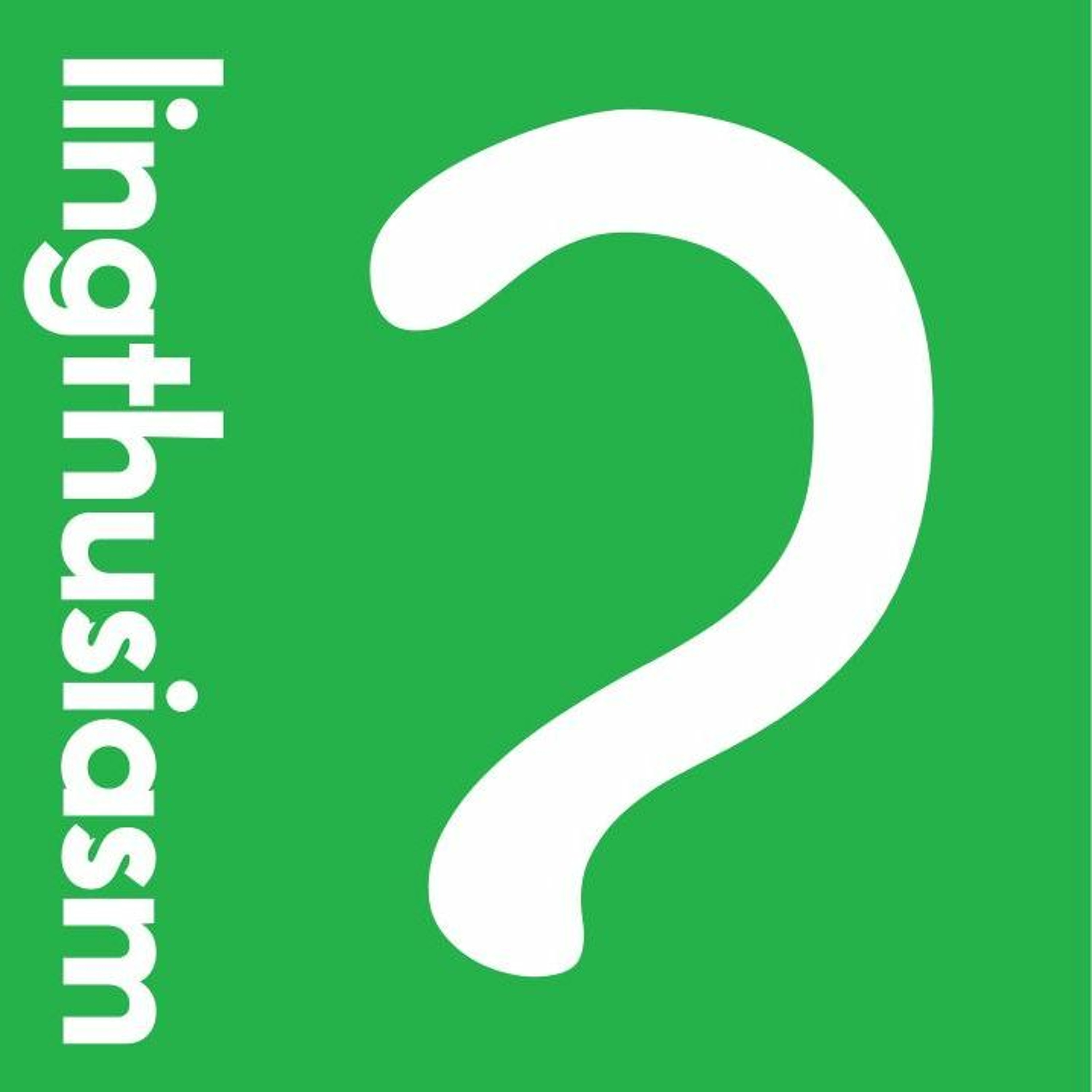 Lingthusiasm - A podcast that's enthusiastic about linguistics22: This, that and the other thing - DeterminersWhen linguists think about complicated words, we don’t think about rare, two-dollar words like “defenestration”. Instead, we think about the kinds of words that you use all the time without even thinking about it, like “the”. You might not already know that defenestration refers to throwing something out of a window, but once you find out, it’s easy to explain. But what does “the” mean? And, for that matter, what kind of a word even is “the”?
If you think back to when you learned about nouns and verbs, you might have been told that “the” was an article. But this brings...2018-07-1936 min
Lingthusiasm - A podcast that's enthusiastic about linguistics22: This, that and the other thing - DeterminersWhen linguists think about complicated words, we don’t think about rare, two-dollar words like “defenestration”. Instead, we think about the kinds of words that you use all the time without even thinking about it, like “the”. You might not already know that defenestration refers to throwing something out of a window, but once you find out, it’s easy to explain. But what does “the” mean? And, for that matter, what kind of a word even is “the”?
If you think back to when you learned about nouns and verbs, you might have been told that “the” was an article. But this brings...2018-07-1936 min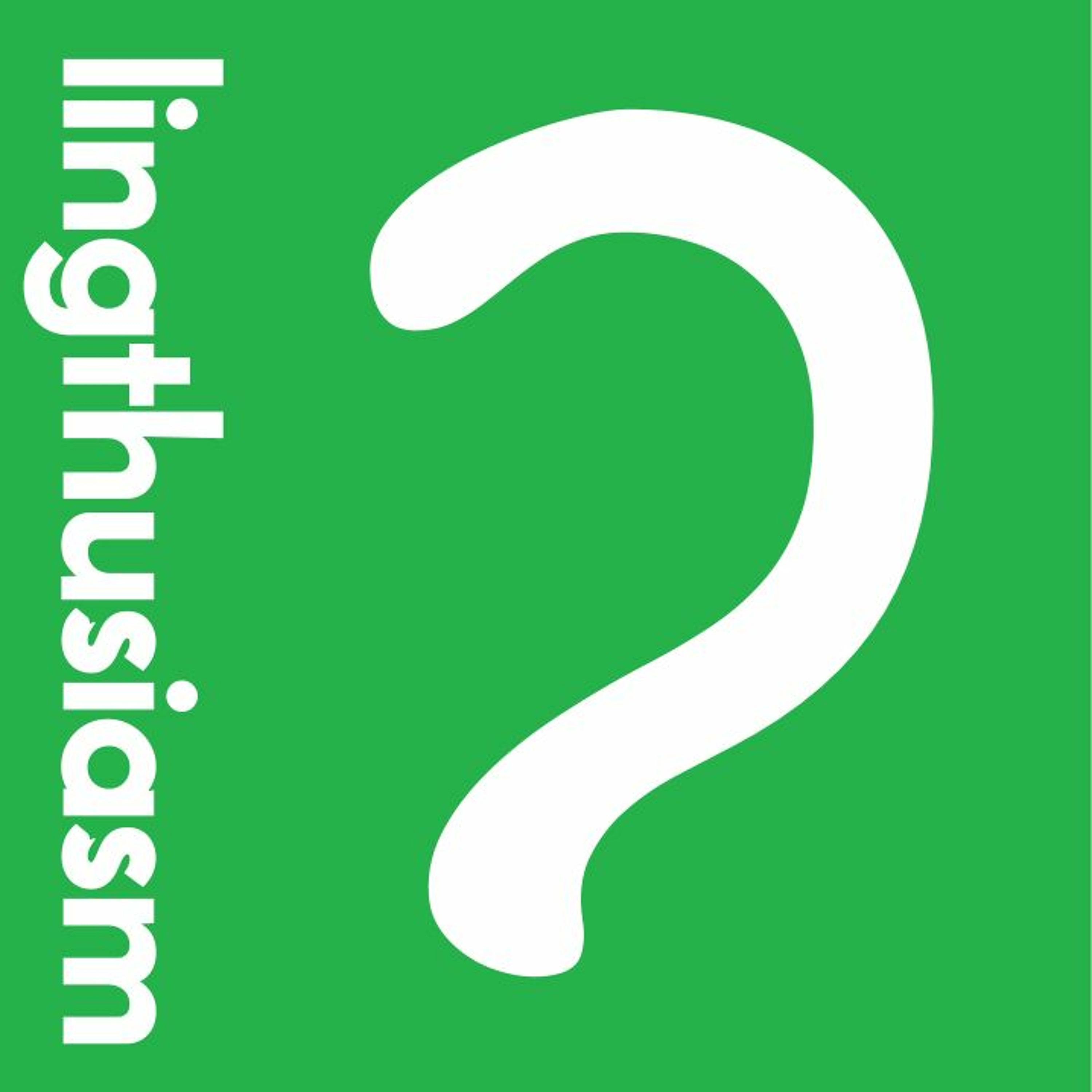 Lingthusiasm - A podcast that's enthusiastic about linguistics21: What words sound spiky across languages? Interview with Suzy StylesMost of the time, a word is an arbitrary label: there’s no particular reason why a cat has to be associated with the particular string of sounds in the word “cat”, and indeed other languages have different words for the same animal. But sometimes it may not be so arbitrary. Take these two shapes: a sharp, spiky 🗯 and a soft, rounded 💭 and these two names: “bouba” and “kiki”. If you had to assign one name to each shape, which would you pick?
(Here’s a pause to let you think about it.)
If you said that the spiky shape was kiki and the round...2018-06-2237 min
Lingthusiasm - A podcast that's enthusiastic about linguistics21: What words sound spiky across languages? Interview with Suzy StylesMost of the time, a word is an arbitrary label: there’s no particular reason why a cat has to be associated with the particular string of sounds in the word “cat”, and indeed other languages have different words for the same animal. But sometimes it may not be so arbitrary. Take these two shapes: a sharp, spiky 🗯 and a soft, rounded 💭 and these two names: “bouba” and “kiki”. If you had to assign one name to each shape, which would you pick?
(Here’s a pause to let you think about it.)
If you said that the spiky shape was kiki and the round...2018-06-2237 min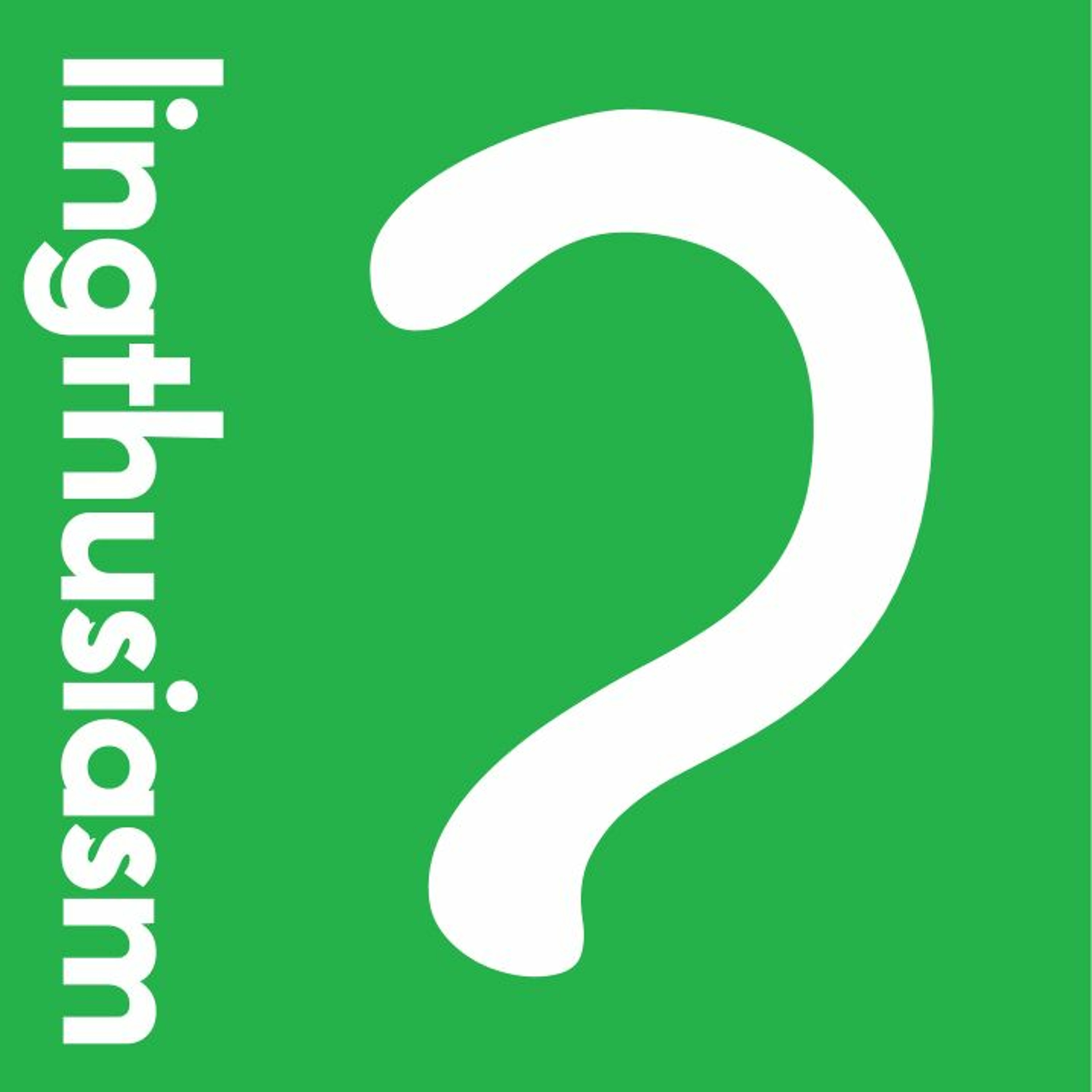 Lingthusiasm - A podcast that's enthusiastic about linguistics20: Speaking Canadian and Australian English in a British-American binaryAustralian and Canadian English don’t sound much alike, but they have one big similarity: they’re both national varieties that tend to get overshadowed by their more famous siblings.
In this episode of Lingthusiasm, your hosts Lauren Gawne and Gretchen McCulloch use Lynne Murphy’s new book The Prodigal Tongue as a guide to the sometimes prickly relationship between the globally dominant British and American varieties of English, give a mini history of English in our own countries, and discuss our national quests to find space between and around US and UK nationlects.
On the way, we ask the big, c...2018-05-1738 min
Lingthusiasm - A podcast that's enthusiastic about linguistics20: Speaking Canadian and Australian English in a British-American binaryAustralian and Canadian English don’t sound much alike, but they have one big similarity: they’re both national varieties that tend to get overshadowed by their more famous siblings.
In this episode of Lingthusiasm, your hosts Lauren Gawne and Gretchen McCulloch use Lynne Murphy’s new book The Prodigal Tongue as a guide to the sometimes prickly relationship between the globally dominant British and American varieties of English, give a mini history of English in our own countries, and discuss our national quests to find space between and around US and UK nationlects.
On the way, we ask the big, c...2018-05-1738 min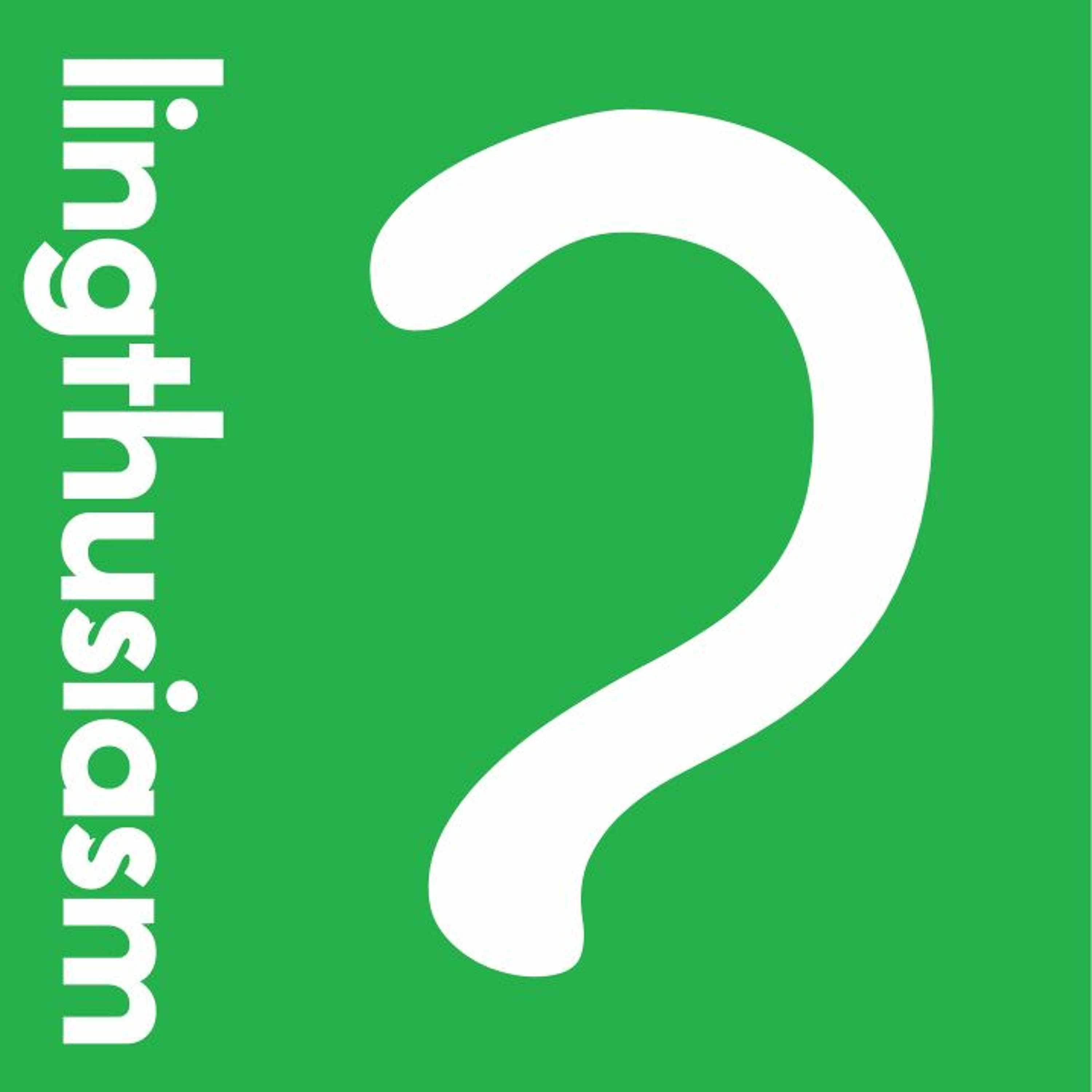 Lingthusiasm - A podcast that's enthusiastic about linguistics19: Sentences with baggage - PresuppositionsWhat’s so weird if I say, “the present King of France is bald” or “I need to pick up my pet unicorn from the vet”? It seems like those sentences should be false: at least, they certainly can’t be true. But if you reply, “No, he isn’t” or “No, you don’t” it still feels unsatisfying: aren’t we still both assuming that France has a king and that I have a pet unicorn?
In this episode of Lingthusiasm, your hosts Lauren Gawne and Gretchen McCulloch explore different kinds of meanings: sometimes sentences wear their meaning on their sleeves, but sometim...2018-04-1936 min
Lingthusiasm - A podcast that's enthusiastic about linguistics19: Sentences with baggage - PresuppositionsWhat’s so weird if I say, “the present King of France is bald” or “I need to pick up my pet unicorn from the vet”? It seems like those sentences should be false: at least, they certainly can’t be true. But if you reply, “No, he isn’t” or “No, you don’t” it still feels unsatisfying: aren’t we still both assuming that France has a king and that I have a pet unicorn?
In this episode of Lingthusiasm, your hosts Lauren Gawne and Gretchen McCulloch explore different kinds of meanings: sometimes sentences wear their meaning on their sleeves, but sometim...2018-04-1936 min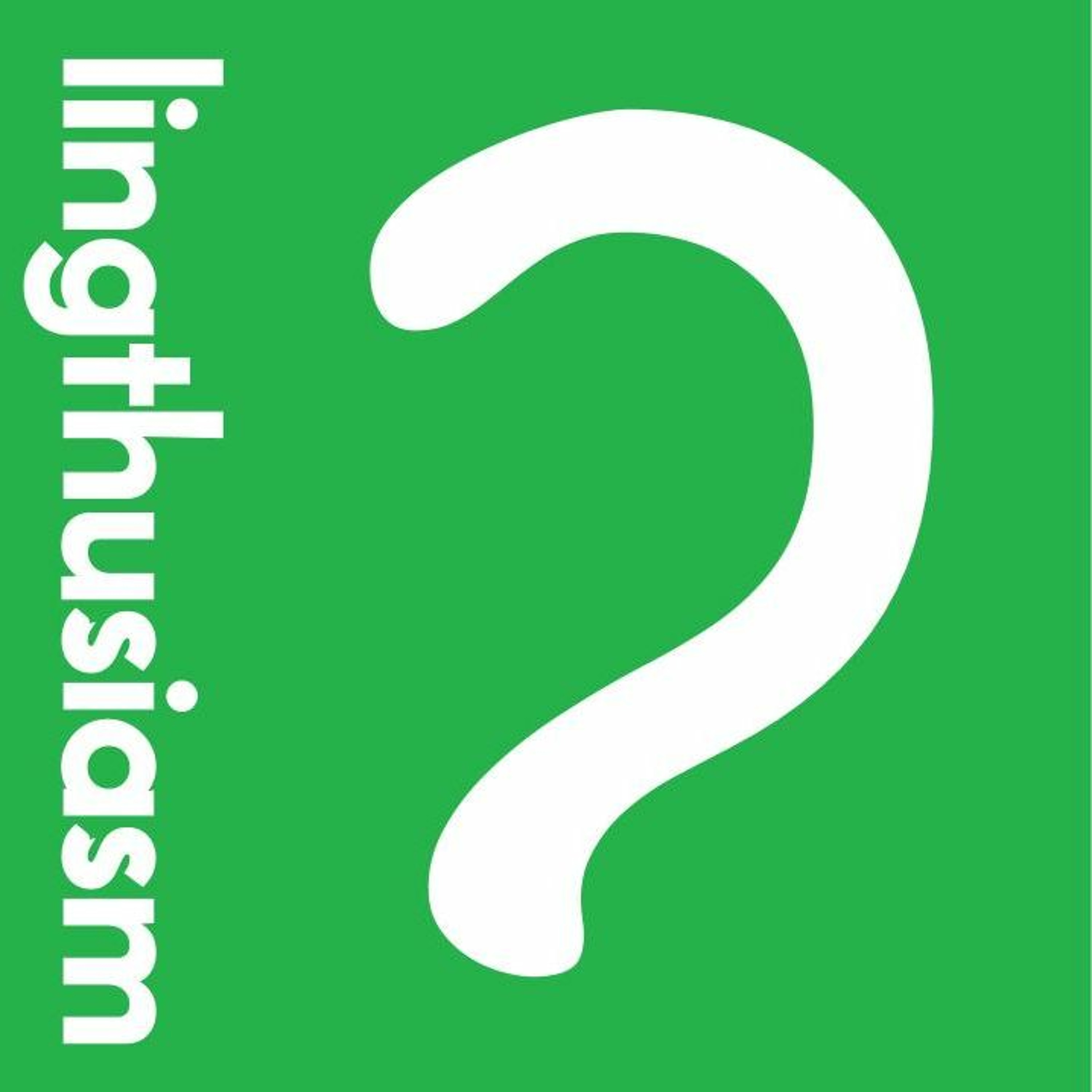 Lingthusiasm - A podcast that's enthusiastic about linguistics18: Translating the untranslatableLists of ‘untranslatable’ words always come with... translations. So what do people really mean when they say a word is untranslatable?
In this episode, your hosts Lauren Gawne and Gretchen McCulloch explore how how we translate different kinds of meaning. What makes words like schadenfreude, tsundoku, and hygge so compelling? Which parts of language are actually the most difficult to translate? What does it say about English speakers that we have a word for “tricking someone into watching a video of Rick Astley singing Never Gonna Give You Up?”
This month’s Patreon bonus episode is about the grammar of swearing...2018-03-1638 min
Lingthusiasm - A podcast that's enthusiastic about linguistics18: Translating the untranslatableLists of ‘untranslatable’ words always come with... translations. So what do people really mean when they say a word is untranslatable?
In this episode, your hosts Lauren Gawne and Gretchen McCulloch explore how how we translate different kinds of meaning. What makes words like schadenfreude, tsundoku, and hygge so compelling? Which parts of language are actually the most difficult to translate? What does it say about English speakers that we have a word for “tricking someone into watching a video of Rick Astley singing Never Gonna Give You Up?”
This month’s Patreon bonus episode is about the grammar of swearing...2018-03-1638 min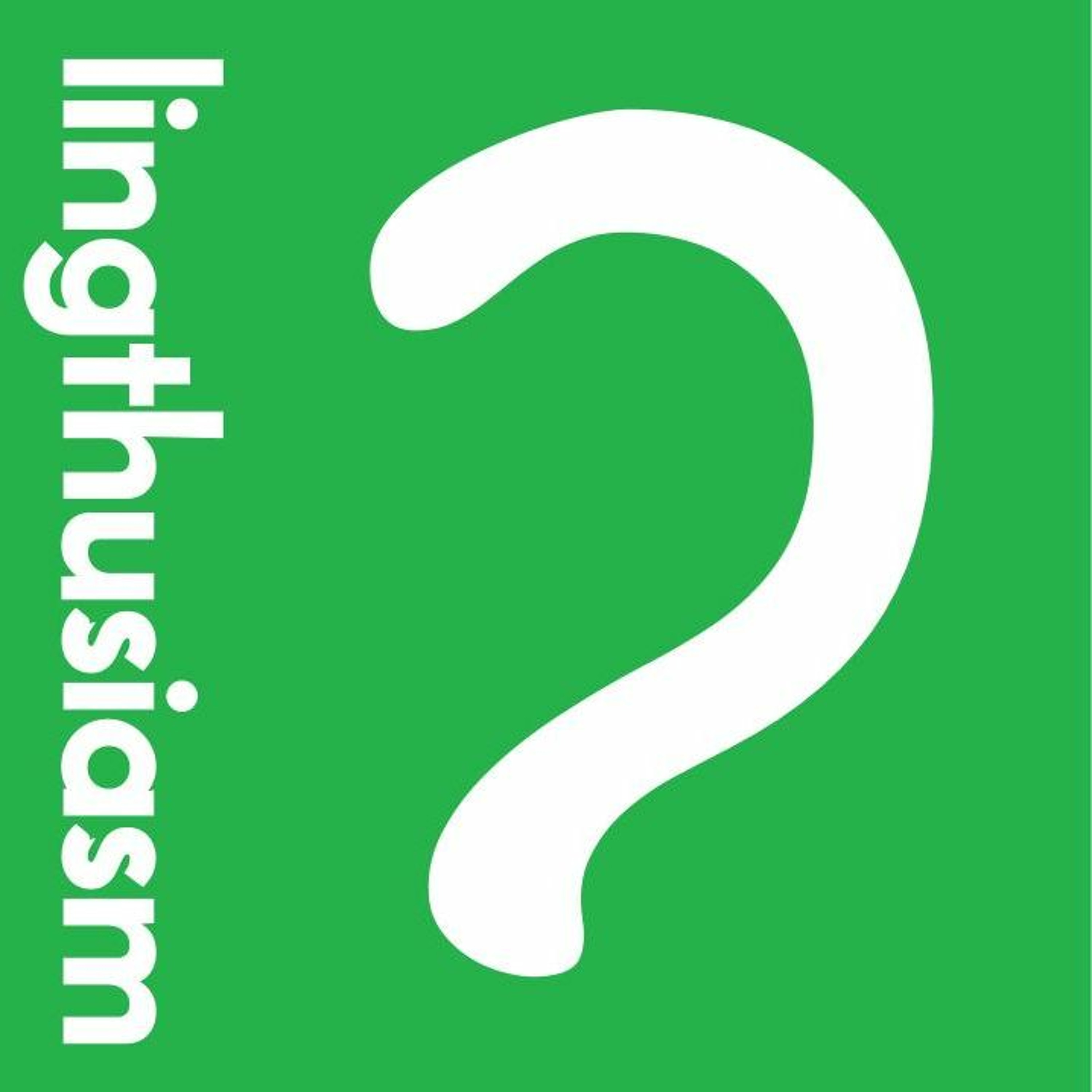 Lingthusiasm - A podcast that's enthusiastic about linguistics17: Vowel GymnasticsSay, “aaaaaahhhh…..” Now try going smoothly from one vowel to another, without pausing: “aaaaaaaeeeeeeeiiiiiii”. Feel how your tongue moves in relation to the back of the roof of your mouth as you move from one vowel to the next. When you say “ahhhh” like at the dentist, your tongue is low and far back and your mouth is all the way open. If you say “cheeeeese” like in a photo, your tongue is higher up and further forward, and your mouth is more closed: it’s a lot harder for the dentist to see your molars.
In this episode, your hosts Lauren Gawne a...2018-02-1539 min
Lingthusiasm - A podcast that's enthusiastic about linguistics17: Vowel GymnasticsSay, “aaaaaahhhh…..” Now try going smoothly from one vowel to another, without pausing: “aaaaaaaeeeeeeeiiiiiii”. Feel how your tongue moves in relation to the back of the roof of your mouth as you move from one vowel to the next. When you say “ahhhh” like at the dentist, your tongue is low and far back and your mouth is all the way open. If you say “cheeeeese” like in a photo, your tongue is higher up and further forward, and your mouth is more closed: it’s a lot harder for the dentist to see your molars.
In this episode, your hosts Lauren Gawne a...2018-02-1539 min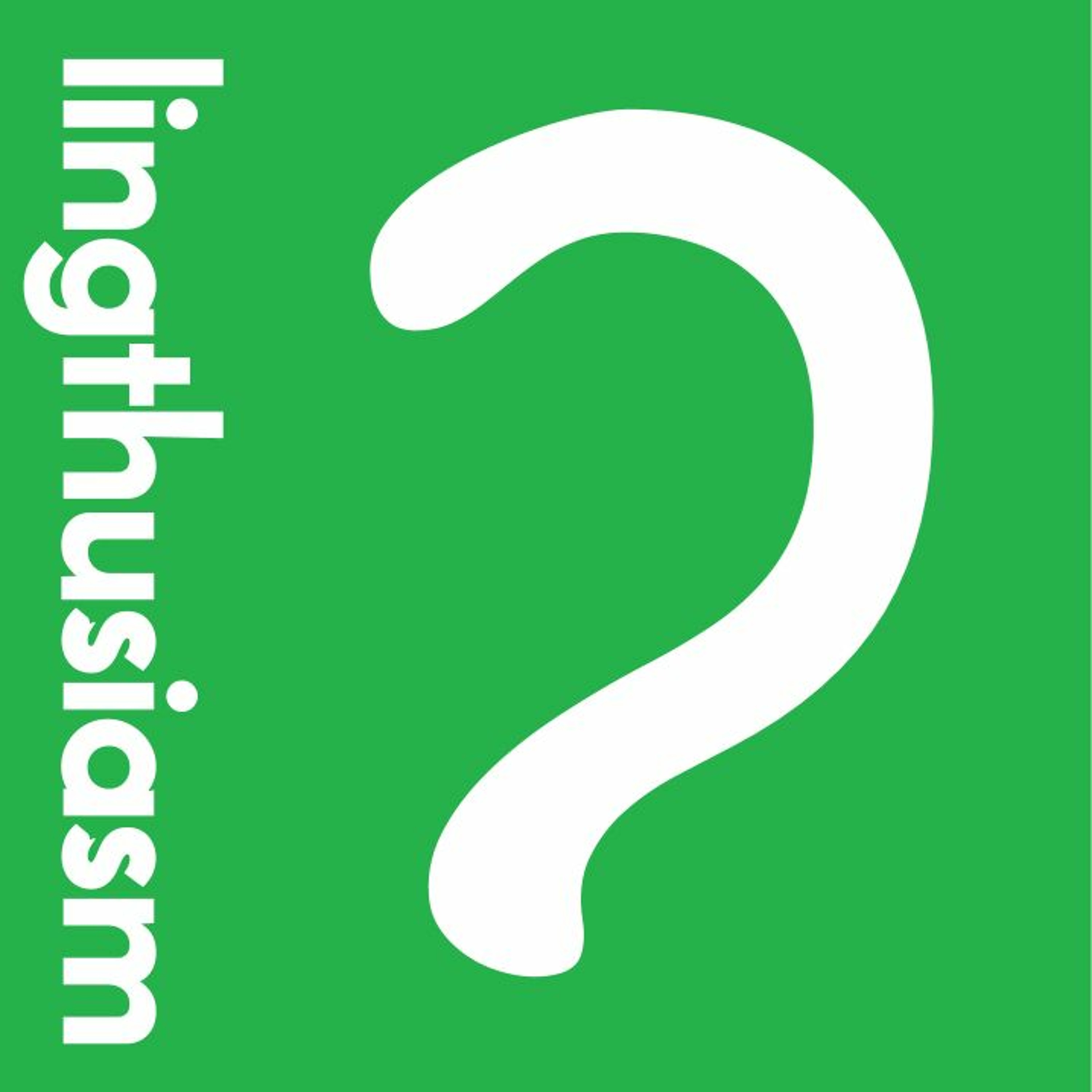 Lingthusiasm - A podcast that's enthusiastic about linguistics16: Learning parts of words - Morphemes and the wug testHere’s a strange little blue animal you’ve never seen before. It’s called a wug. Now here’s another one. There are two of them. There are two ___?
You probably thought “wugs” – and even kids as young as 3 years old would agree with you. But how did you know this, if you’ve never heard the word “wug” before? What is it that you know, exactly, when you know how to add that -s?
Now try saying two cat__ 🐈🐈, two dog__ 🐕🐕 and two horse__ 🐎🐎. Why did you end up with catssss but dogzzzz, and have to add a whole extra syllable to horse?
In thi...2018-01-1933 min
Lingthusiasm - A podcast that's enthusiastic about linguistics16: Learning parts of words - Morphemes and the wug testHere’s a strange little blue animal you’ve never seen before. It’s called a wug. Now here’s another one. There are two of them. There are two ___?
You probably thought “wugs” – and even kids as young as 3 years old would agree with you. But how did you know this, if you’ve never heard the word “wug” before? What is it that you know, exactly, when you know how to add that -s?
Now try saying two cat__ 🐈🐈, two dog__ 🐕🐕 and two horse__ 🐎🐎. Why did you end up with catssss but dogzzzz, and have to add a whole extra syllable to horse?
In thi...2018-01-1933 min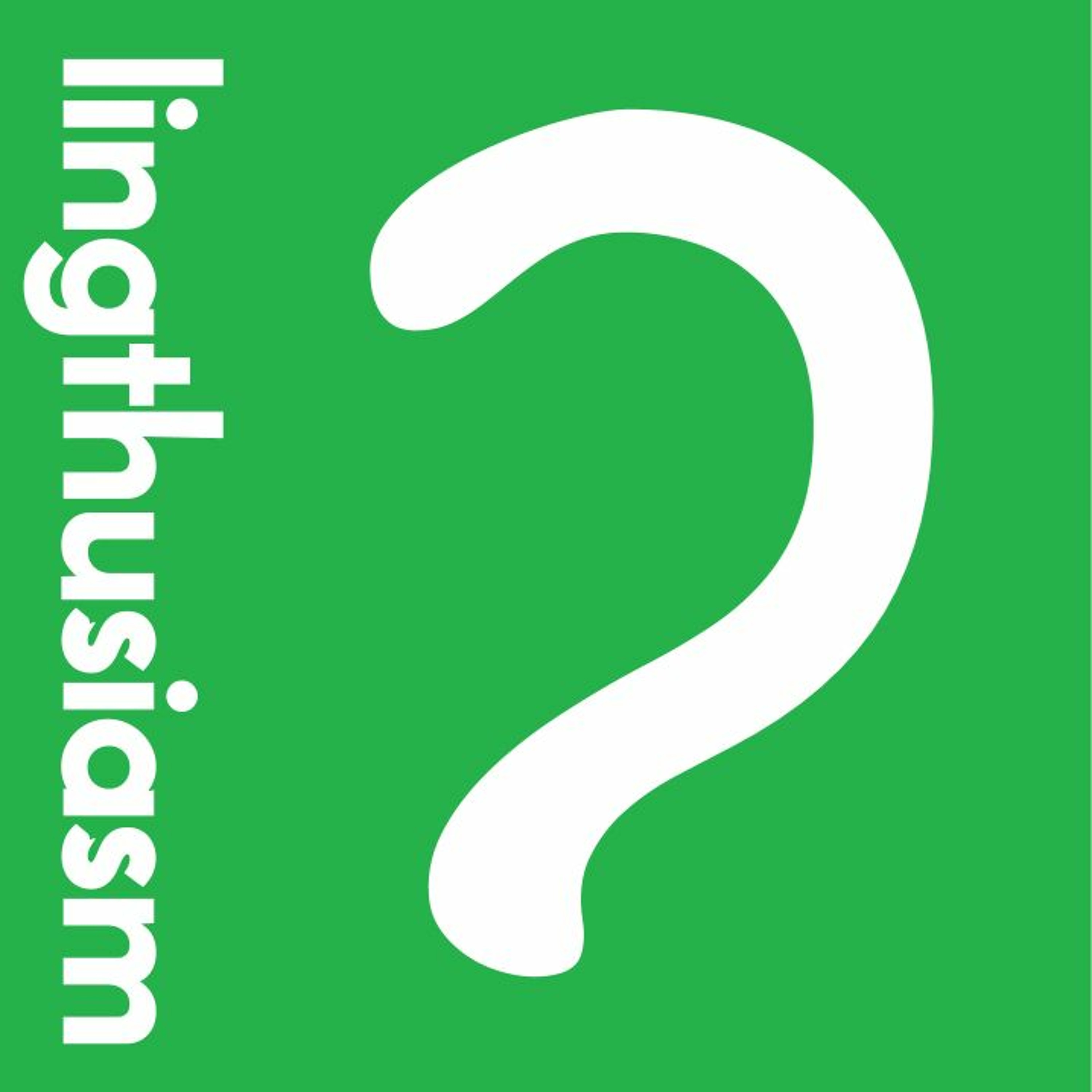 Lingthusiasm - A podcast that's enthusiastic about linguistics14: Getting into, up for, and down with prepositionsAre you up for some prepositions? You might think you’re over prepositions, but have you ever really looked into them, or have you just gone by them? Other parts of speech notwithstanding, prepositions are something we’re really down with.
In Episode 14 of Lingthusiasm, your hosts Gretchen McCulloch and Lauren Gawne introduce you to our favourite English grammar book, the mammoth, 1800-page Cambridge Grammar of the English Language (affectionately known as CGEL), and take a deep dive into its 60+ pages all about prepositions. We also explore how it is that a grammar can even have sixty pages of things to s...2017-11-1736 min
Lingthusiasm - A podcast that's enthusiastic about linguistics14: Getting into, up for, and down with prepositionsAre you up for some prepositions? You might think you’re over prepositions, but have you ever really looked into them, or have you just gone by them? Other parts of speech notwithstanding, prepositions are something we’re really down with.
In Episode 14 of Lingthusiasm, your hosts Gretchen McCulloch and Lauren Gawne introduce you to our favourite English grammar book, the mammoth, 1800-page Cambridge Grammar of the English Language (affectionately known as CGEL), and take a deep dive into its 60+ pages all about prepositions. We also explore how it is that a grammar can even have sixty pages of things to s...2017-11-1736 min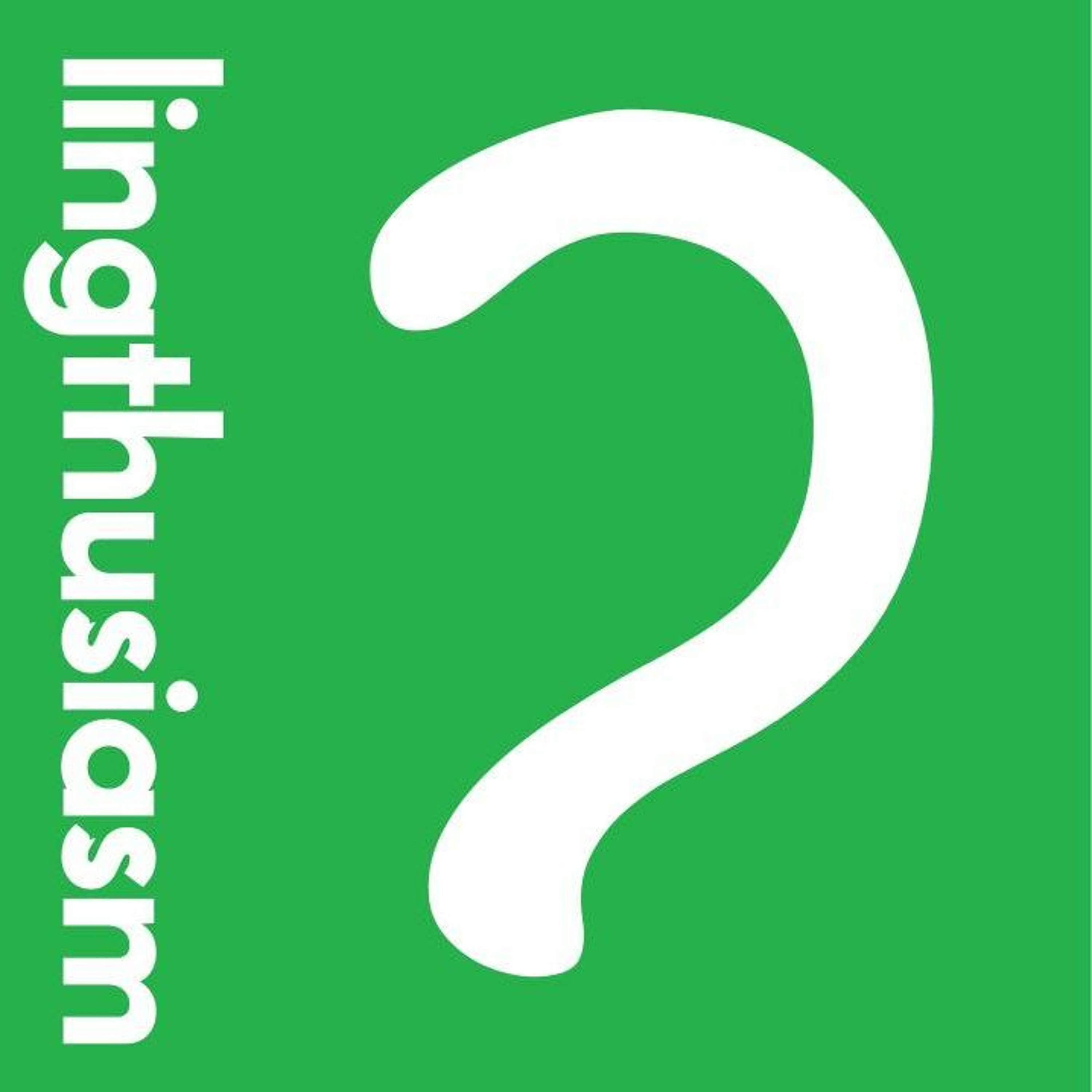 Lingthusiasm - A podcast that's enthusiastic about linguistics12: Sounds you can’t hear - Babies, accents, and phonemesWhy does it always sound slightly off when someone tries to imitate your accent? Why do tiny children learning your second language already sound better than you, even though you’ve been learning it longer than they’ve been alive? What does it mean for there to be sounds you can’t hear?
In Episode 12 of Lingthusiasm, your hosts Lauren Gawne and Gretchen McCulloch explore the fundamental linguistic insight at the heart of all these questions: the phoneme. We also talk about how to bore babies (for science!), how sounds appear and disappear in a language, and how to retain our se...2017-09-2129 min
Lingthusiasm - A podcast that's enthusiastic about linguistics12: Sounds you can’t hear - Babies, accents, and phonemesWhy does it always sound slightly off when someone tries to imitate your accent? Why do tiny children learning your second language already sound better than you, even though you’ve been learning it longer than they’ve been alive? What does it mean for there to be sounds you can’t hear?
In Episode 12 of Lingthusiasm, your hosts Lauren Gawne and Gretchen McCulloch explore the fundamental linguistic insight at the heart of all these questions: the phoneme. We also talk about how to bore babies (for science!), how sounds appear and disappear in a language, and how to retain our se...2017-09-2129 min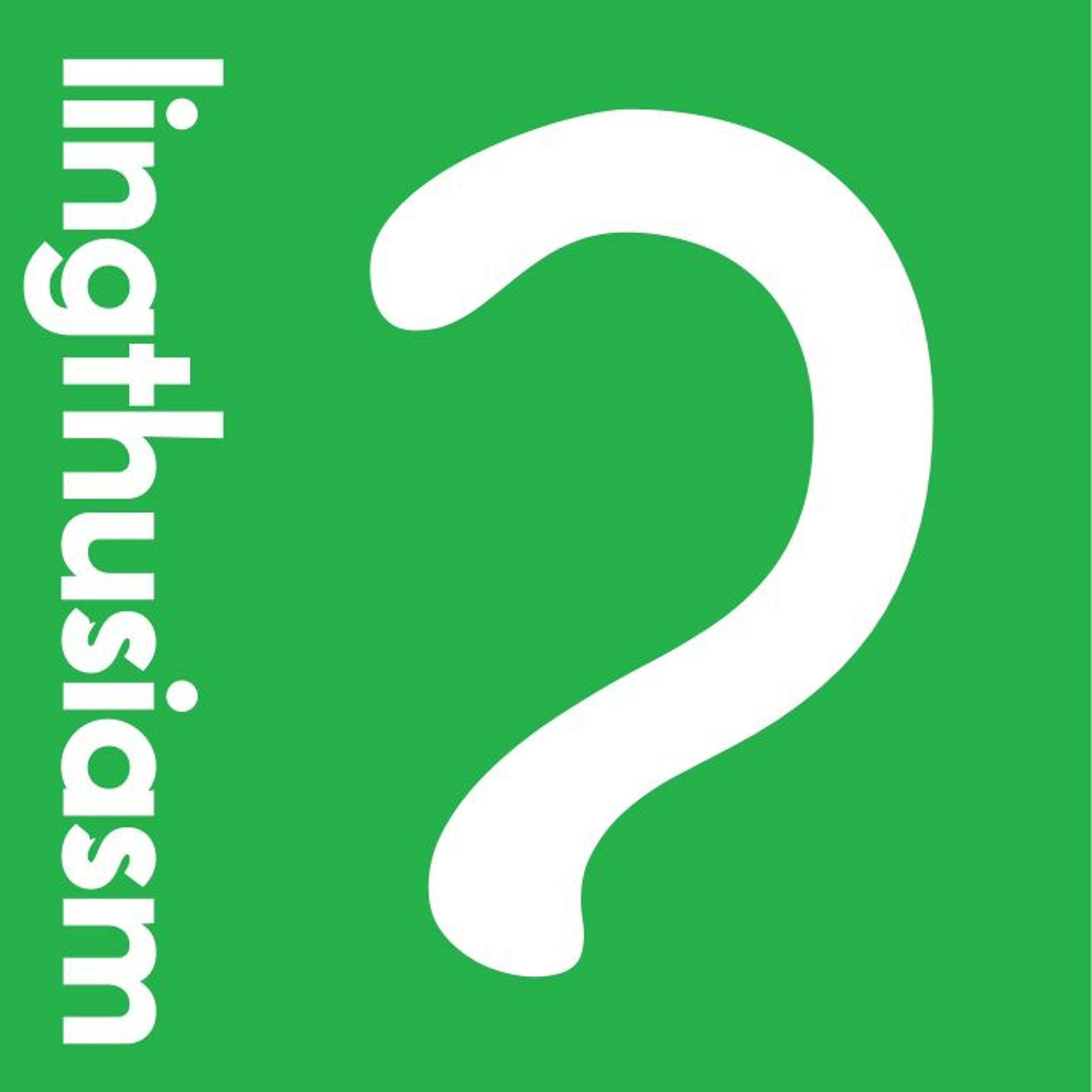 Lingthusiasm - A podcast that's enthusiastic about linguistics11: Layers of meaning - Cooperation, humour, and Gricean Maxims– Would you like some coffee?
– Coffee would keep me awake.
Does that mean yes coffee, or no coffee? It depends! Is it the morning or the evening? Is the person trying to pull an all-nighter or take an afternoon nap? A computer looking strictly at the meanings of the words would be confused, but we humans do this kind of thing all the time without even noticing it.
In episode 11 of Lingthusiasm, your hosts Gretchen McCulloch and Lauren Gawne talk about the hidden assumptions of cooperation that we bring to every conversation. They were formulated by the linguist Paul Grice, and...2017-08-1733 min
Lingthusiasm - A podcast that's enthusiastic about linguistics11: Layers of meaning - Cooperation, humour, and Gricean Maxims– Would you like some coffee?
– Coffee would keep me awake.
Does that mean yes coffee, or no coffee? It depends! Is it the morning or the evening? Is the person trying to pull an all-nighter or take an afternoon nap? A computer looking strictly at the meanings of the words would be confused, but we humans do this kind of thing all the time without even noticing it.
In episode 11 of Lingthusiasm, your hosts Gretchen McCulloch and Lauren Gawne talk about the hidden assumptions of cooperation that we bring to every conversation. They were formulated by the linguist Paul Grice, and...2017-08-1733 min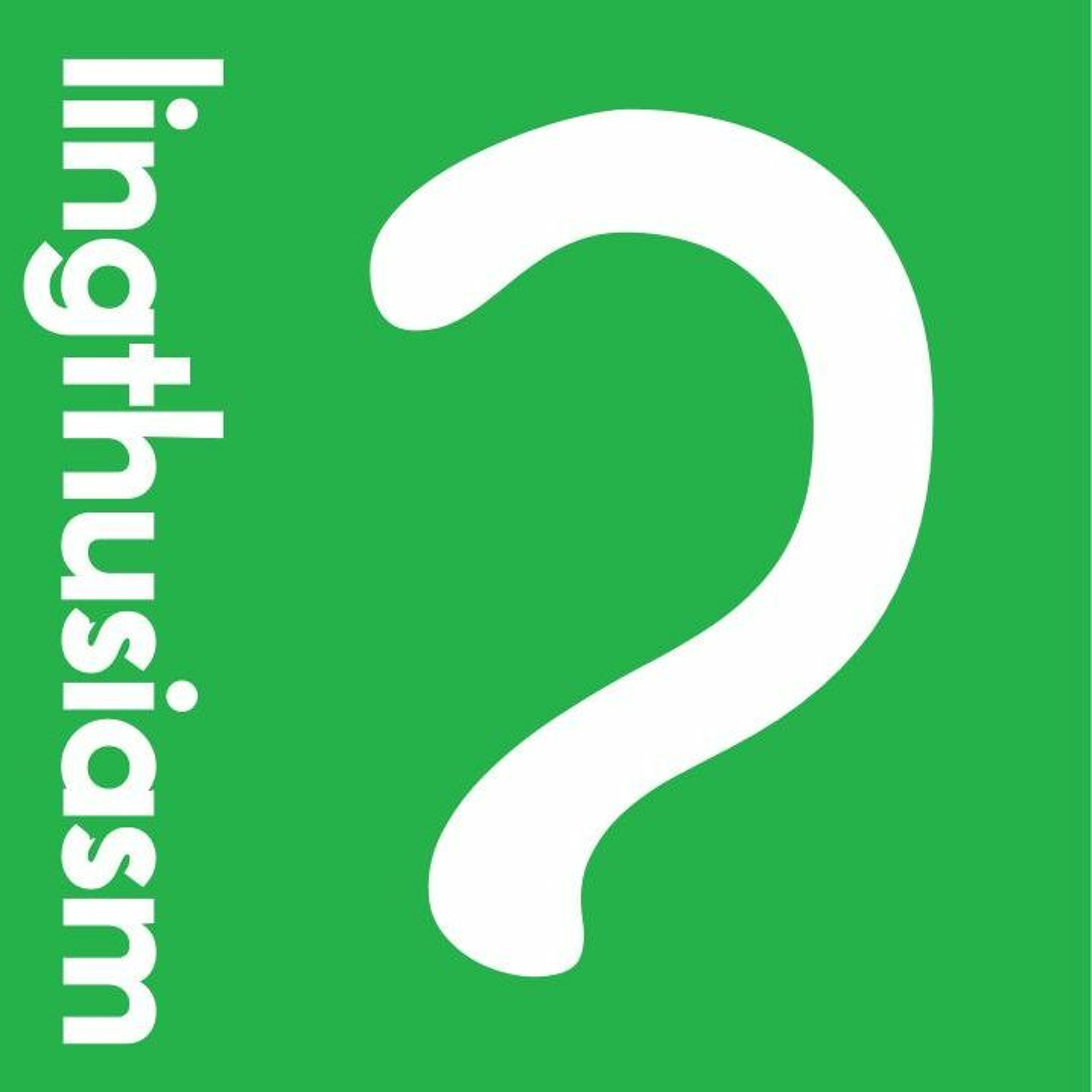 Lingthusiasm - A podcast that's enthusiastic about linguistics10: Learning languages linguisticallySome linguists work with multiple languages, while others focus on just one. But for many people, learning a language after early childhood is the thing that first gets them curious about how language works in general and all the things in their native language(s) that they take for granted.
In episode 10 of Lingthusiasm, your hosts Gretchen McCulloch and Lauren Gawne talk about how learning languages can feed into linguistics and vice versa. We also explore the power dynamics that affect learning languages, and the importance of learning about the rules of interaction as well as the rules of grammar.
...2017-07-2038 min
Lingthusiasm - A podcast that's enthusiastic about linguistics10: Learning languages linguisticallySome linguists work with multiple languages, while others focus on just one. But for many people, learning a language after early childhood is the thing that first gets them curious about how language works in general and all the things in their native language(s) that they take for granted.
In episode 10 of Lingthusiasm, your hosts Gretchen McCulloch and Lauren Gawne talk about how learning languages can feed into linguistics and vice versa. We also explore the power dynamics that affect learning languages, and the importance of learning about the rules of interaction as well as the rules of grammar.
...2017-07-2038 min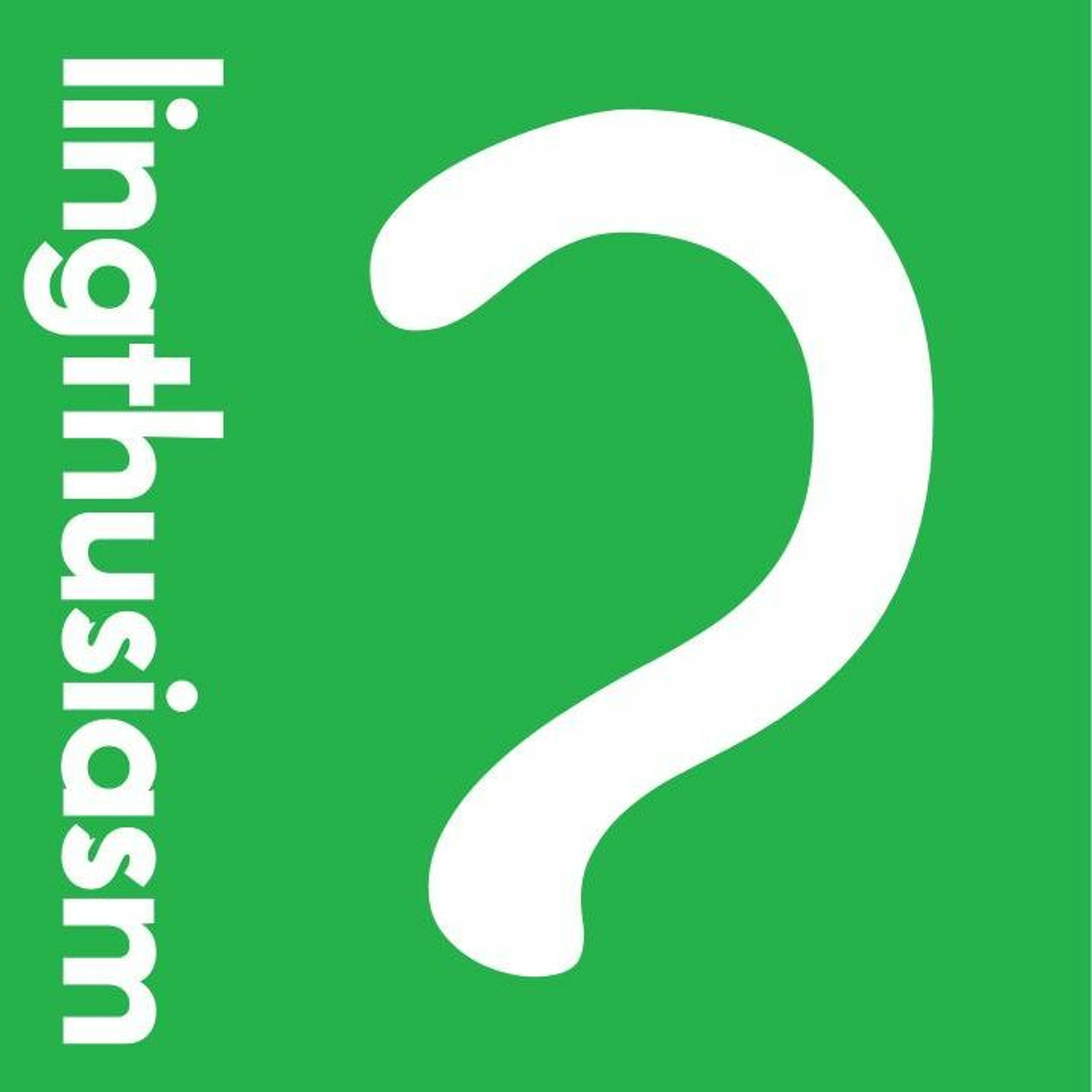 Lingthusiasm - A podcast that's enthusiastic about linguistics09: The bridge between words and sentences - ConstituencyHow do we get from knowing words to making brand-new sentences out of them? In episode 9 of Lingthusiasm, your hosts Gretchen McCulloch and Lauren Gawne talk about how words form groups with other words: constituency.
Once you start looking for it, constituency is everywhere: in ambiguous sentences like “time flies like an arrow; fruit flies like a banana”, in remixed films like “Of Oz The Wizard”, and even internet dog memes.
This month’s Patreon bonus was the backstory about the linguistics of the doggo meme and its connection to Australian slang, which grew out of this NPR article about doggo. You...2017-06-1539 min
Lingthusiasm - A podcast that's enthusiastic about linguistics09: The bridge between words and sentences - ConstituencyHow do we get from knowing words to making brand-new sentences out of them? In episode 9 of Lingthusiasm, your hosts Gretchen McCulloch and Lauren Gawne talk about how words form groups with other words: constituency.
Once you start looking for it, constituency is everywhere: in ambiguous sentences like “time flies like an arrow; fruit flies like a banana”, in remixed films like “Of Oz The Wizard”, and even internet dog memes.
This month’s Patreon bonus was the backstory about the linguistics of the doggo meme and its connection to Australian slang, which grew out of this NPR article about doggo. You...2017-06-1539 min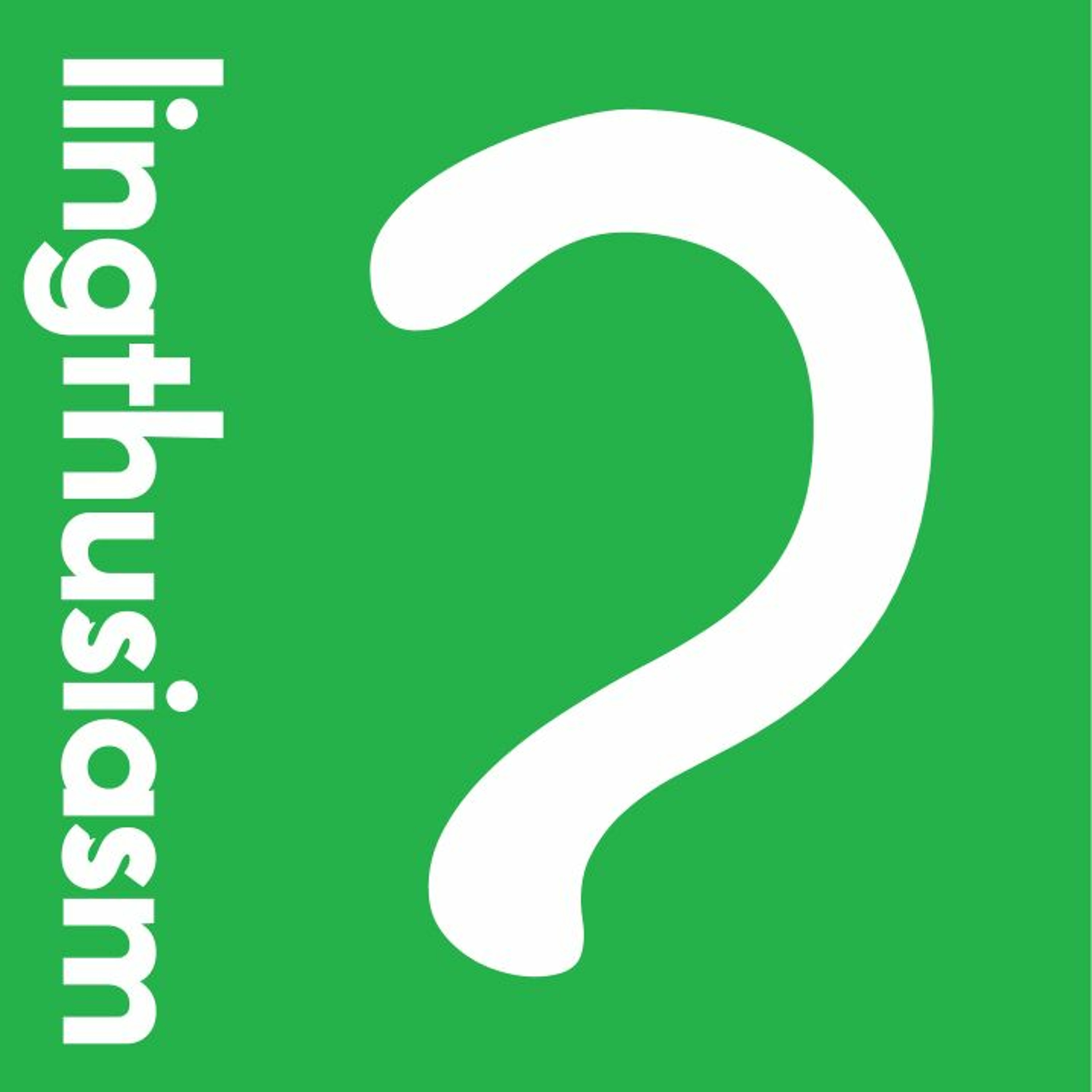 Lingthusiasm - A podcast that's enthusiastic about linguistics08: People who make dictionariesDictionaries: they’re made by real people!
In episode 8 of Lingthusiasm, your hosts Lauren Gawne and Gretchen McCulloch talk about Word by Word, a recent book by Kory Stamper, a lexicographer at Merriam-Webster, about how dictionaries get made. (Spoiler: we liked it.) We also talk about how dictionaries get made for languages that don’t have any yet, the changing role of dictionaries on the internet and with social media, and how words often have a longer history than we expect (’g-string’, for example has been in use since at least 1878).
Our latest Patreon bonus is about selling your linguistics skills t...2017-05-1831 min
Lingthusiasm - A podcast that's enthusiastic about linguistics08: People who make dictionariesDictionaries: they’re made by real people!
In episode 8 of Lingthusiasm, your hosts Lauren Gawne and Gretchen McCulloch talk about Word by Word, a recent book by Kory Stamper, a lexicographer at Merriam-Webster, about how dictionaries get made. (Spoiler: we liked it.) We also talk about how dictionaries get made for languages that don’t have any yet, the changing role of dictionaries on the internet and with social media, and how words often have a longer history than we expect (’g-string’, for example has been in use since at least 1878).
Our latest Patreon bonus is about selling your linguistics skills t...2017-05-1831 min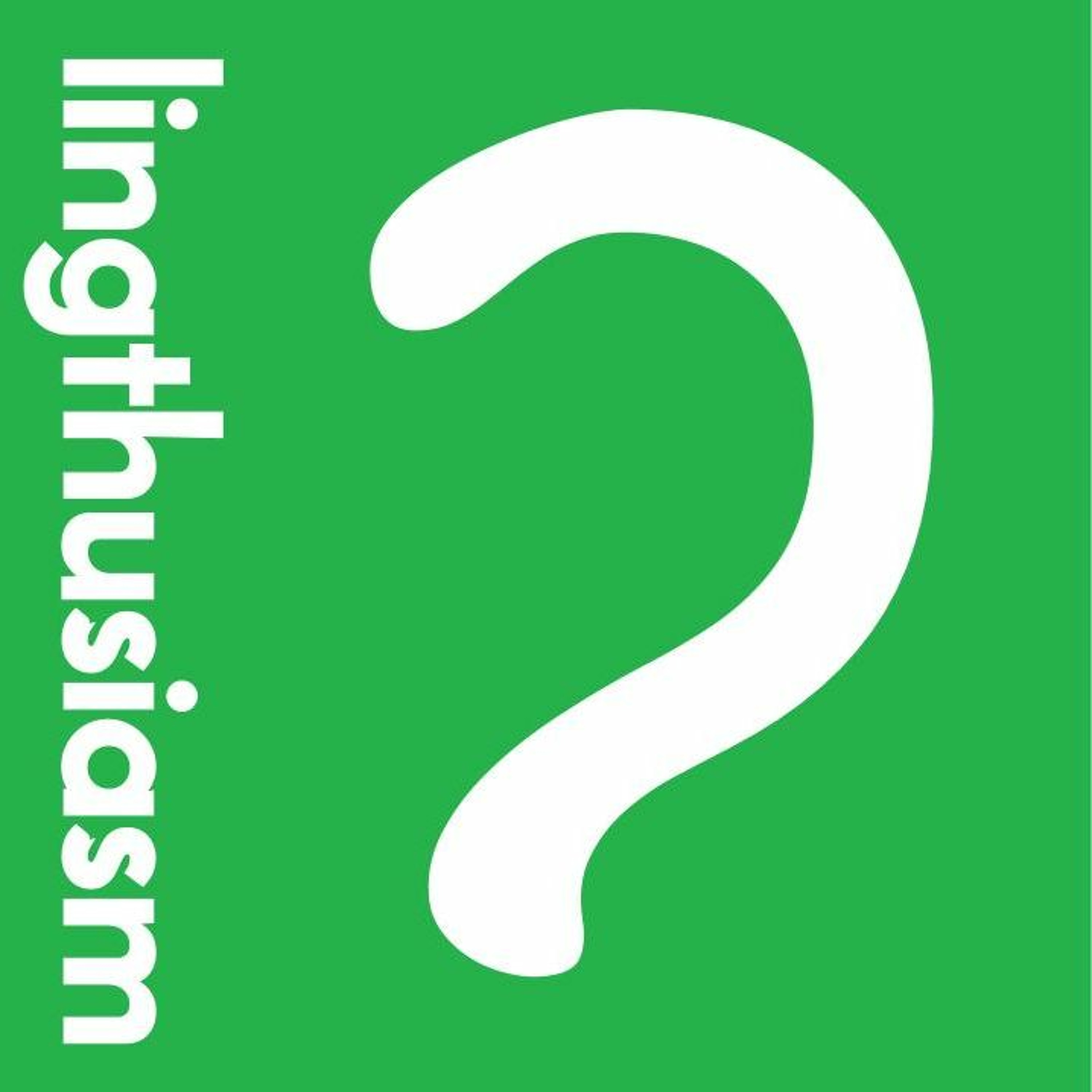 Lingthusiasm - A podcast that's enthusiastic about linguistics07: Kids these days aren’t ruining languageThere are some pretty funny quotes of historical people complaining about kids back then doing linguistic things that now seem totally unremarkable. So let’s cut to the chase and celebrate linguistic innovation while it’s happening.
In episode 7 of Lingthusiasm, your hosts Lauren Gawne and Gretchen McCulloch explore how far back we can trace complaints about the language of Kids These Days, why linguistic discrimination is harmful, and why “be like”, hyperbolic “literally”, and other modern innovations are actually signs of something awesome.
We also announce a Patreon to keep the podcast sustainable! You can support us there to listen to a...2017-04-2036 min
Lingthusiasm - A podcast that's enthusiastic about linguistics07: Kids these days aren’t ruining languageThere are some pretty funny quotes of historical people complaining about kids back then doing linguistic things that now seem totally unremarkable. So let’s cut to the chase and celebrate linguistic innovation while it’s happening.
In episode 7 of Lingthusiasm, your hosts Lauren Gawne and Gretchen McCulloch explore how far back we can trace complaints about the language of Kids These Days, why linguistic discrimination is harmful, and why “be like”, hyperbolic “literally”, and other modern innovations are actually signs of something awesome.
We also announce a Patreon to keep the podcast sustainable! You can support us there to listen to a...2017-04-2036 min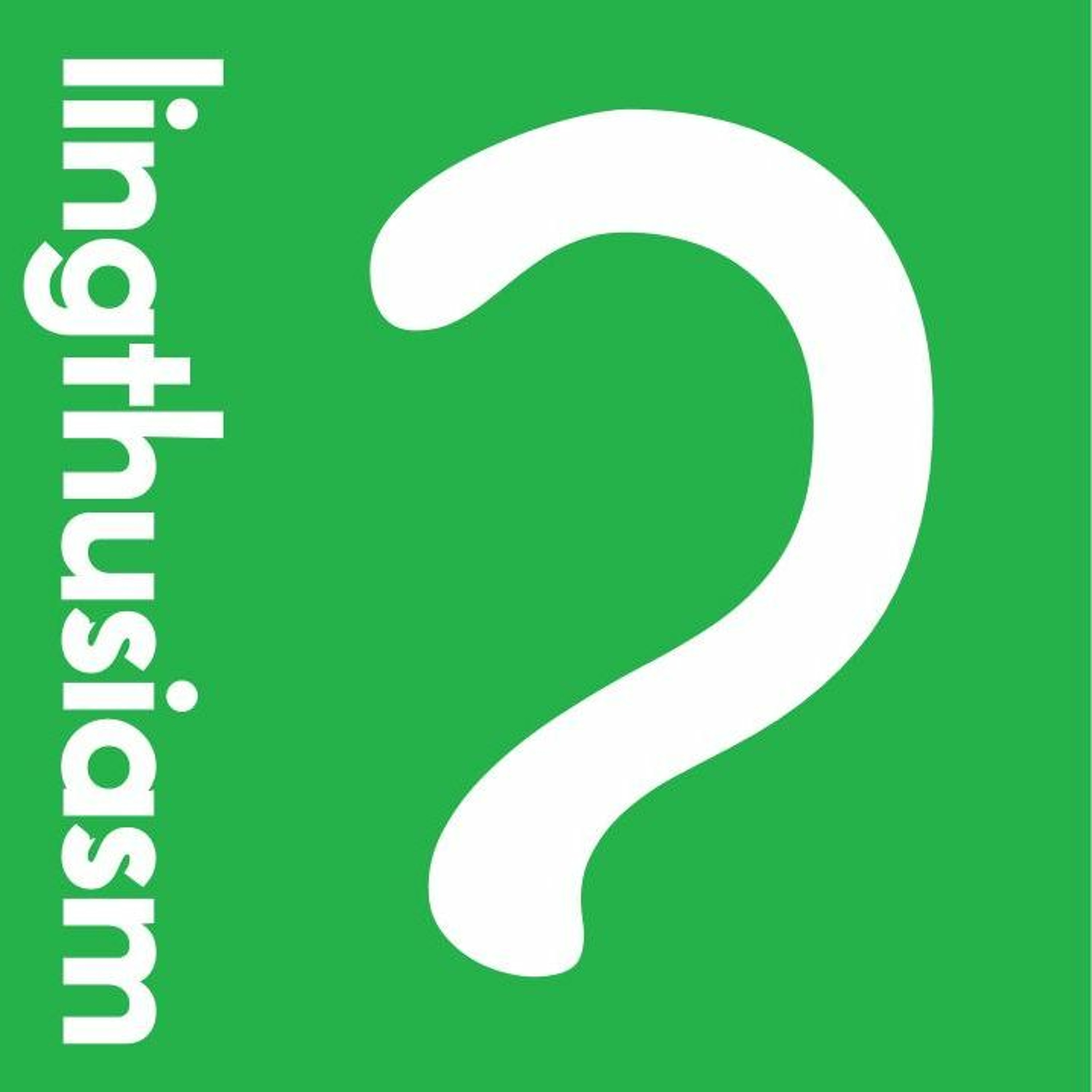 Lingthusiasm - A podcast that's enthusiastic about linguistics02: Pronouns. Little words, big jobsIf there are pronouns, why aren’t there connouns? What’s the point of these little words?
In this episode of the podcast that’s enthusiastic about linguistics, your hosts Gretchen McCulloch and Lauren Gawne take a look at the many functions of pronouns. We discuss the vastly different pronoun systems in different languages, how you’d need to change English pronouns to make it easier to write gay polyamorous fanfiction, and why everyone is getting excited about singular ‘they’ these days (despite the fact that it’s really old).
We also talk about the Lingthusiasm logo, the three things that the squig...2016-12-1333 min
Lingthusiasm - A podcast that's enthusiastic about linguistics02: Pronouns. Little words, big jobsIf there are pronouns, why aren’t there connouns? What’s the point of these little words?
In this episode of the podcast that’s enthusiastic about linguistics, your hosts Gretchen McCulloch and Lauren Gawne take a look at the many functions of pronouns. We discuss the vastly different pronoun systems in different languages, how you’d need to change English pronouns to make it easier to write gay polyamorous fanfiction, and why everyone is getting excited about singular ‘they’ these days (despite the fact that it’s really old).
We also talk about the Lingthusiasm logo, the three things that the squig...2016-12-1333 min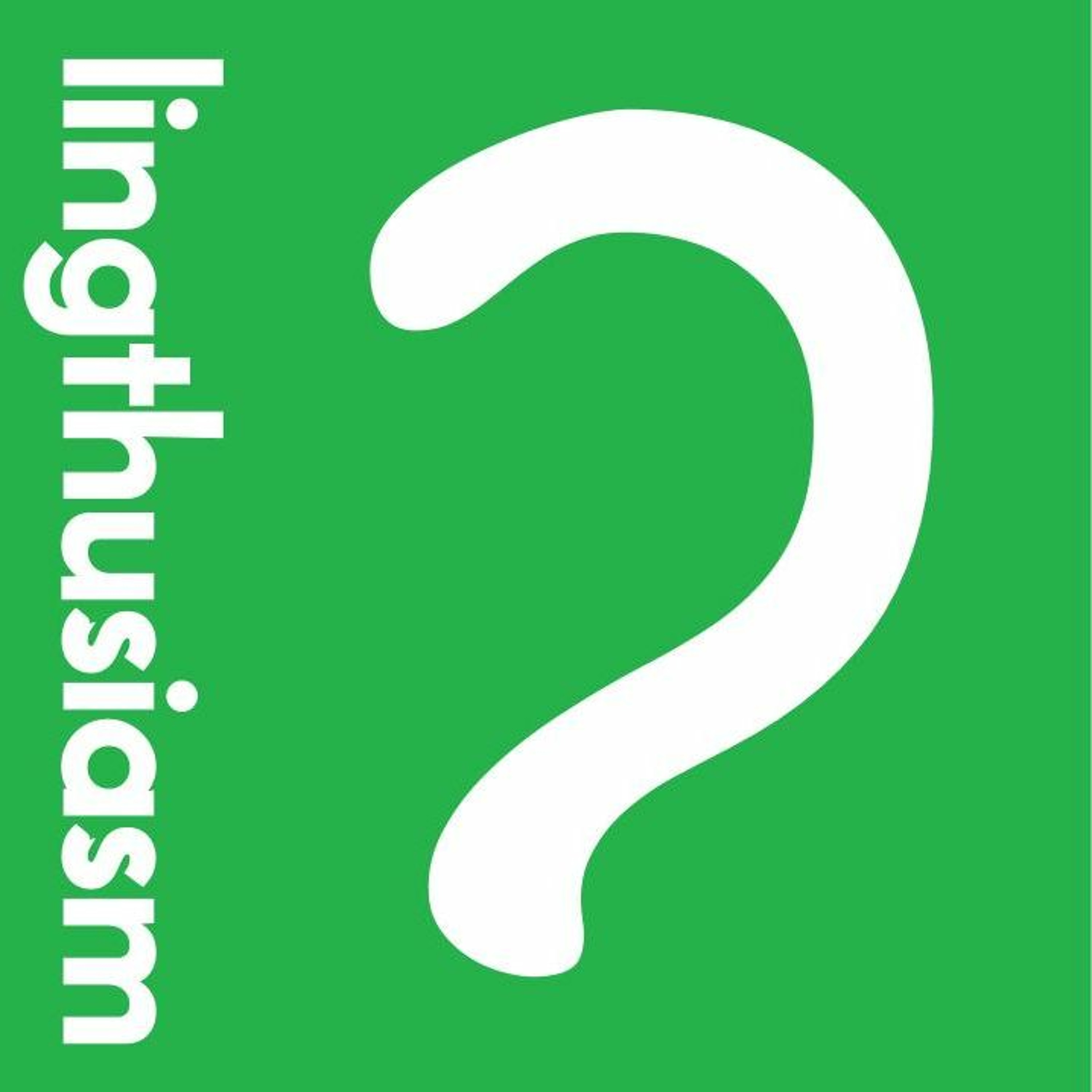 Lingthusiasm - A podcast that's enthusiastic about linguistics01: Speaking a single language won’t bring about world peaceWouldn’t it solve so many problems in the world if everyone just spoke the same language? Not so fast!
Lingthusiasm is a brand-new podcast that’s enthusiastic about linguistics, hosted by Lauren Gawne of Superlinguo and Gretchen McCulloch of All Things Linguistic.
In this first episode of Lingthusiasm, Gretchen and Lauren discuss the “one language equals peace” fallacy, and whether speaking the same words means that people will necessarily agree with each other (spoiler: no). But the history of how people have tried is still really interesting, from constructed and symbolic communication like Blissymbols and emoji to the way astronauts c...2016-12-1331 min
Lingthusiasm - A podcast that's enthusiastic about linguistics01: Speaking a single language won’t bring about world peaceWouldn’t it solve so many problems in the world if everyone just spoke the same language? Not so fast!
Lingthusiasm is a brand-new podcast that’s enthusiastic about linguistics, hosted by Lauren Gawne of Superlinguo and Gretchen McCulloch of All Things Linguistic.
In this first episode of Lingthusiasm, Gretchen and Lauren discuss the “one language equals peace” fallacy, and whether speaking the same words means that people will necessarily agree with each other (spoiler: no). But the history of how people have tried is still really interesting, from constructed and symbolic communication like Blissymbols and emoji to the way astronauts c...2016-12-1331 min